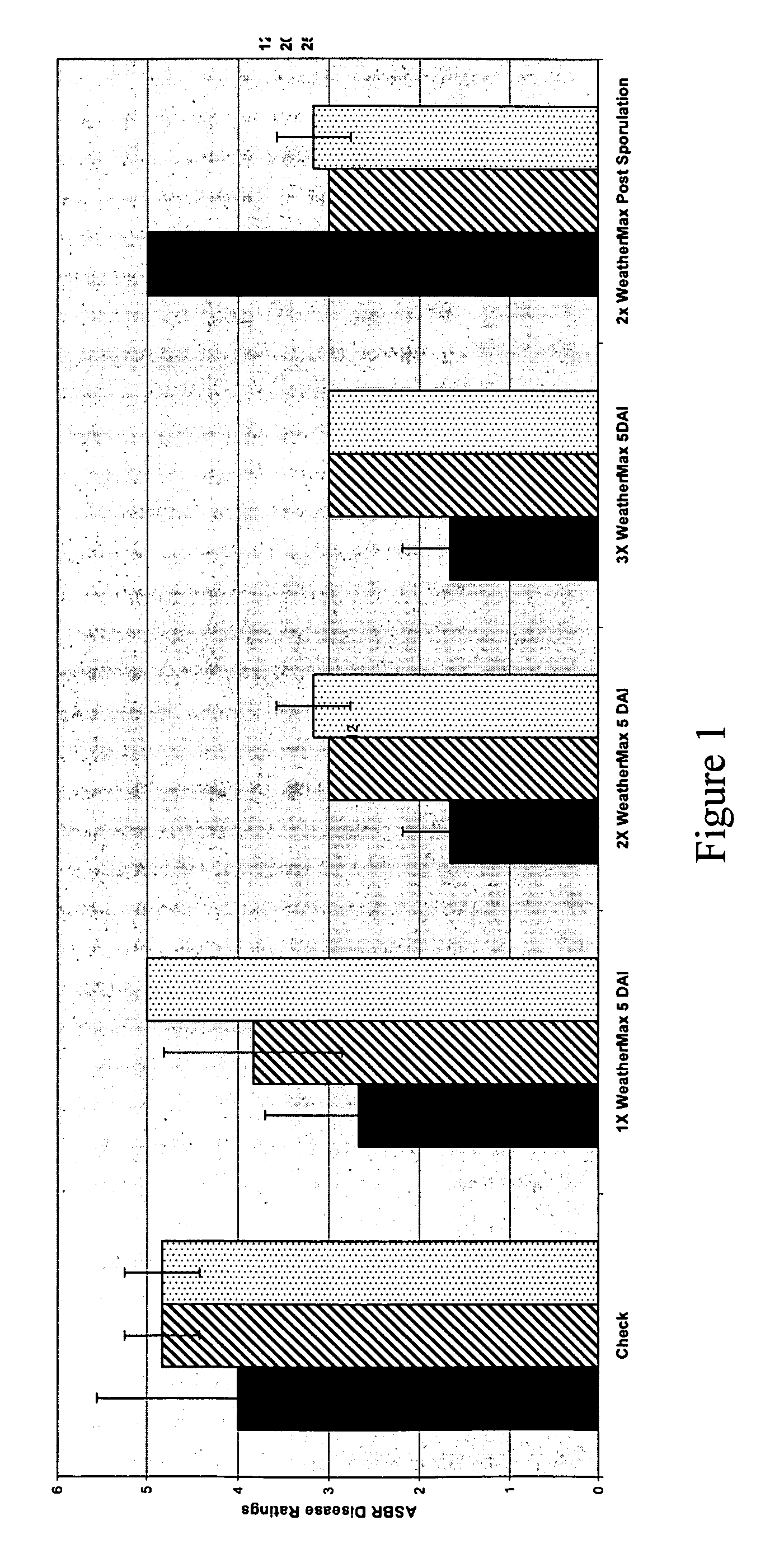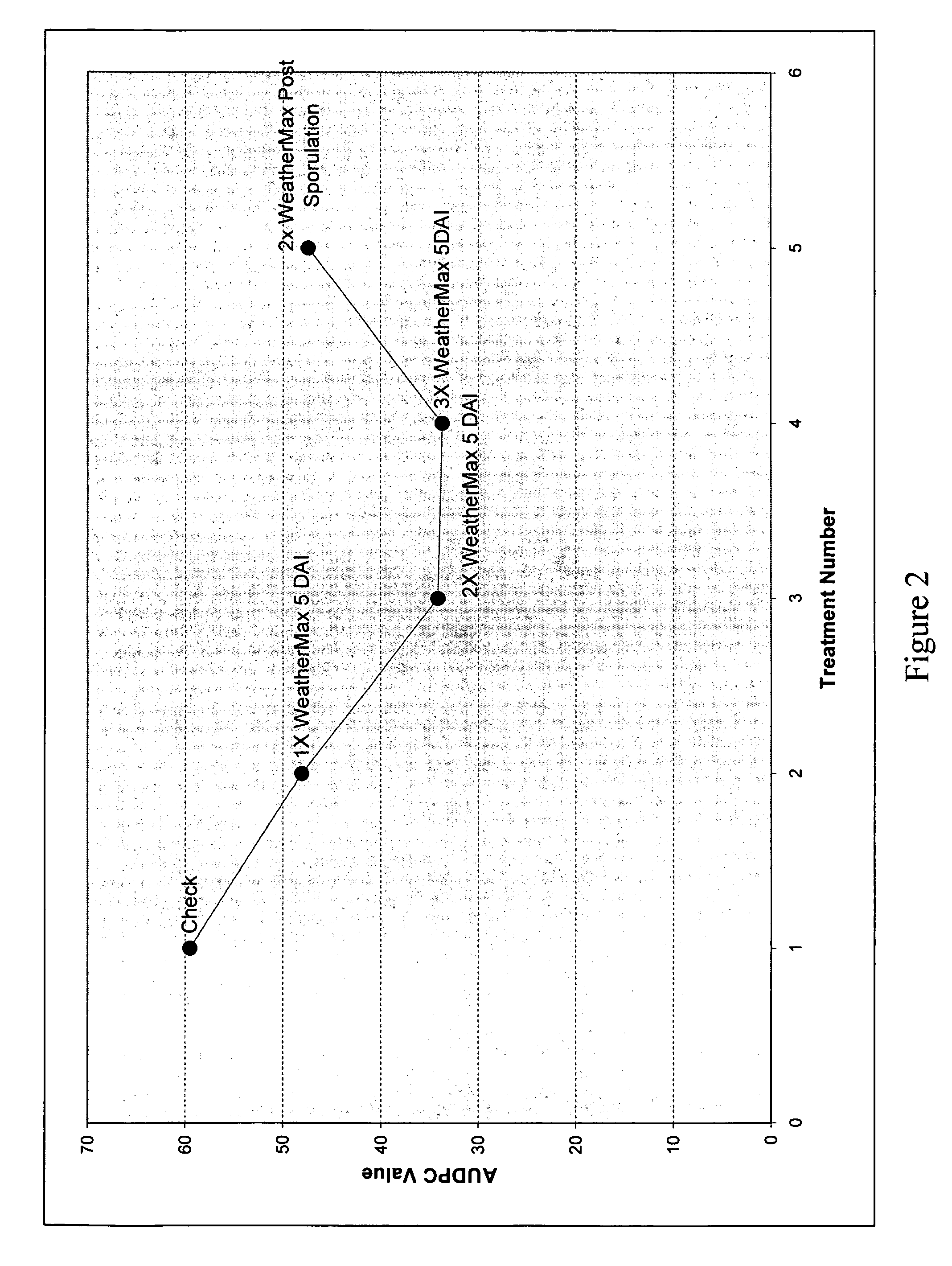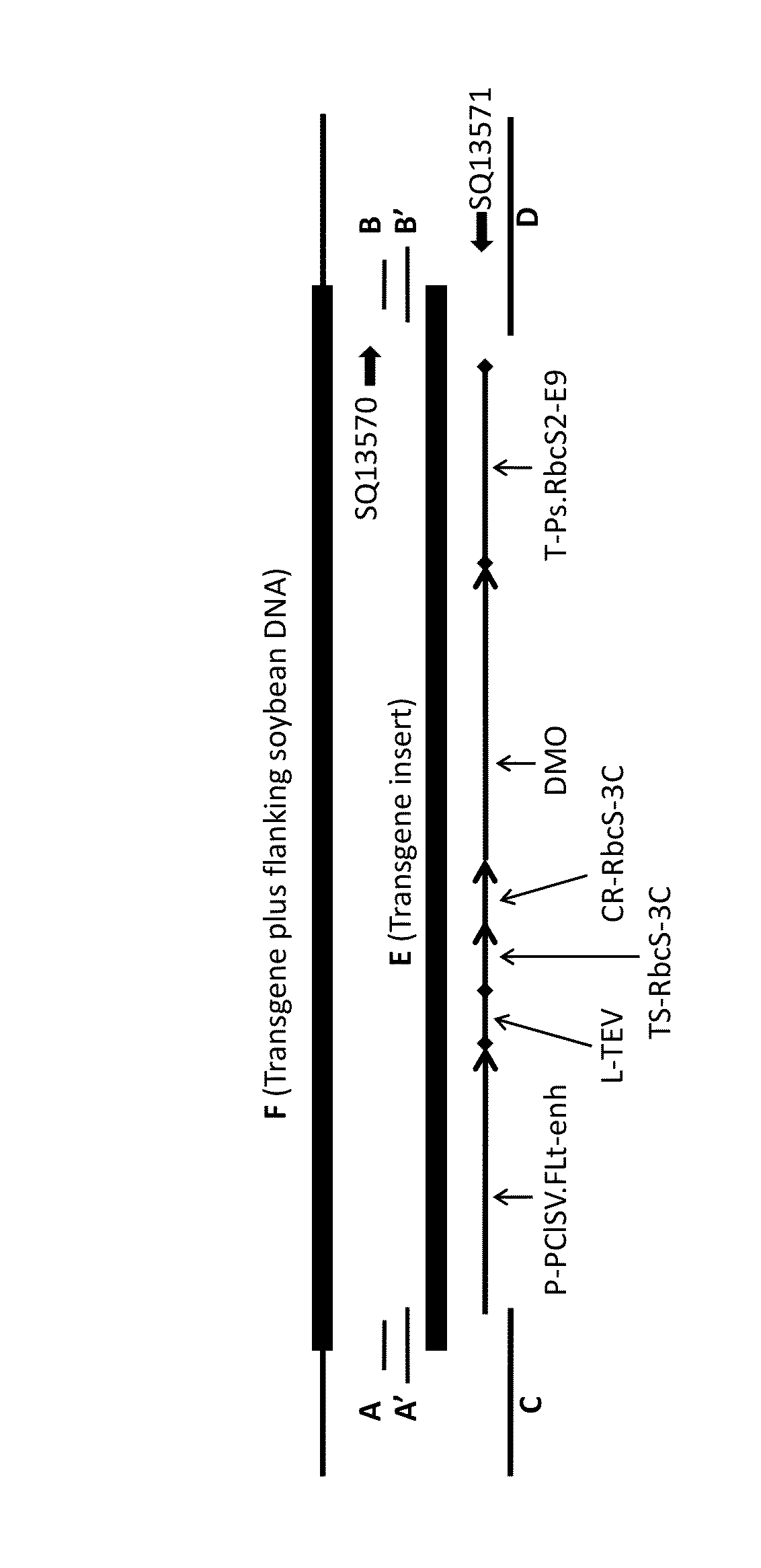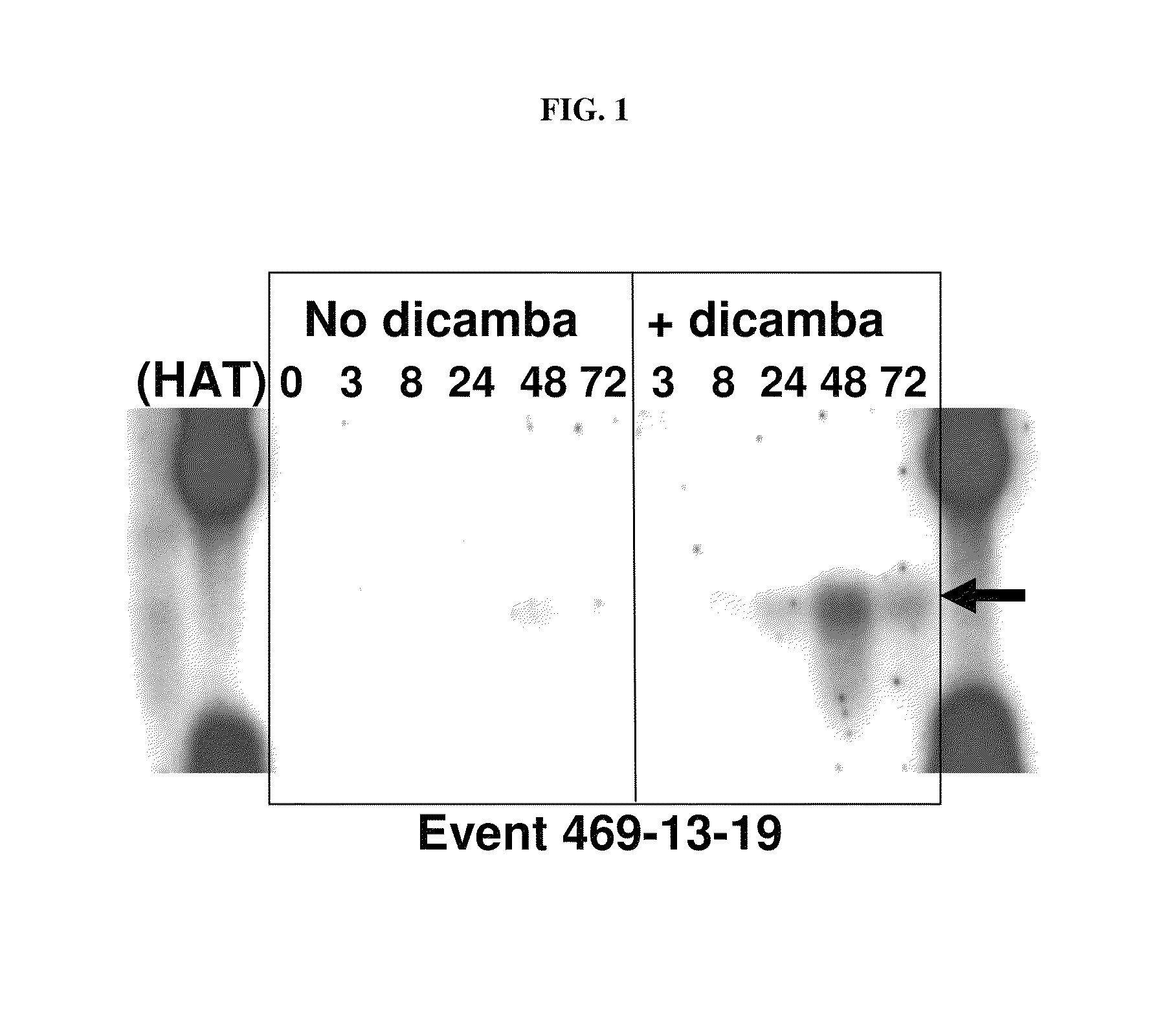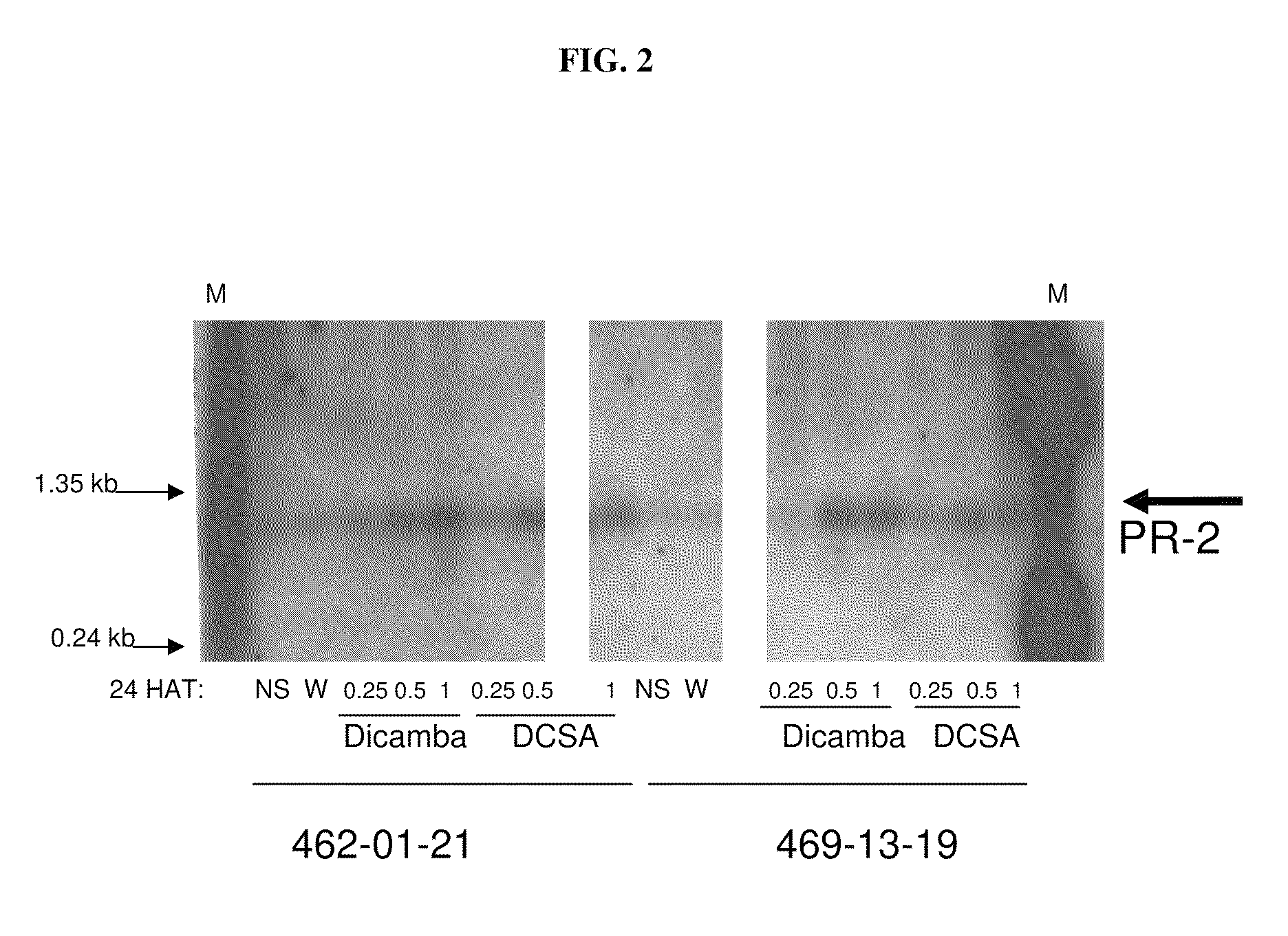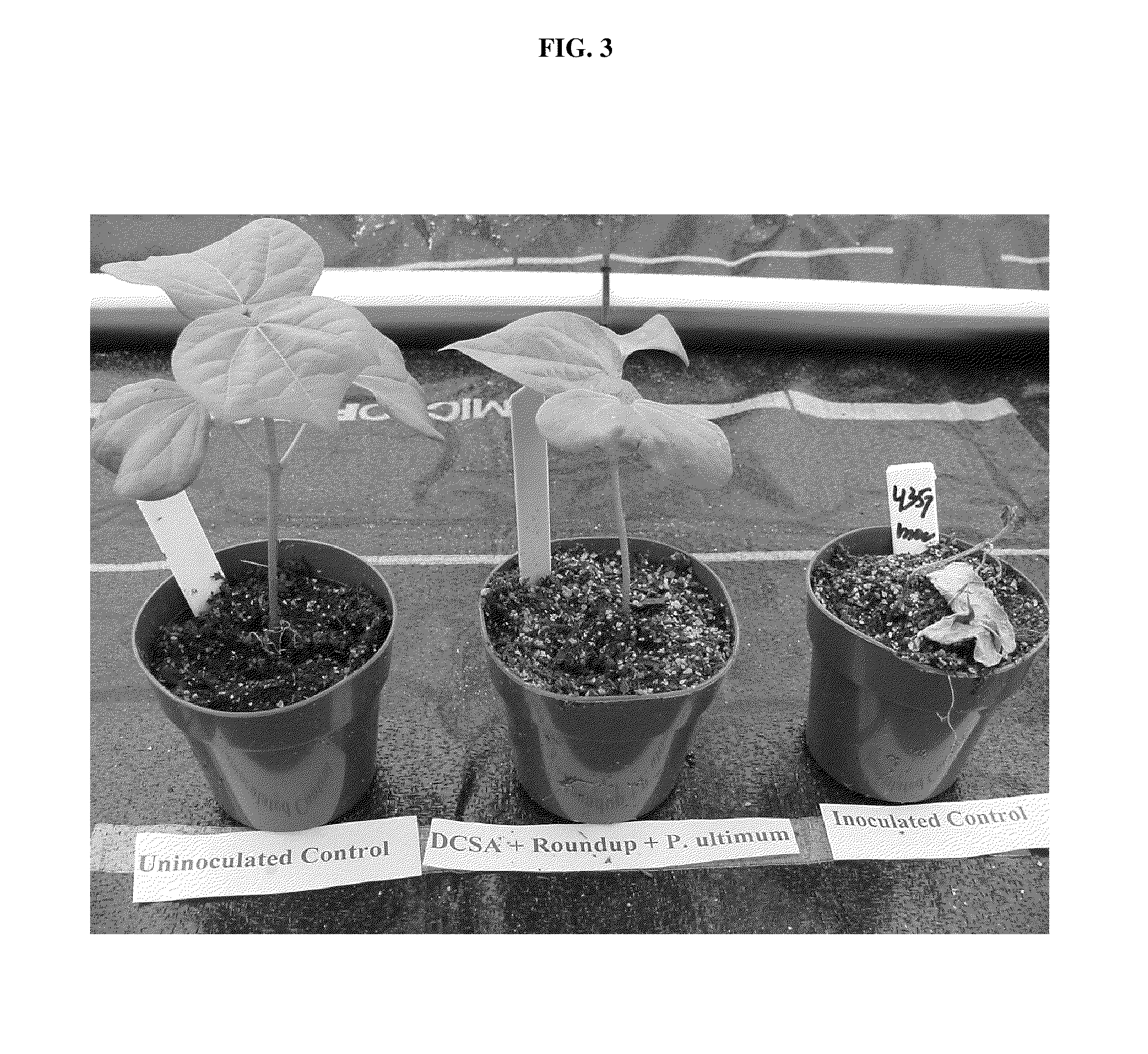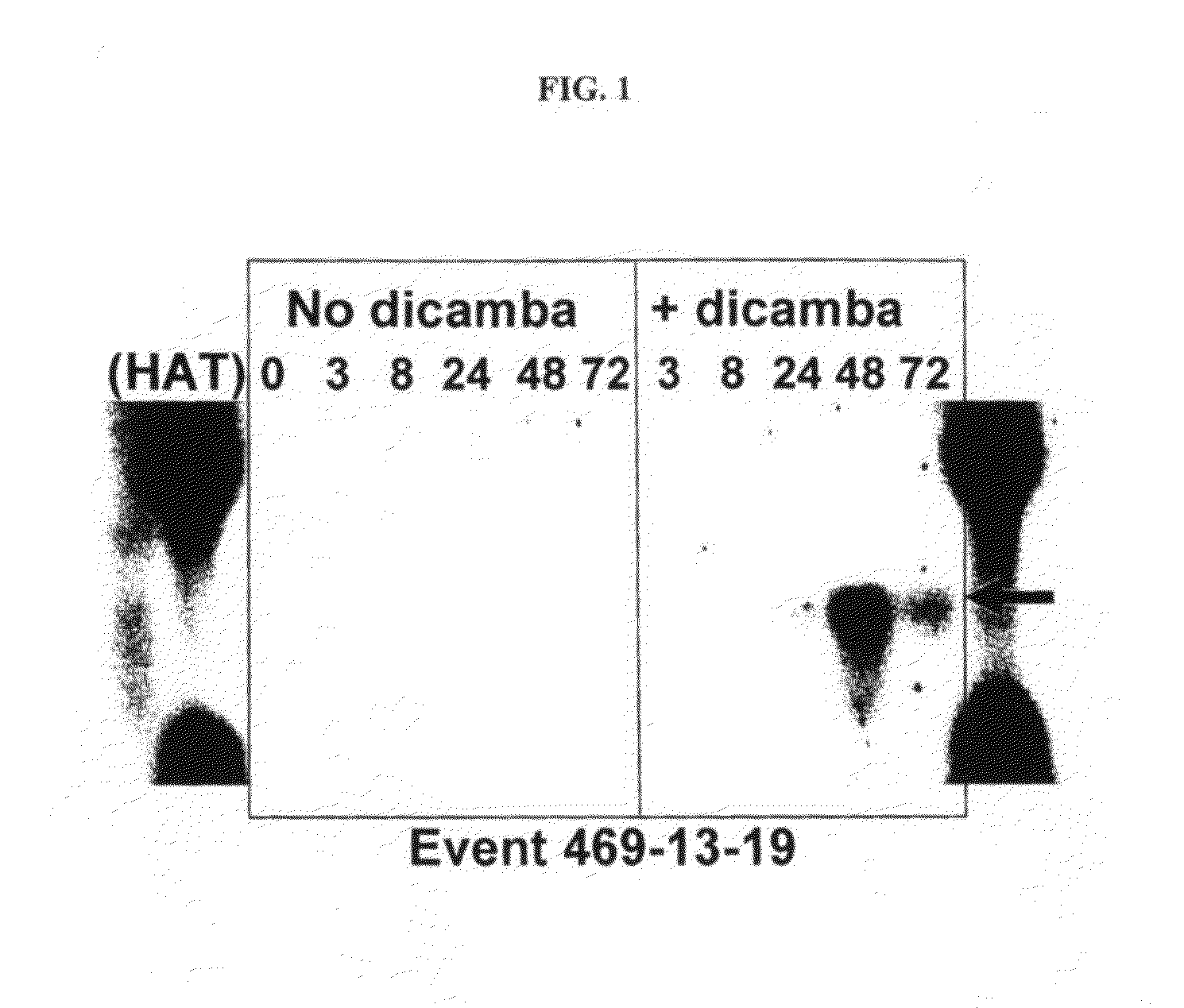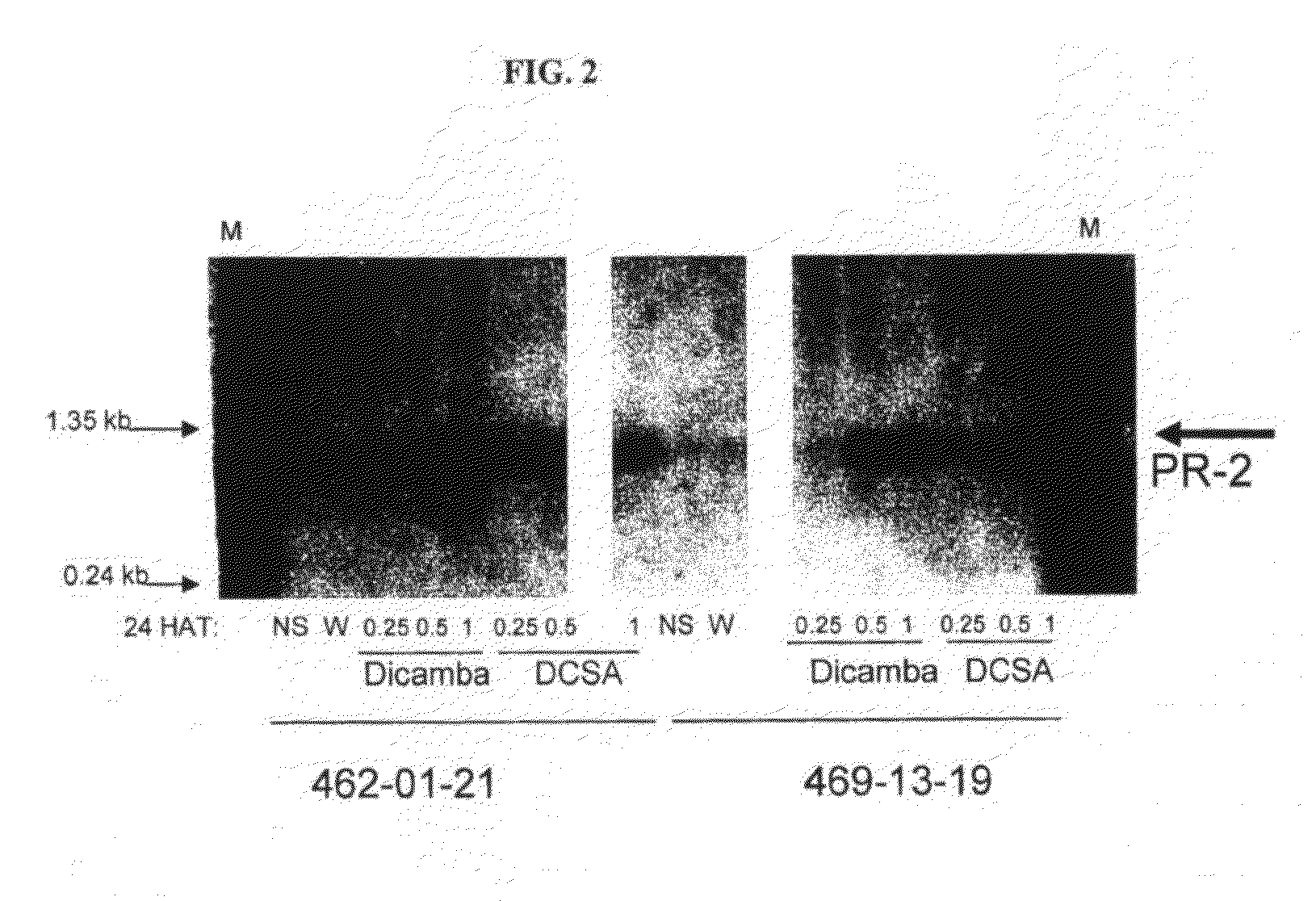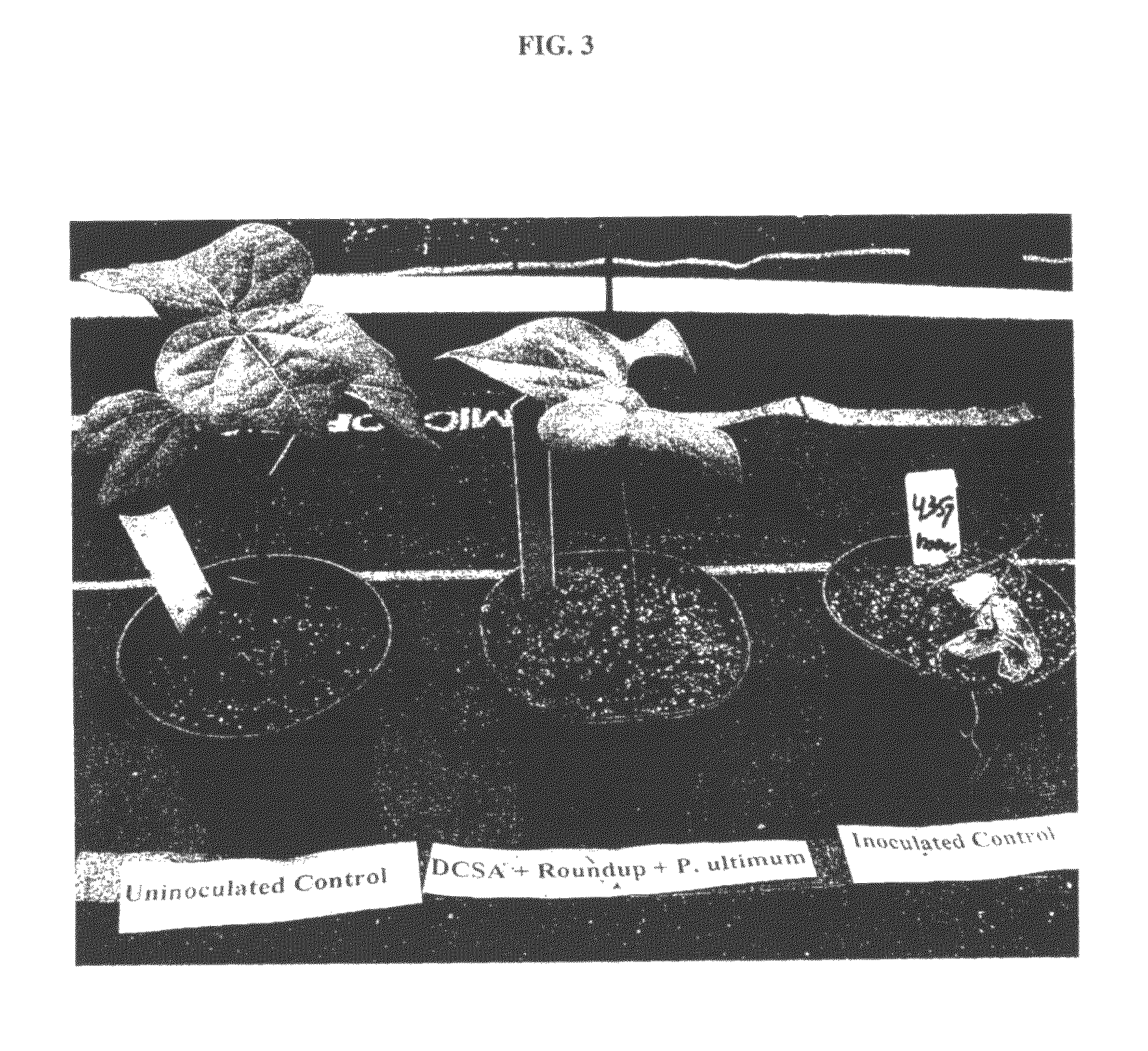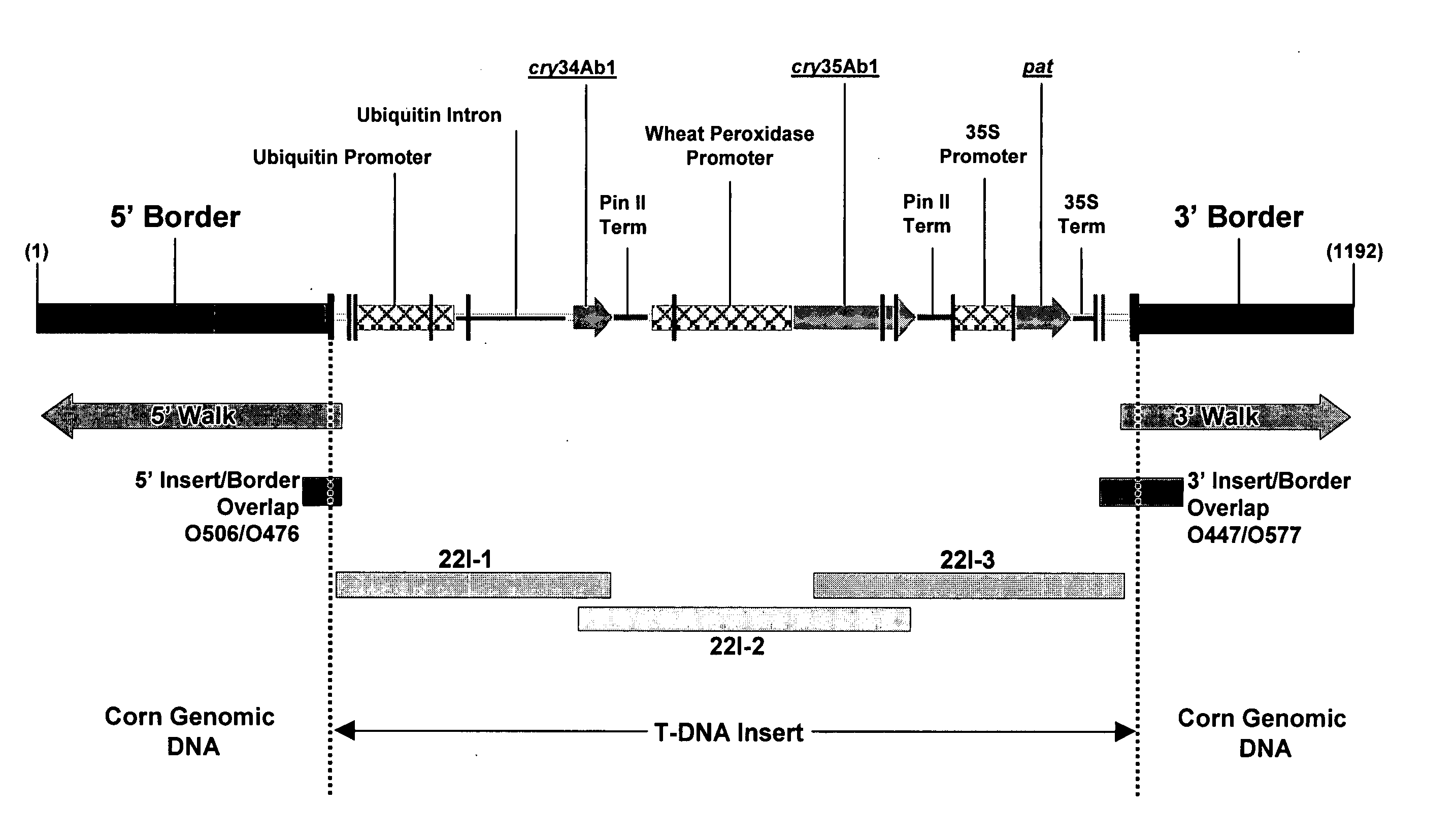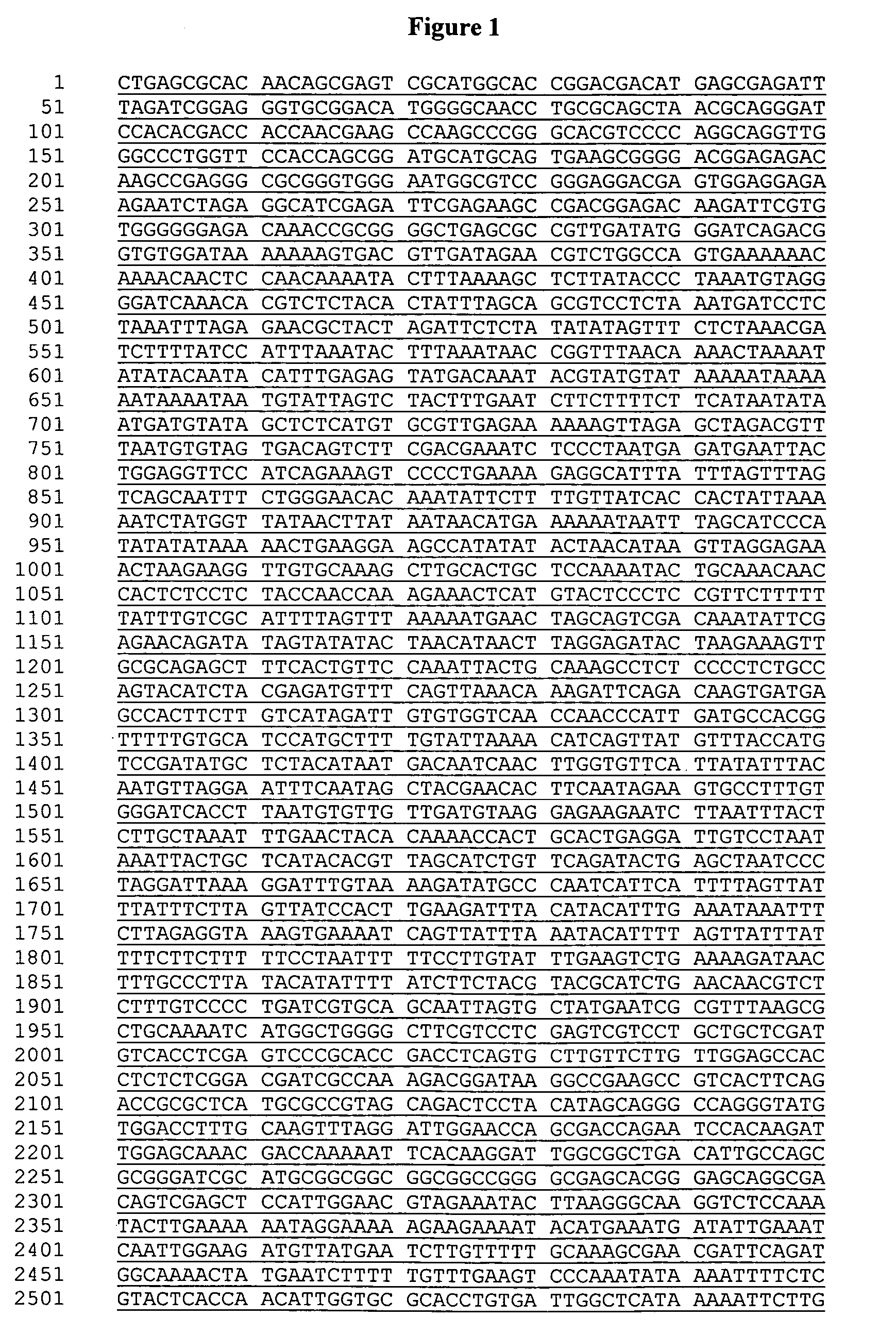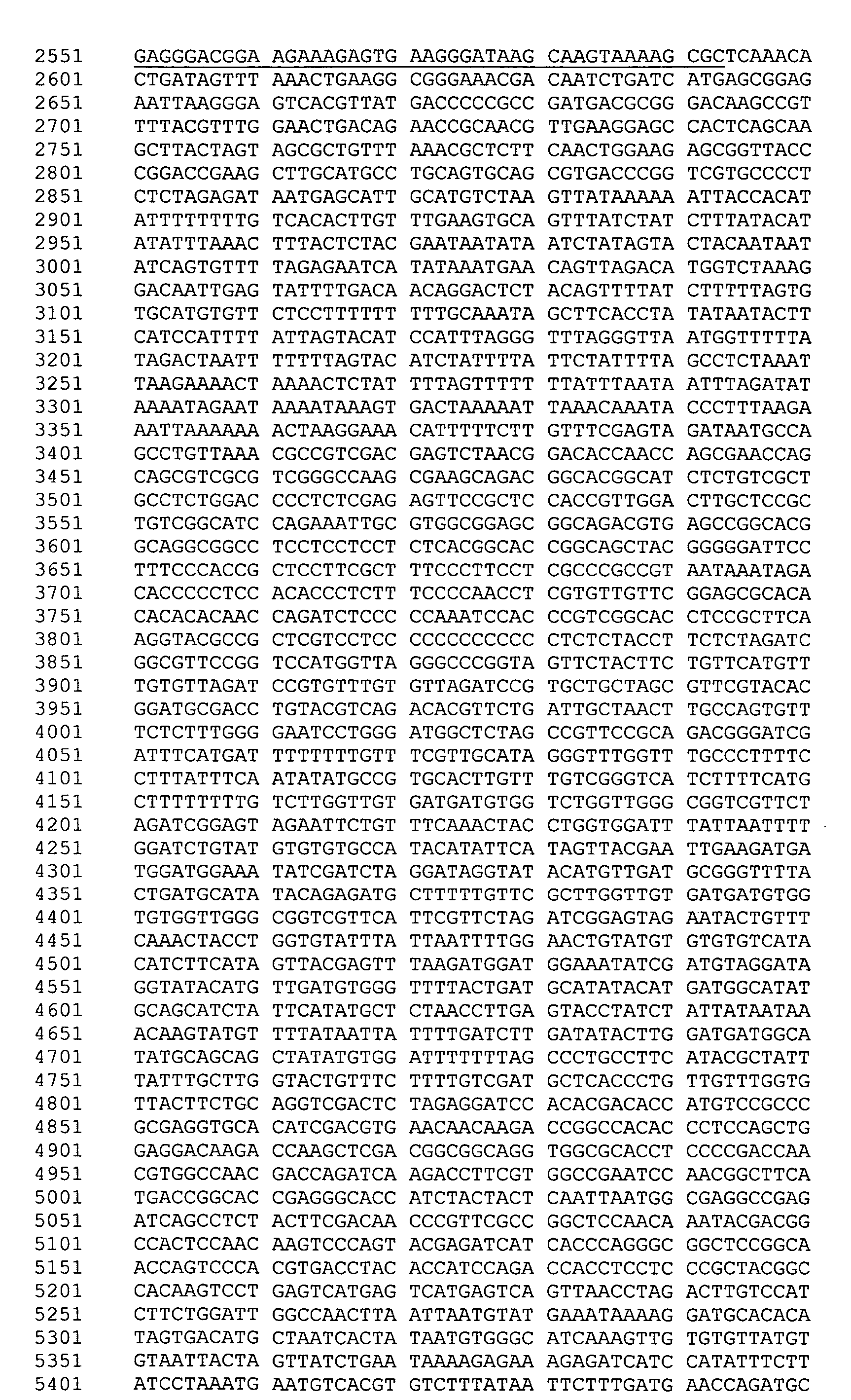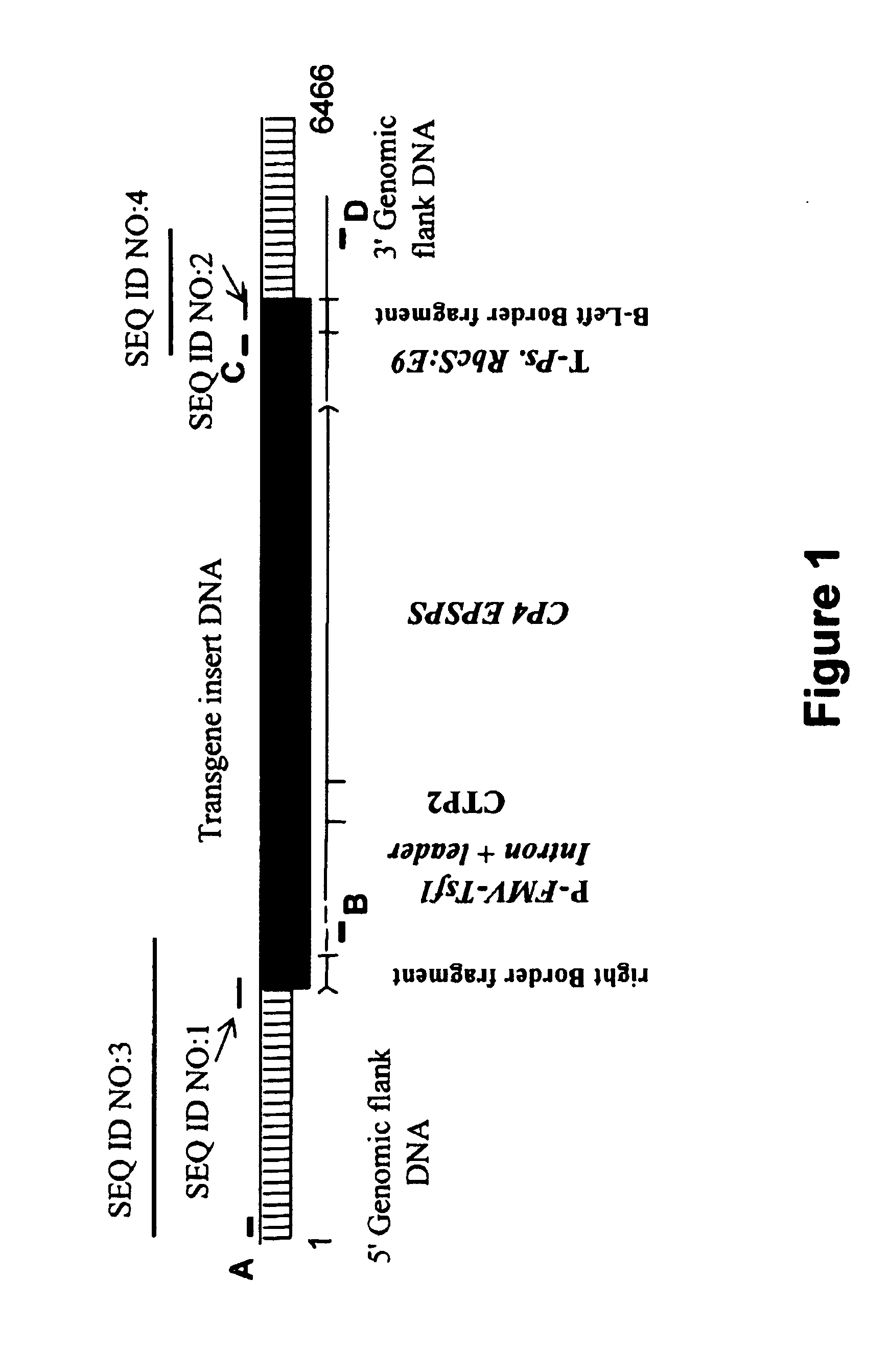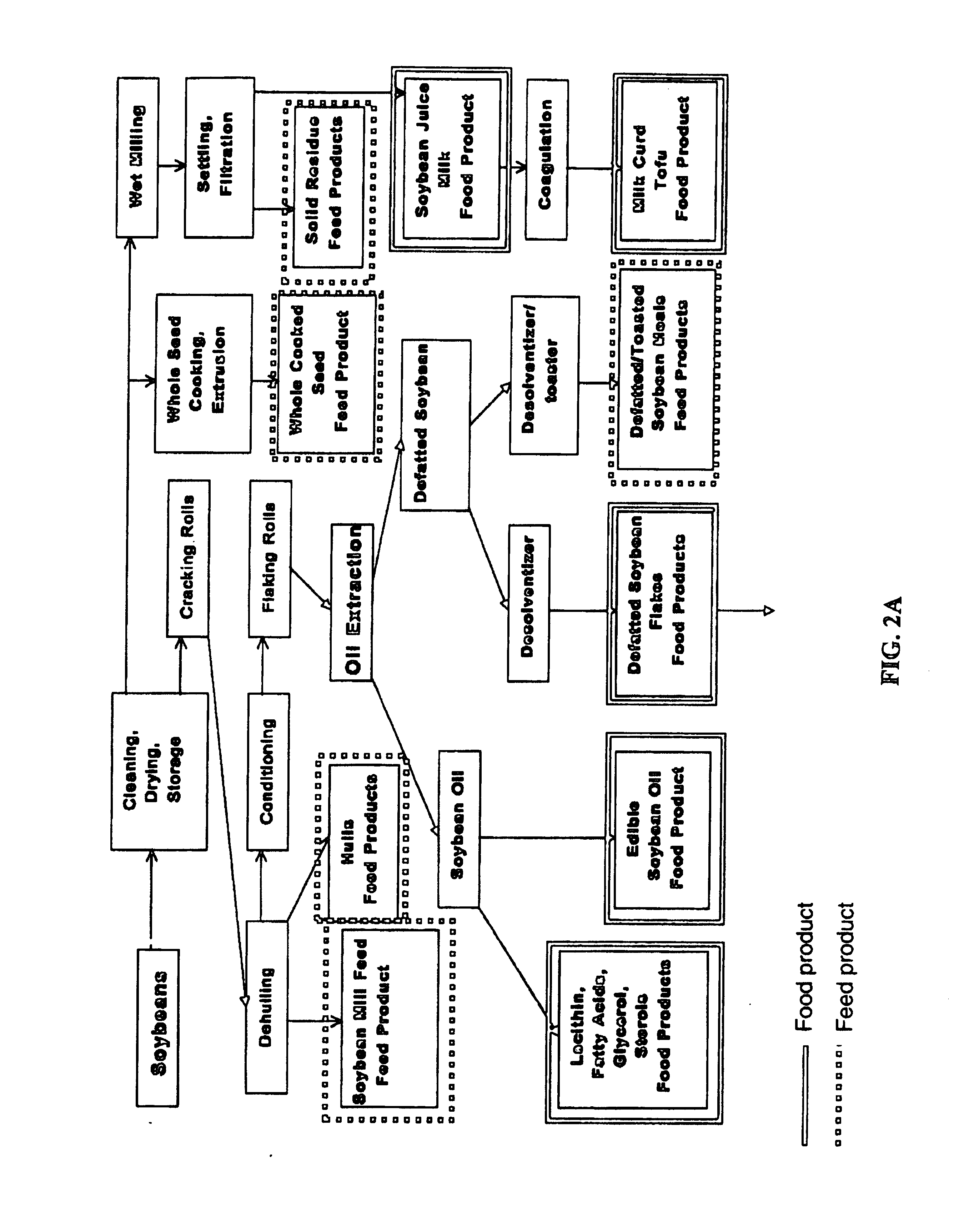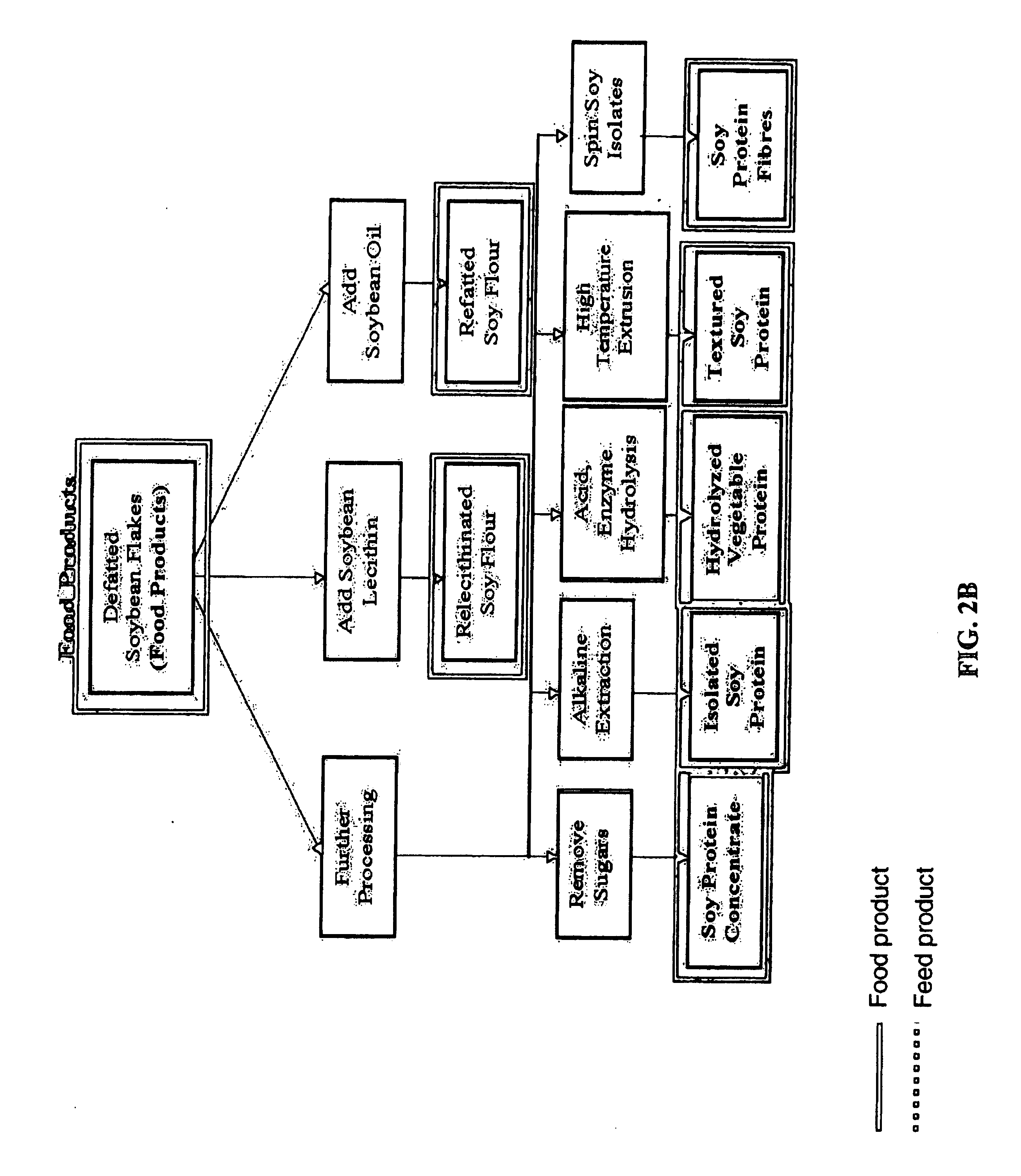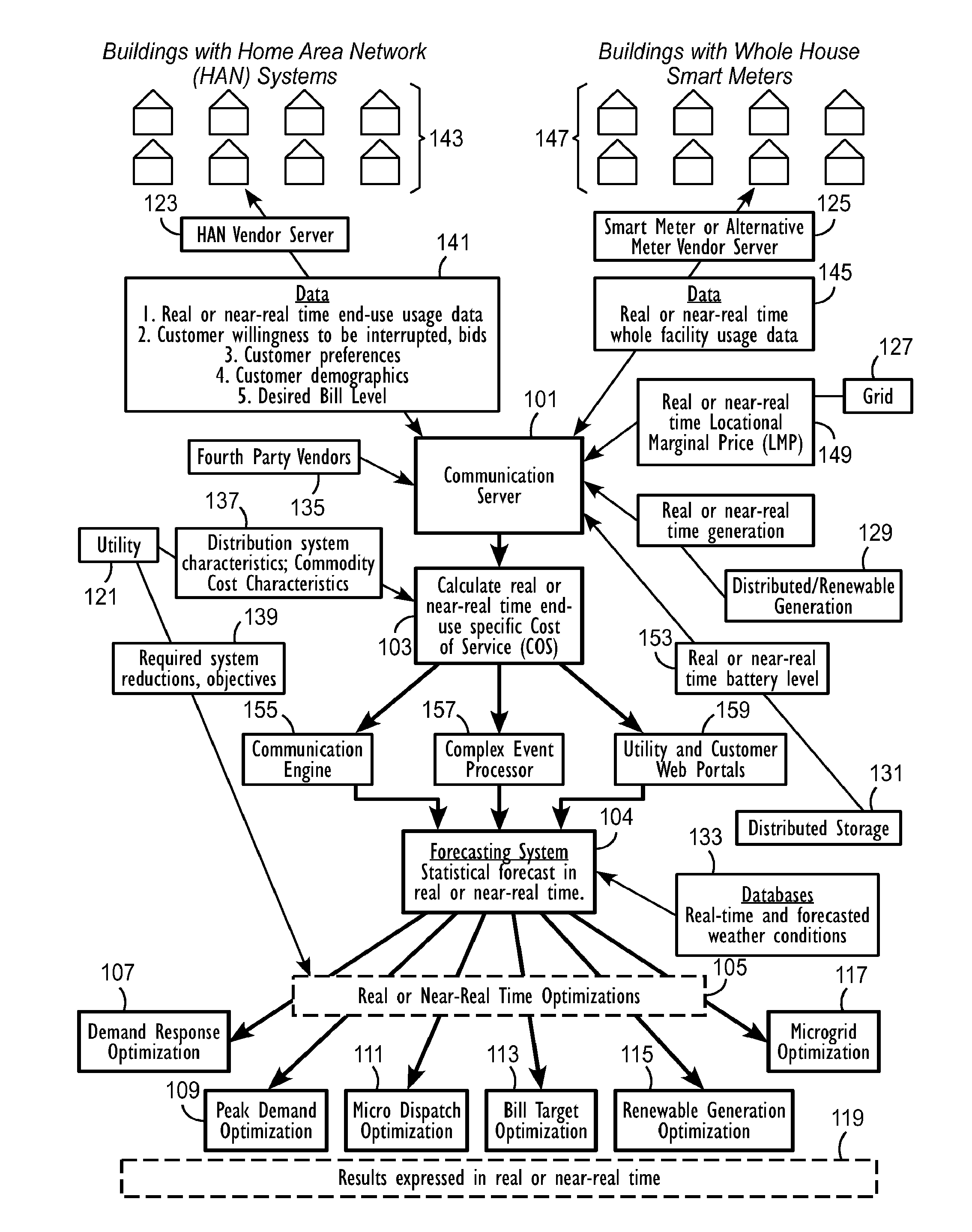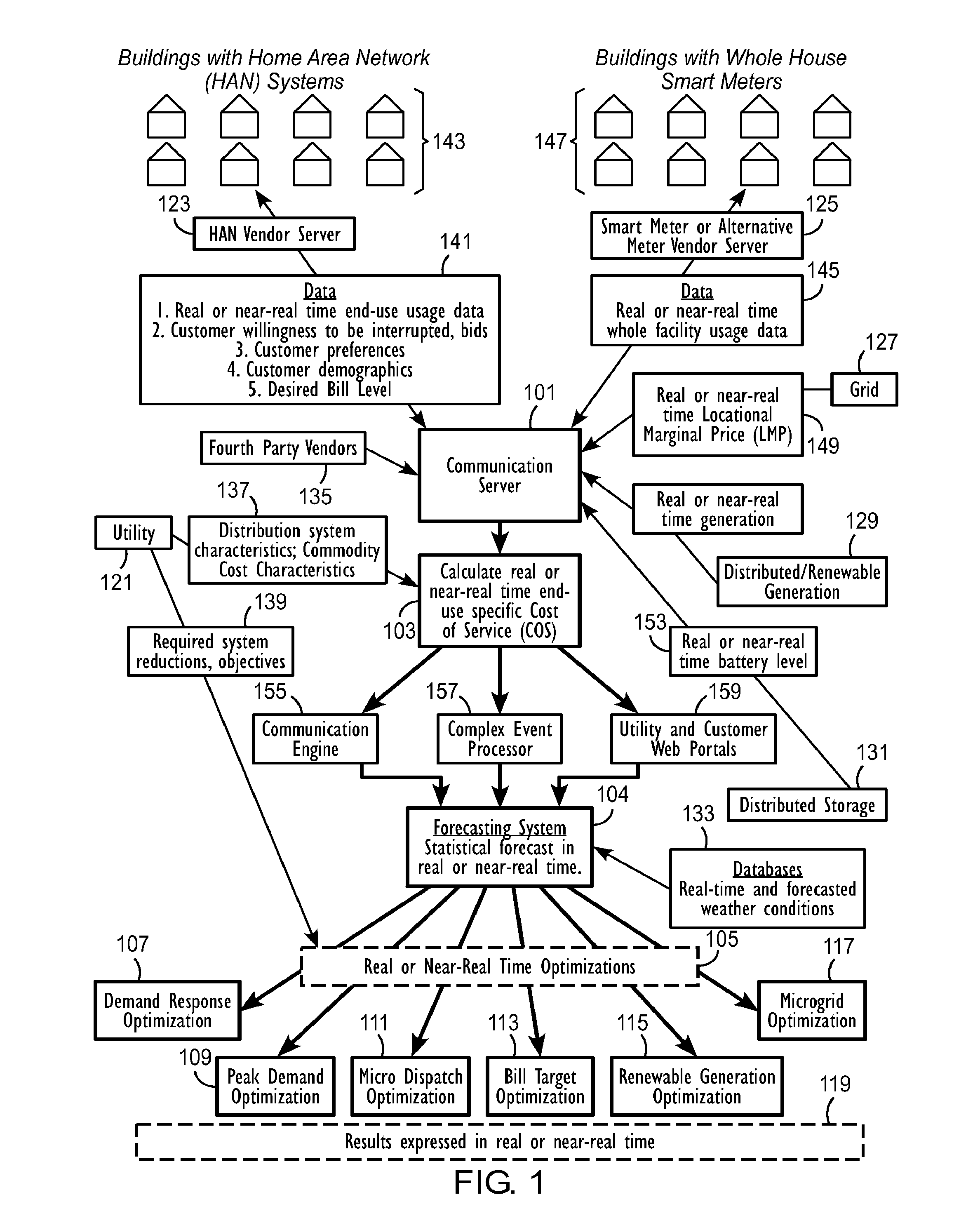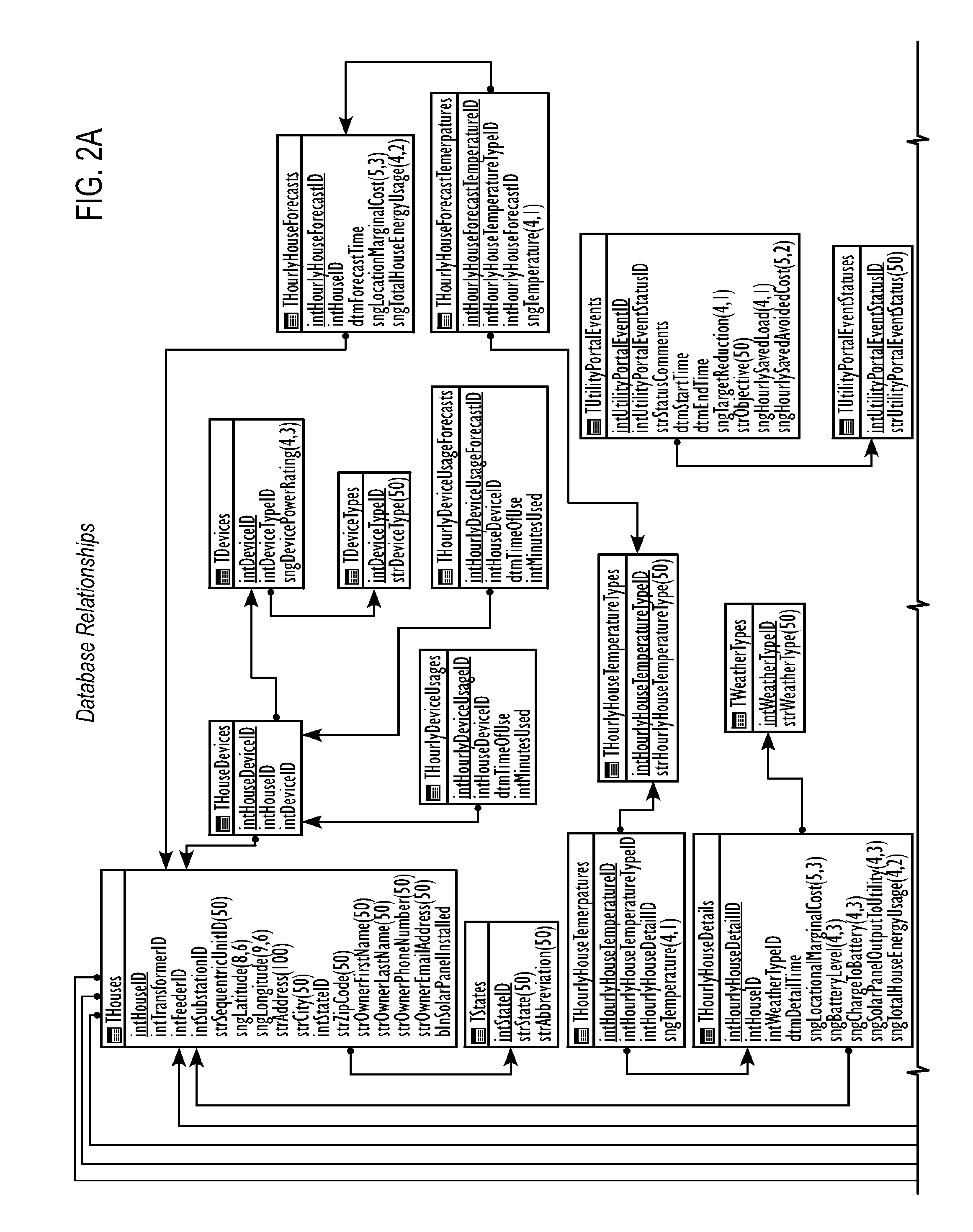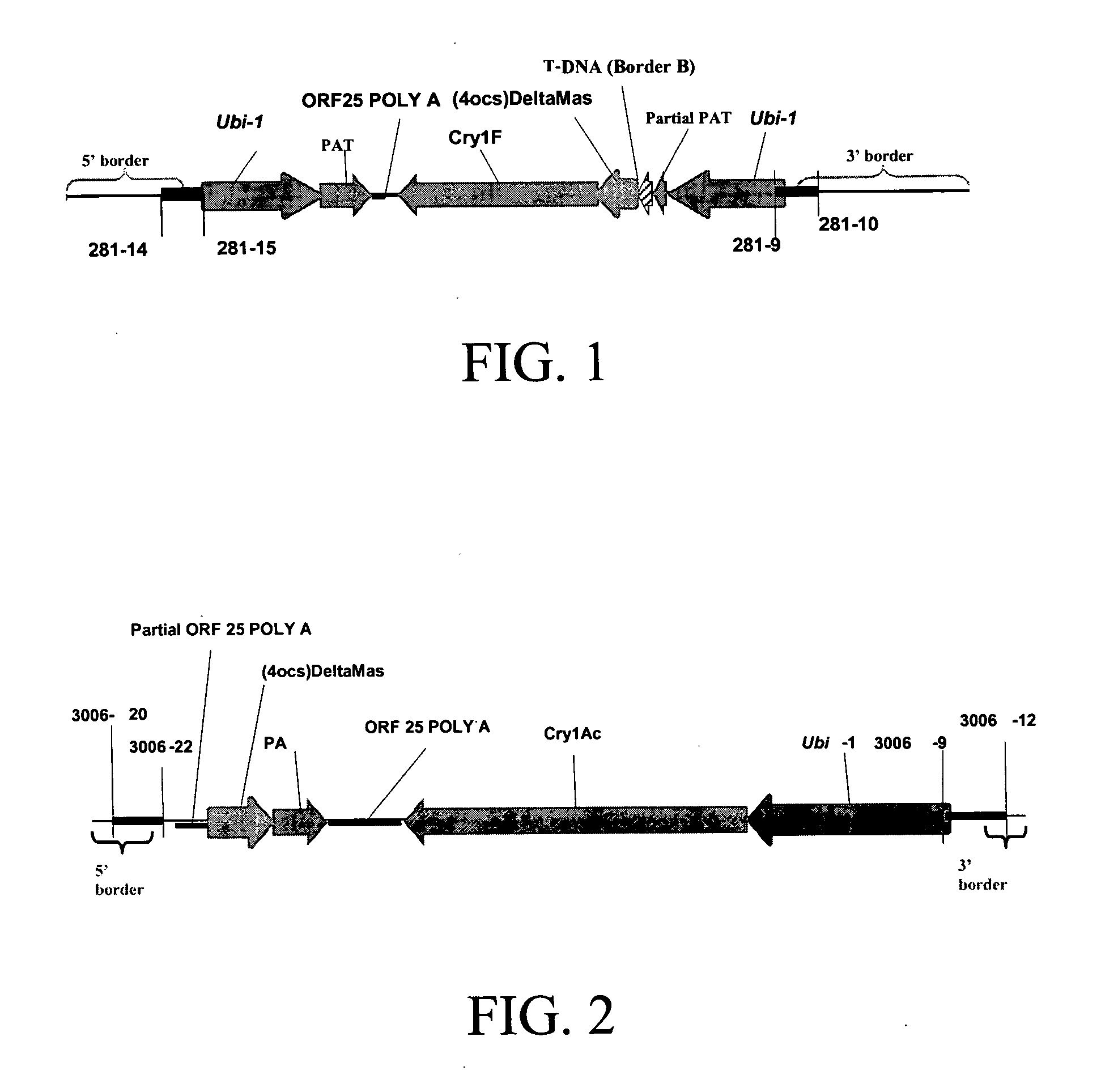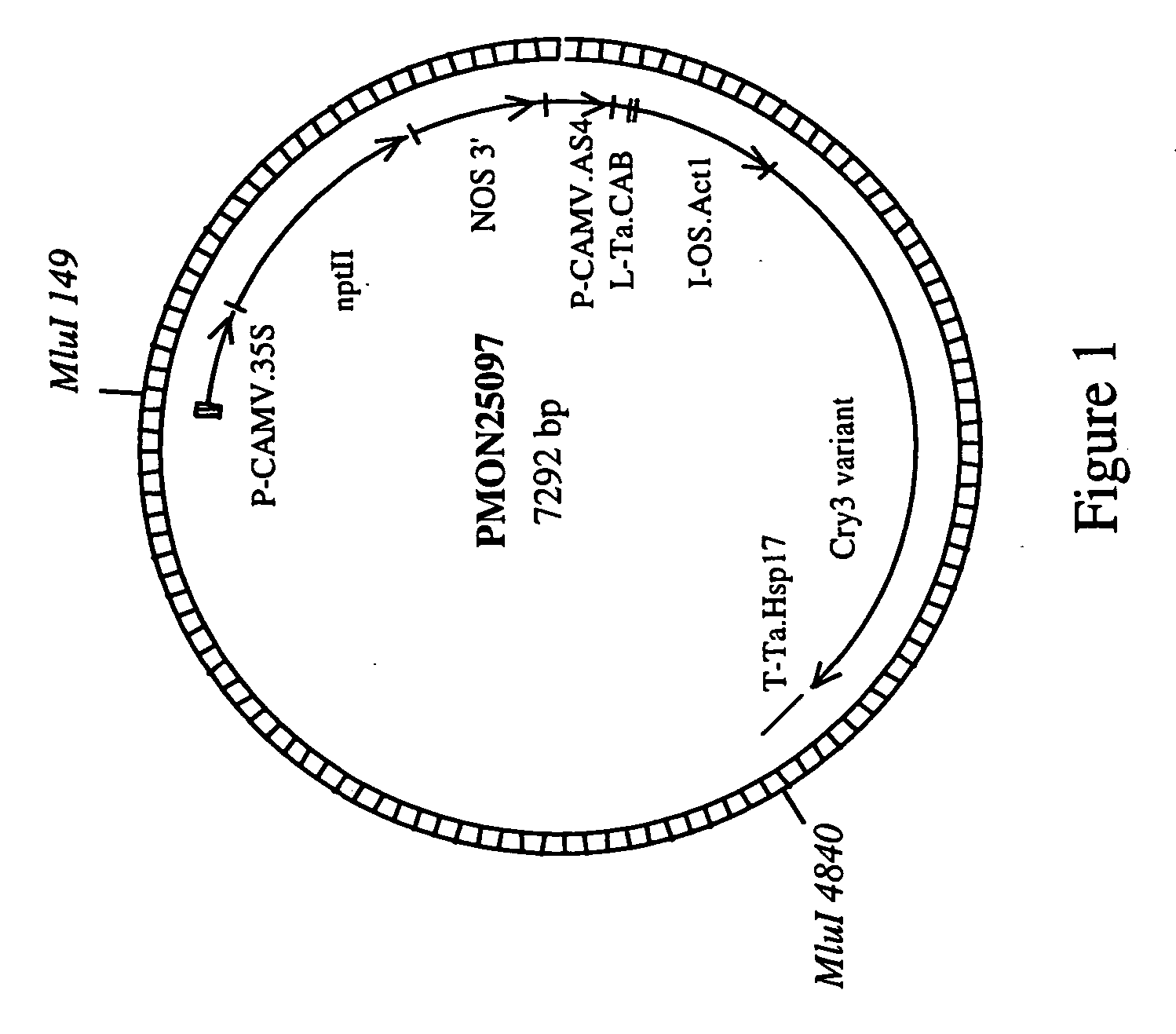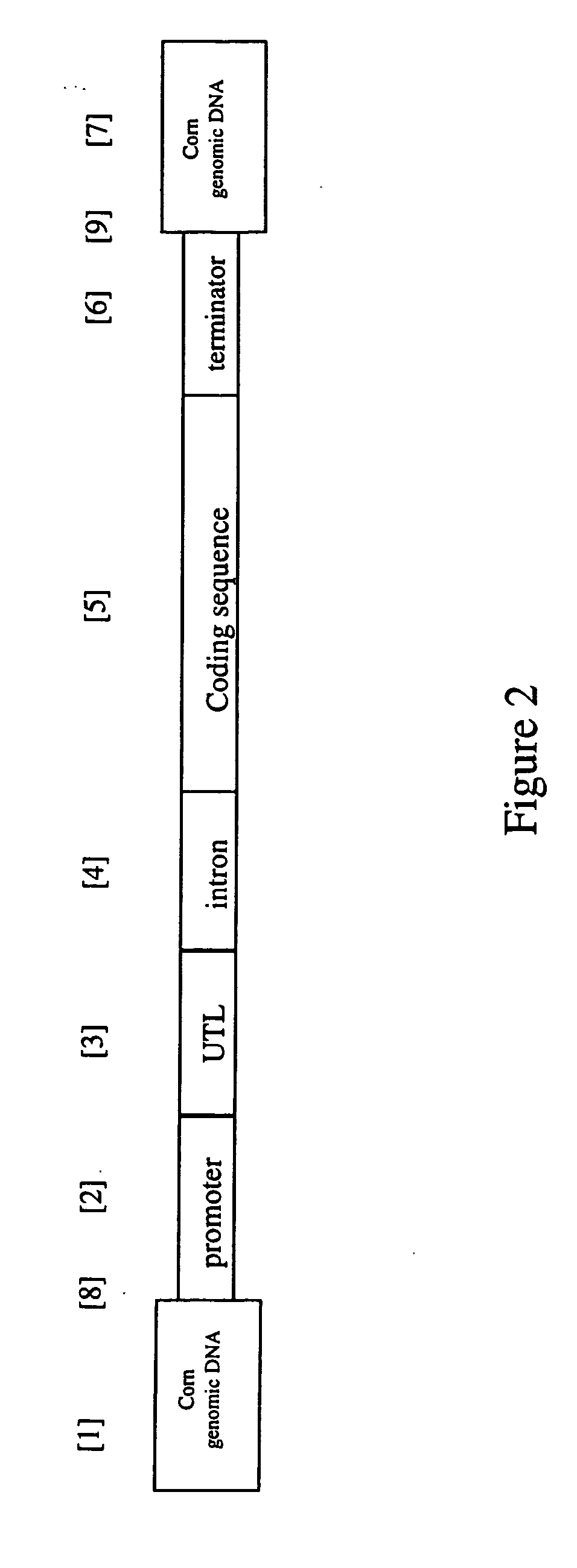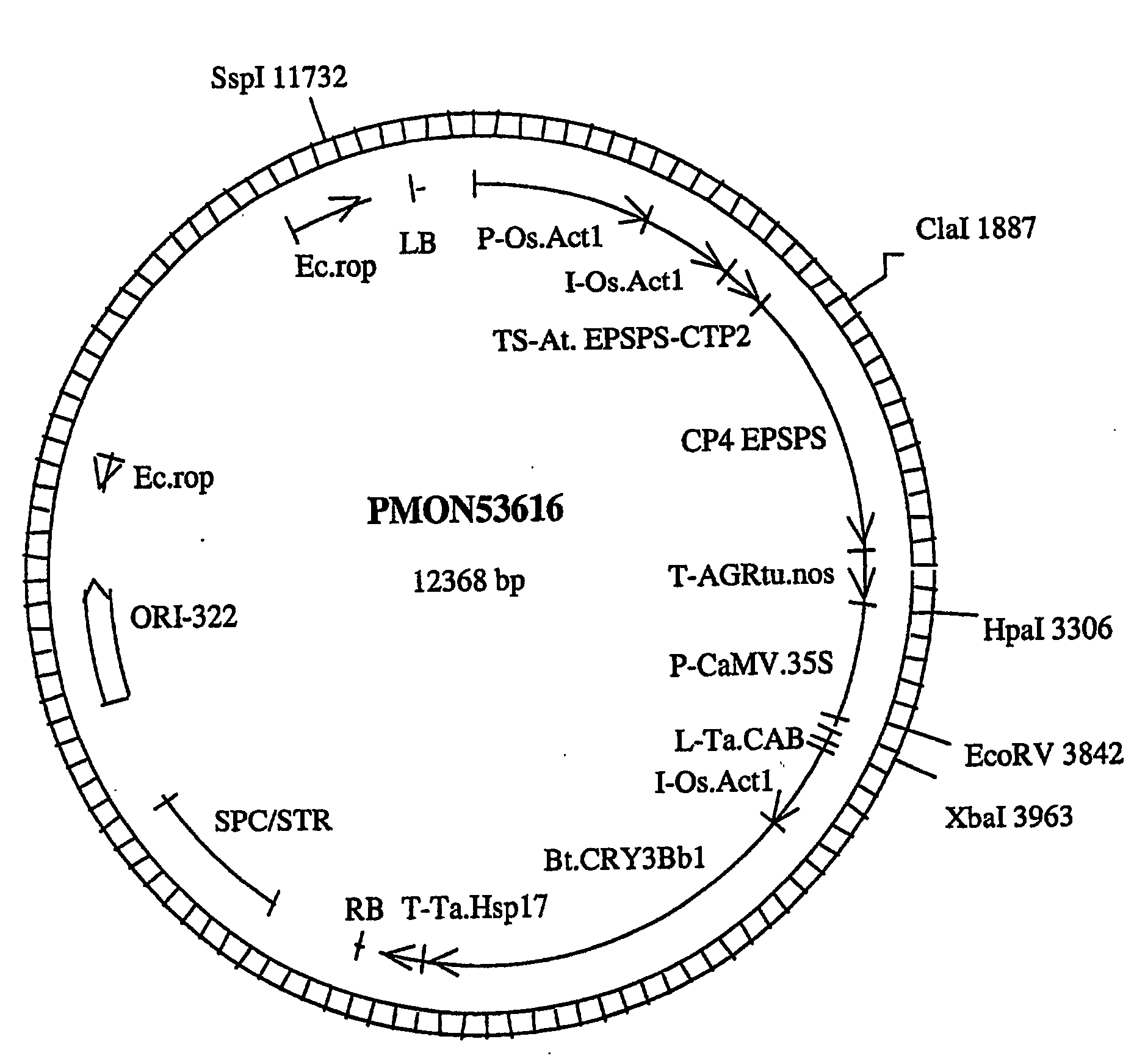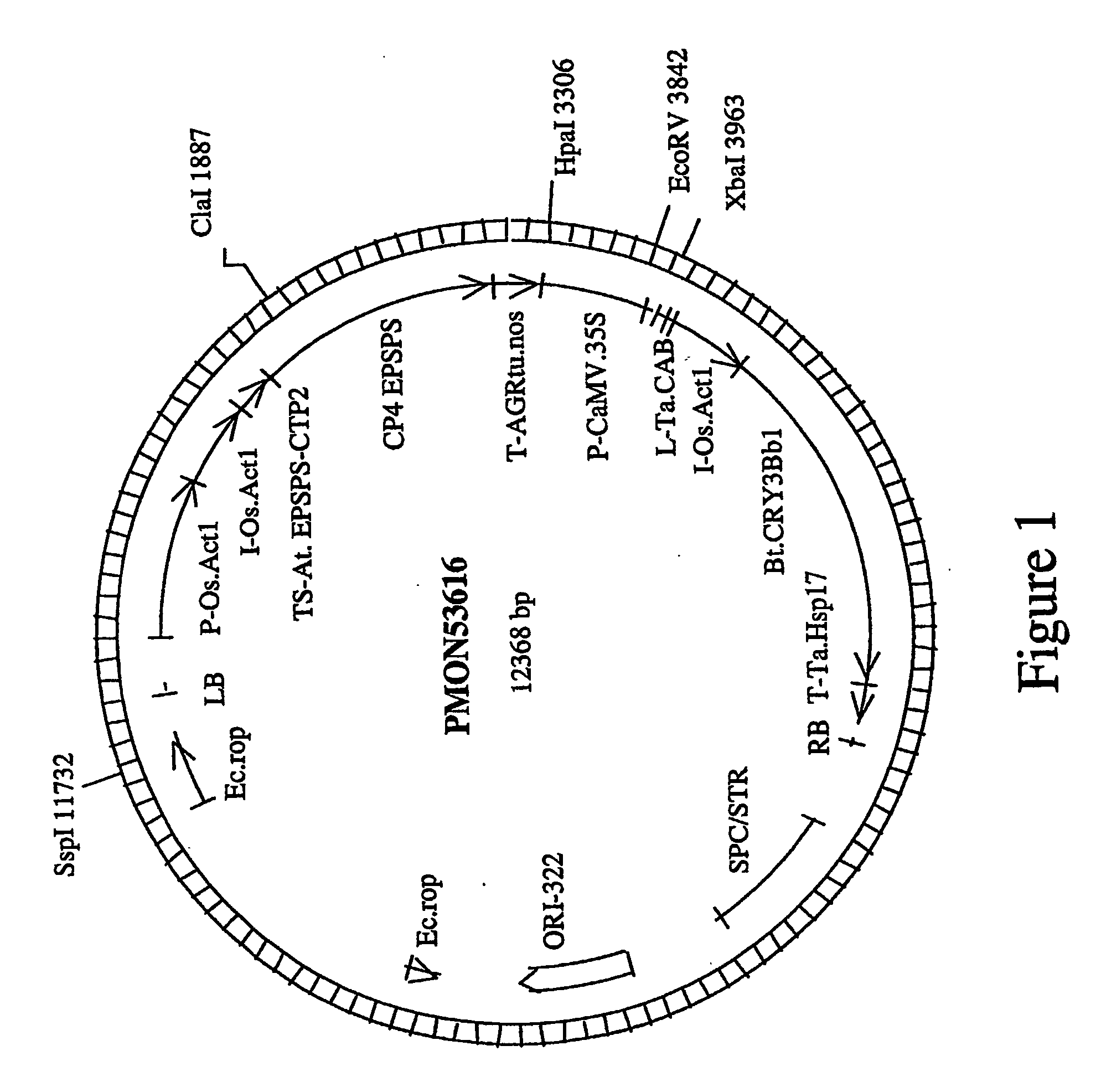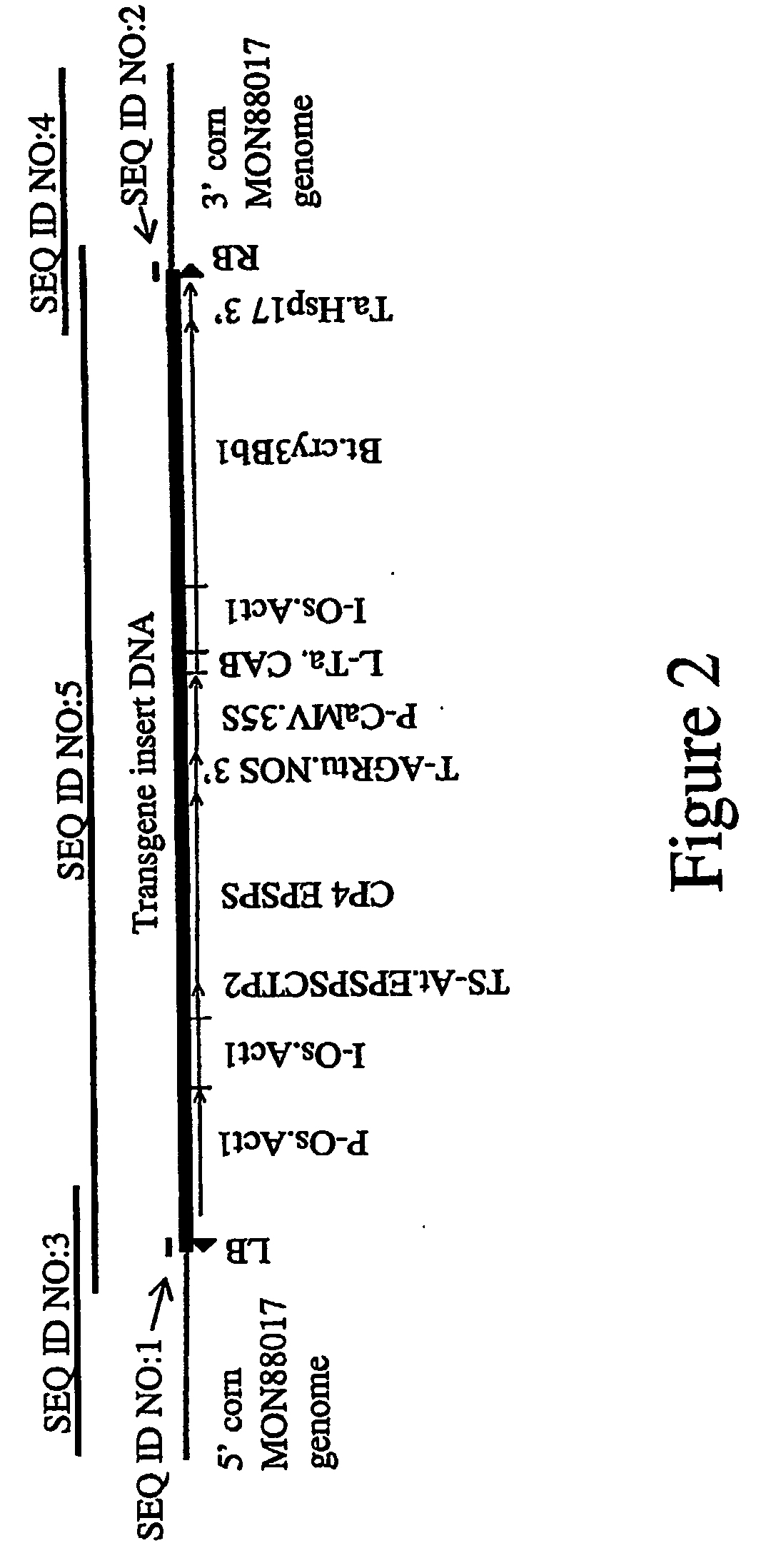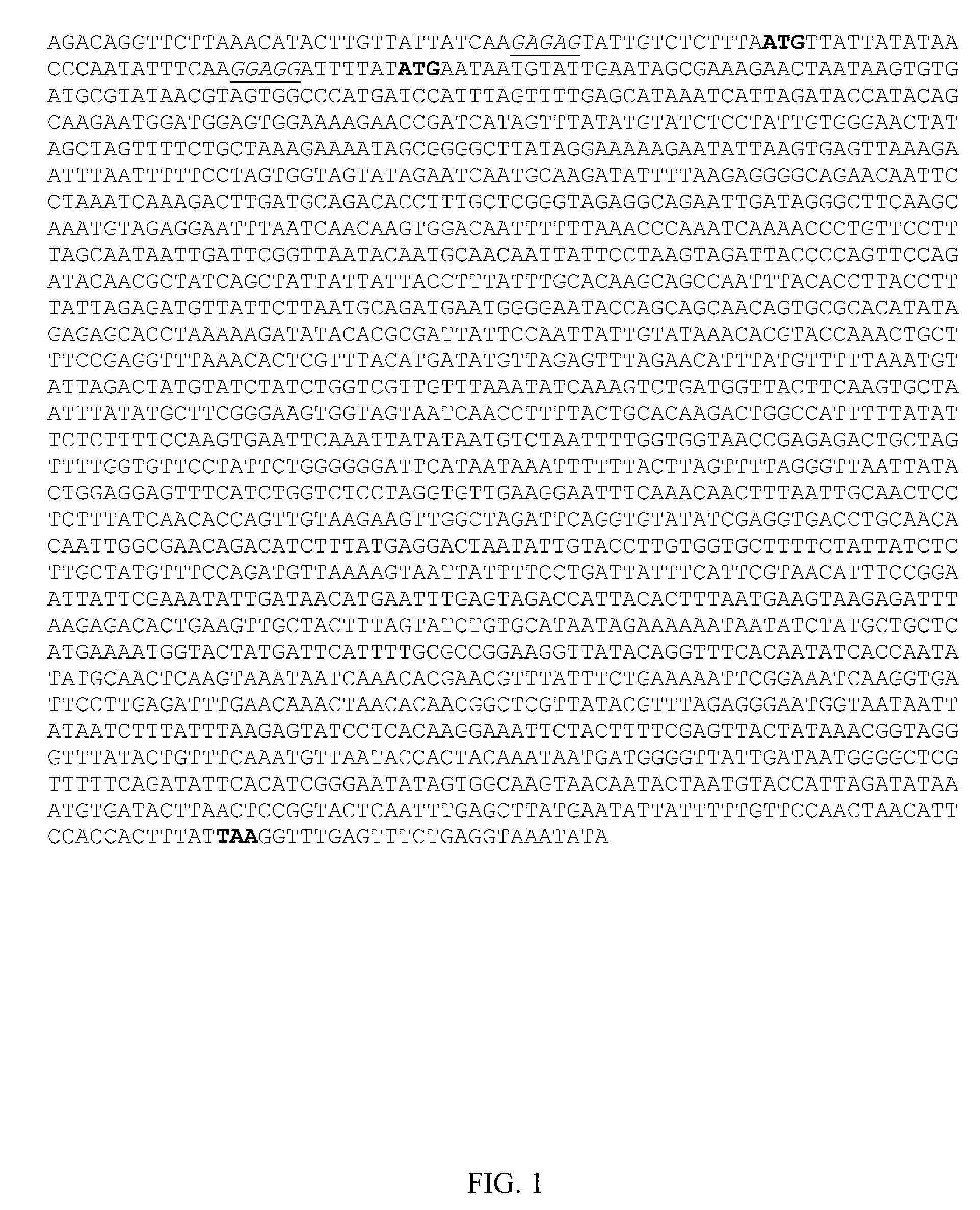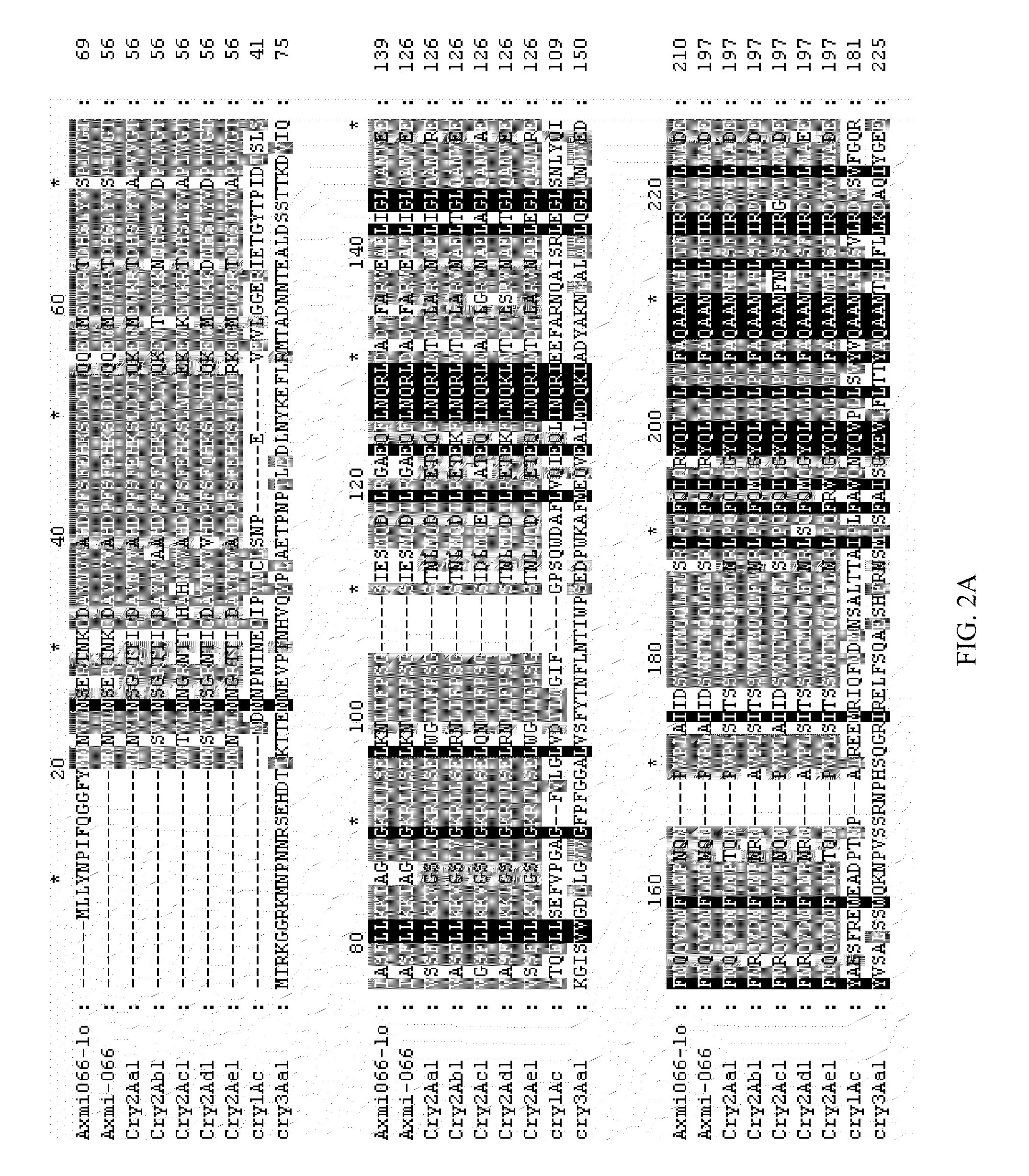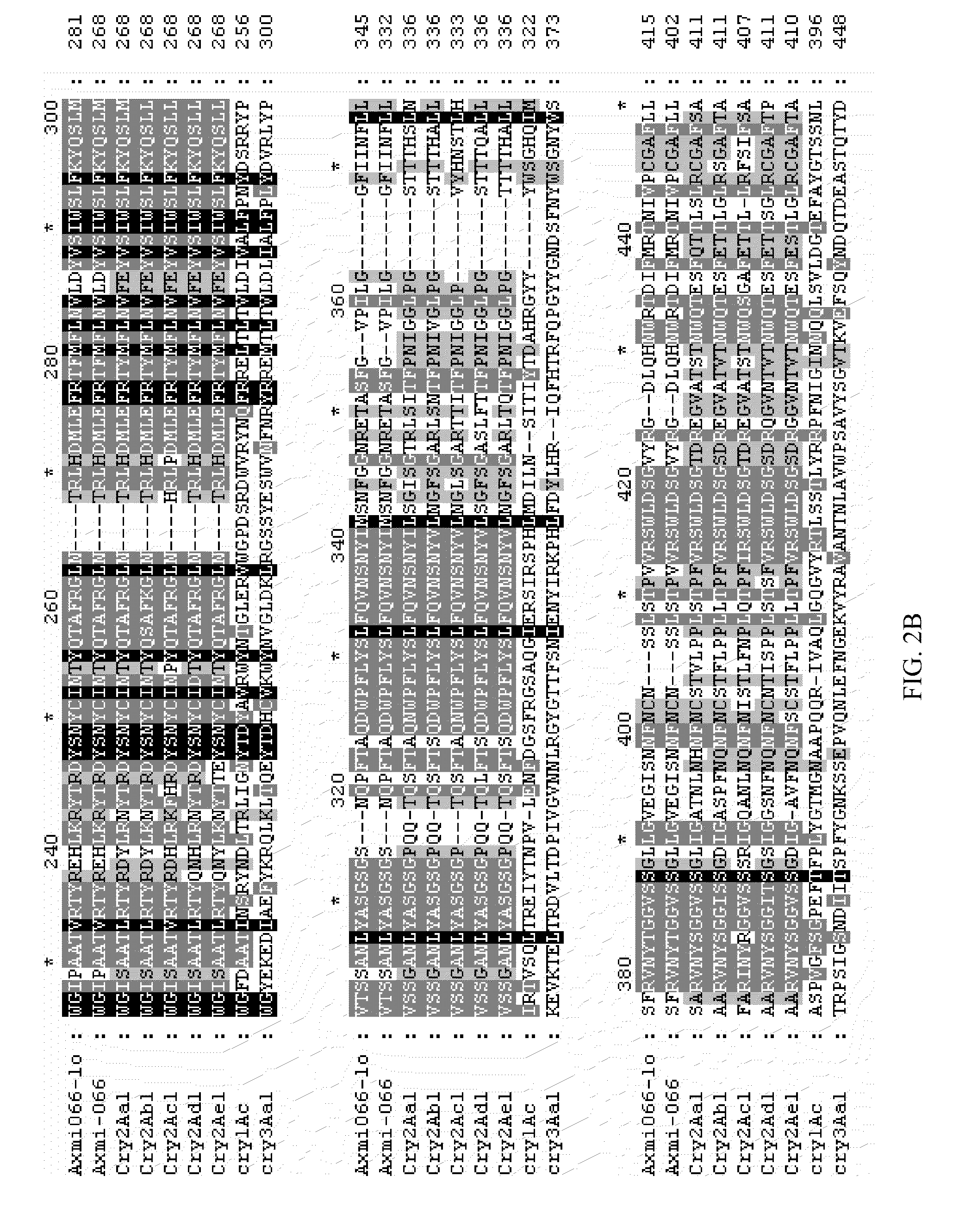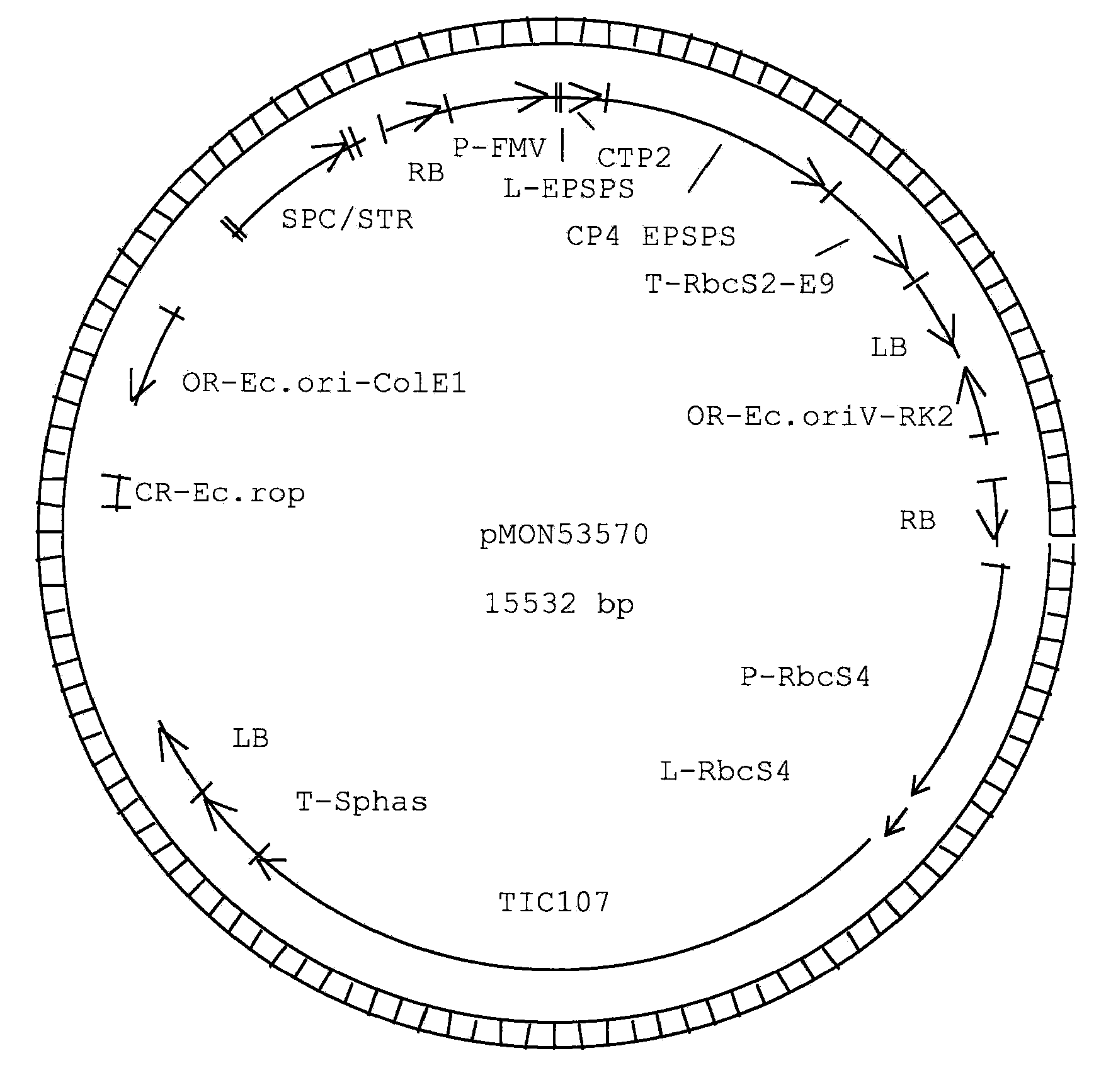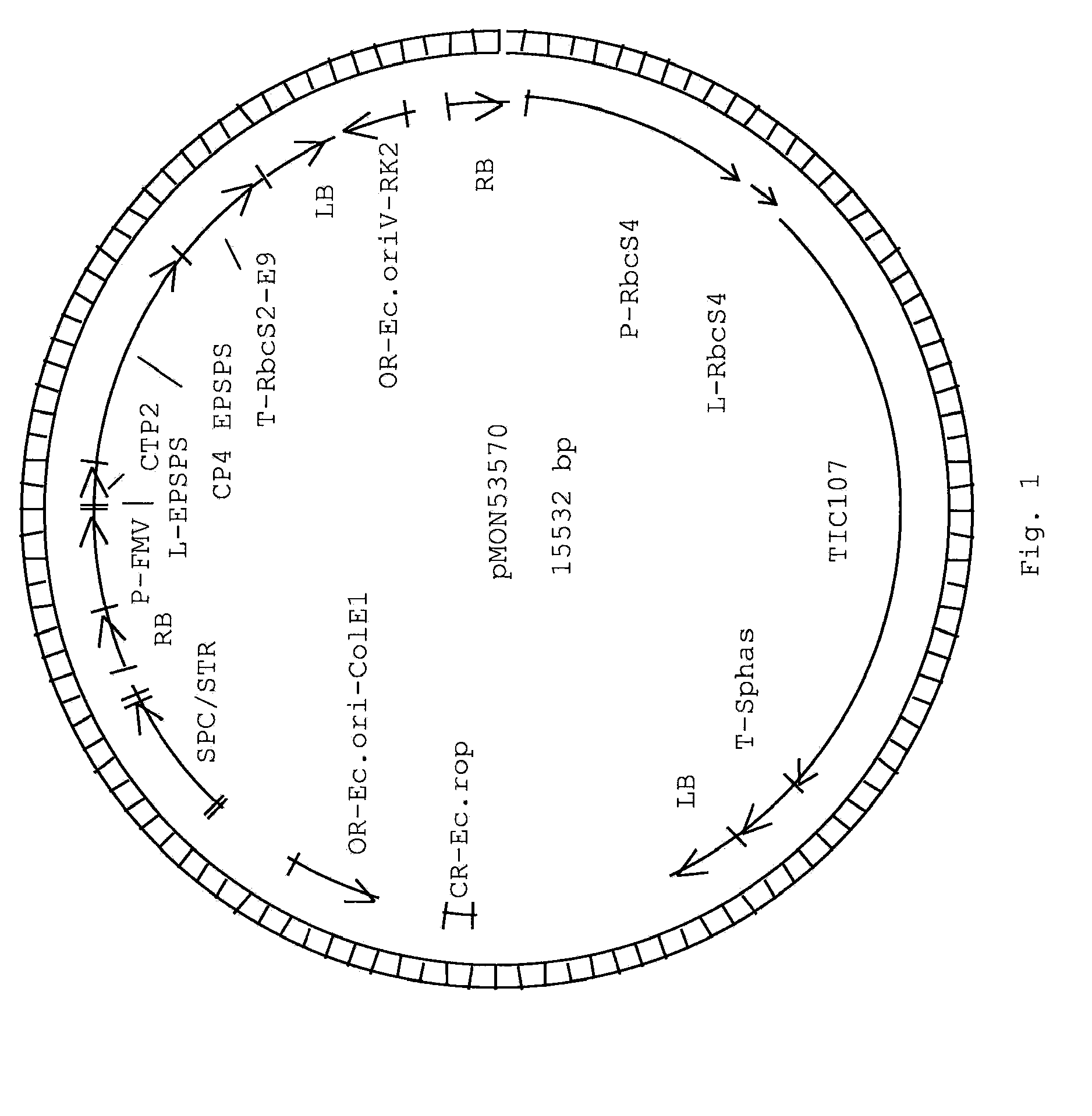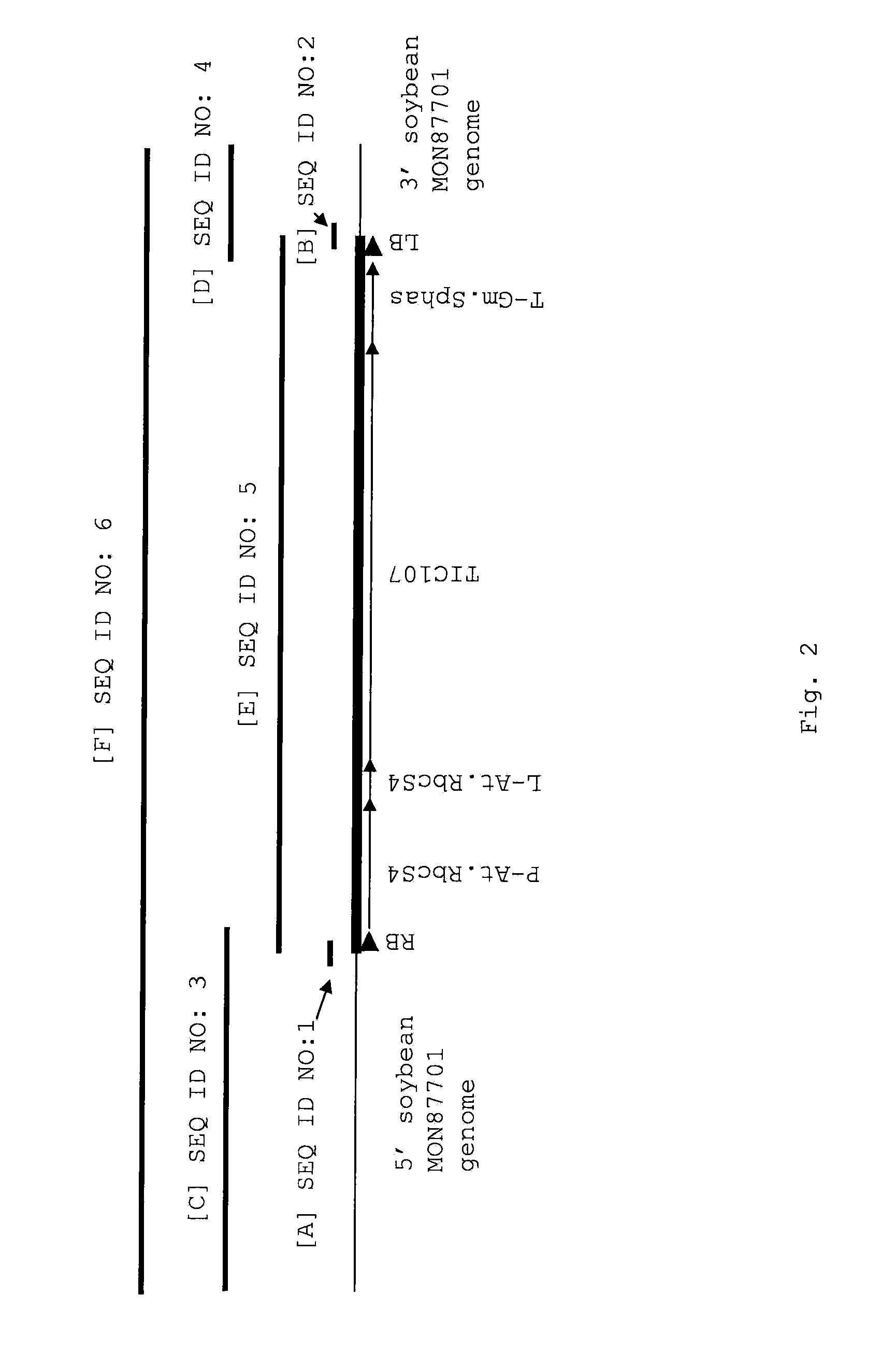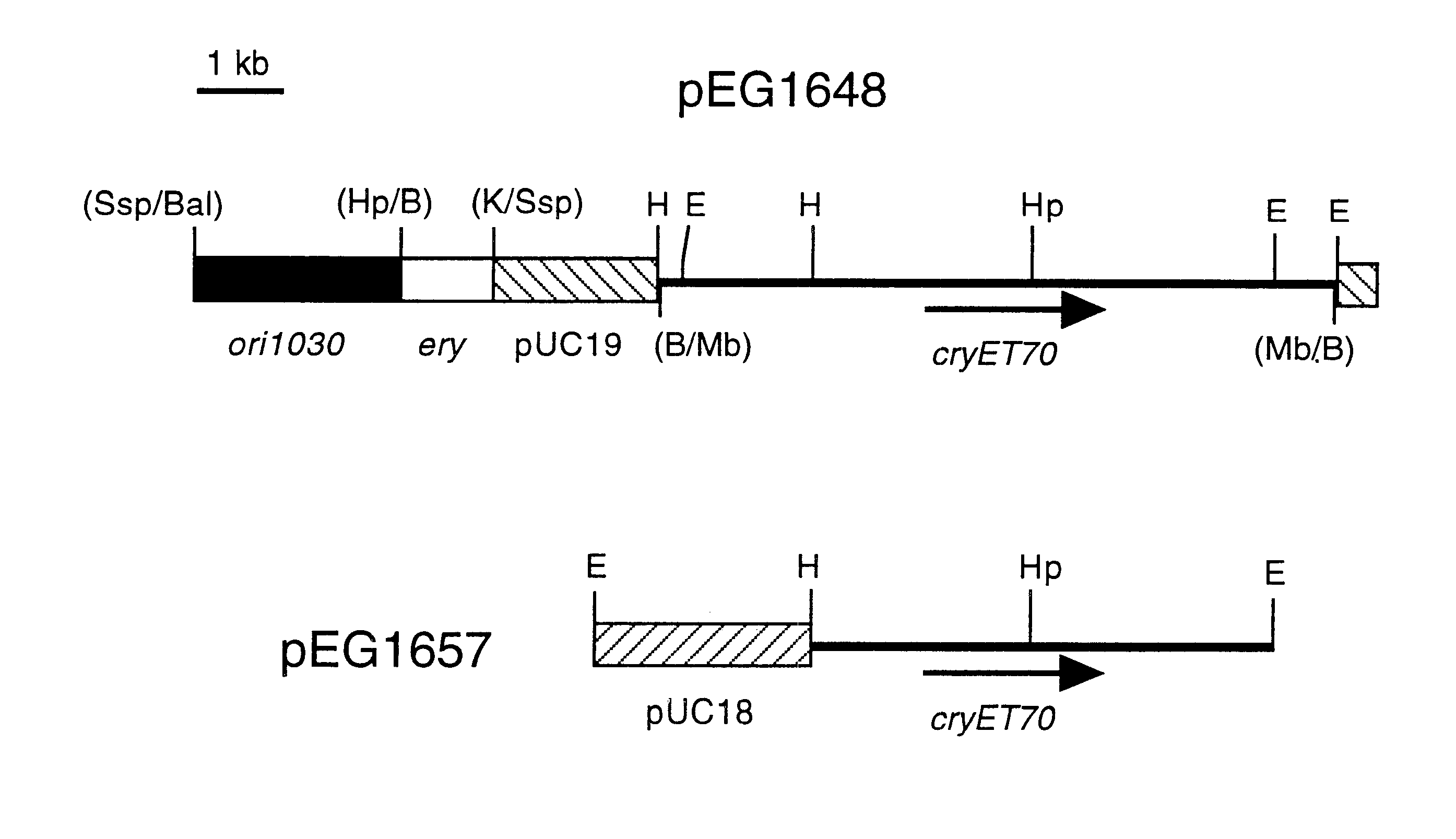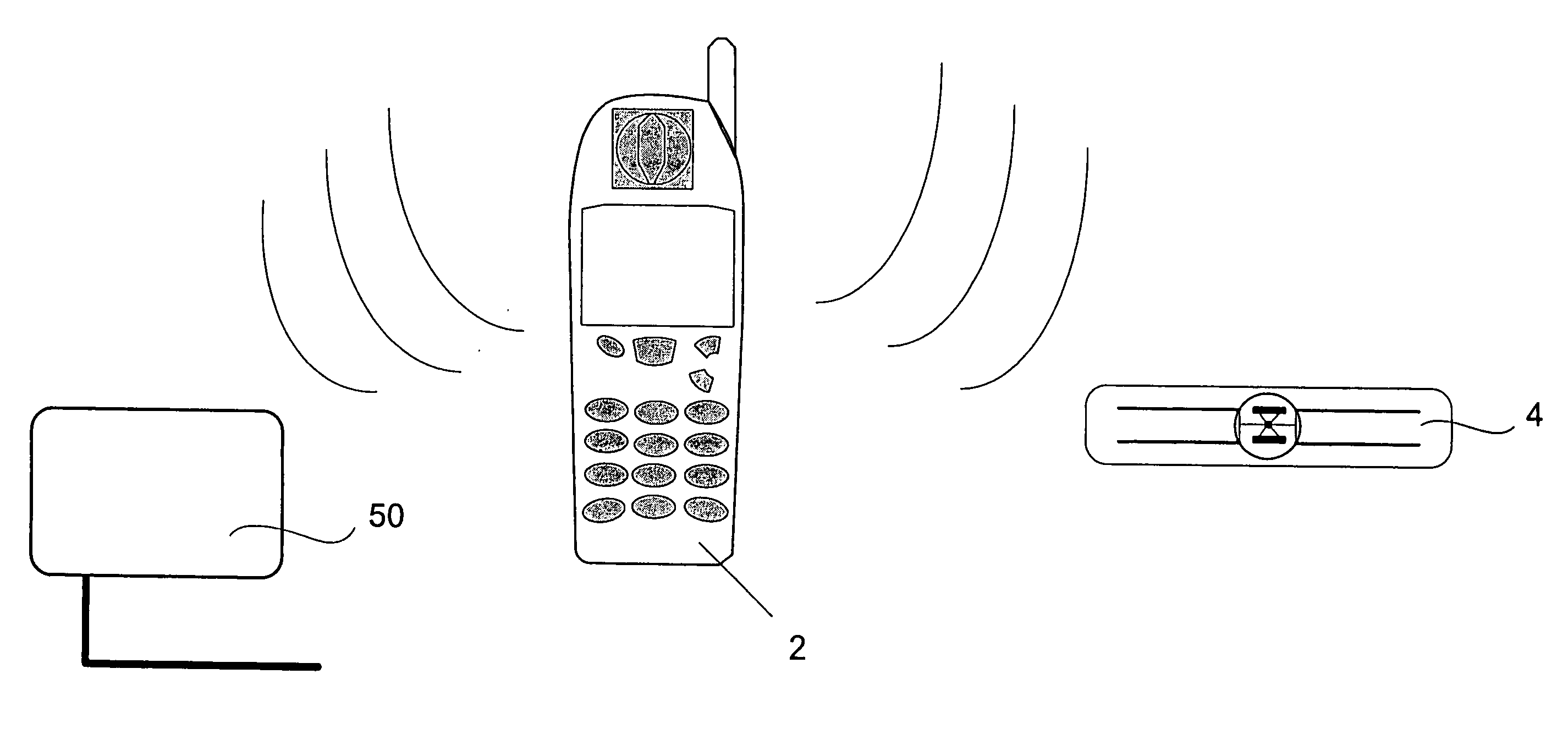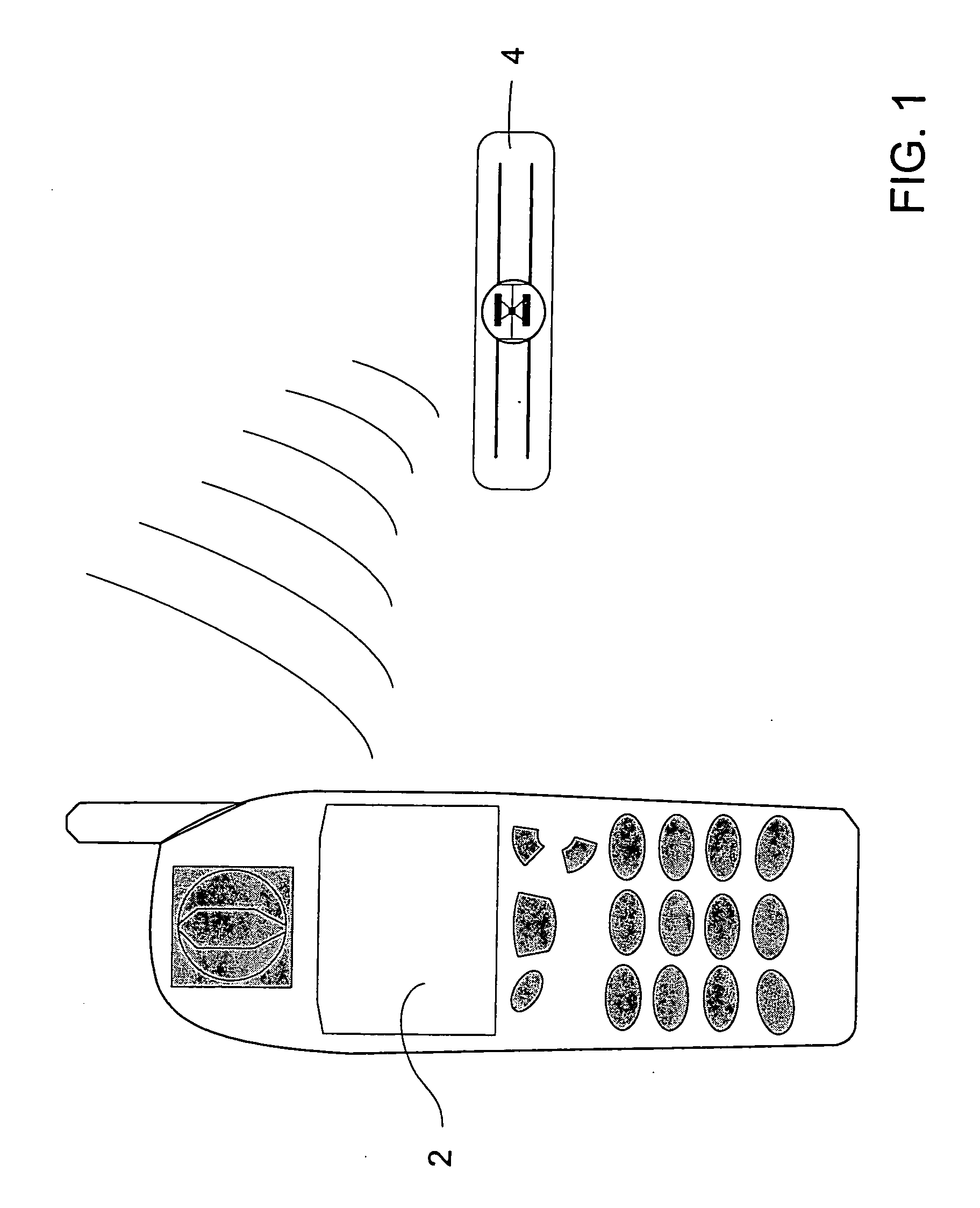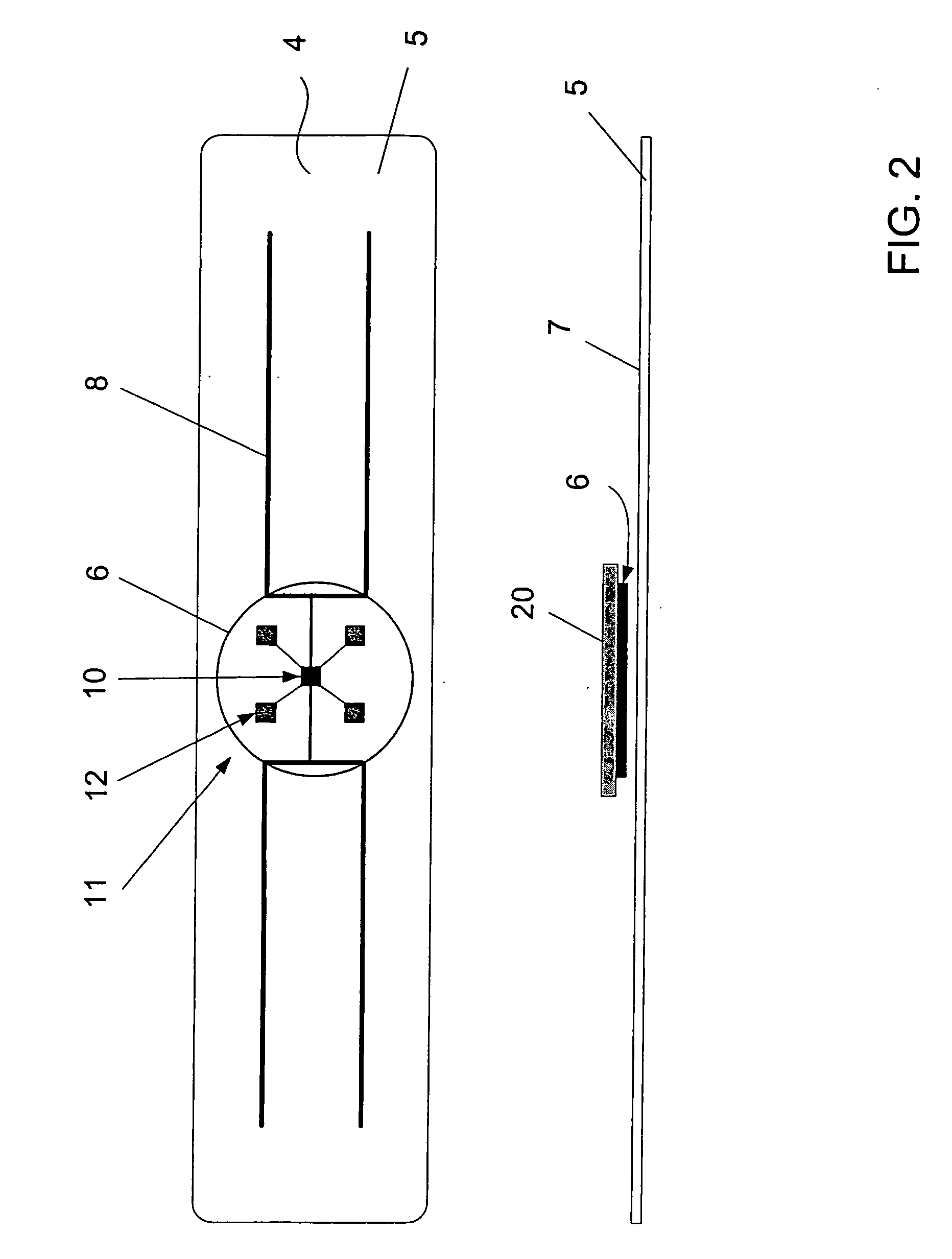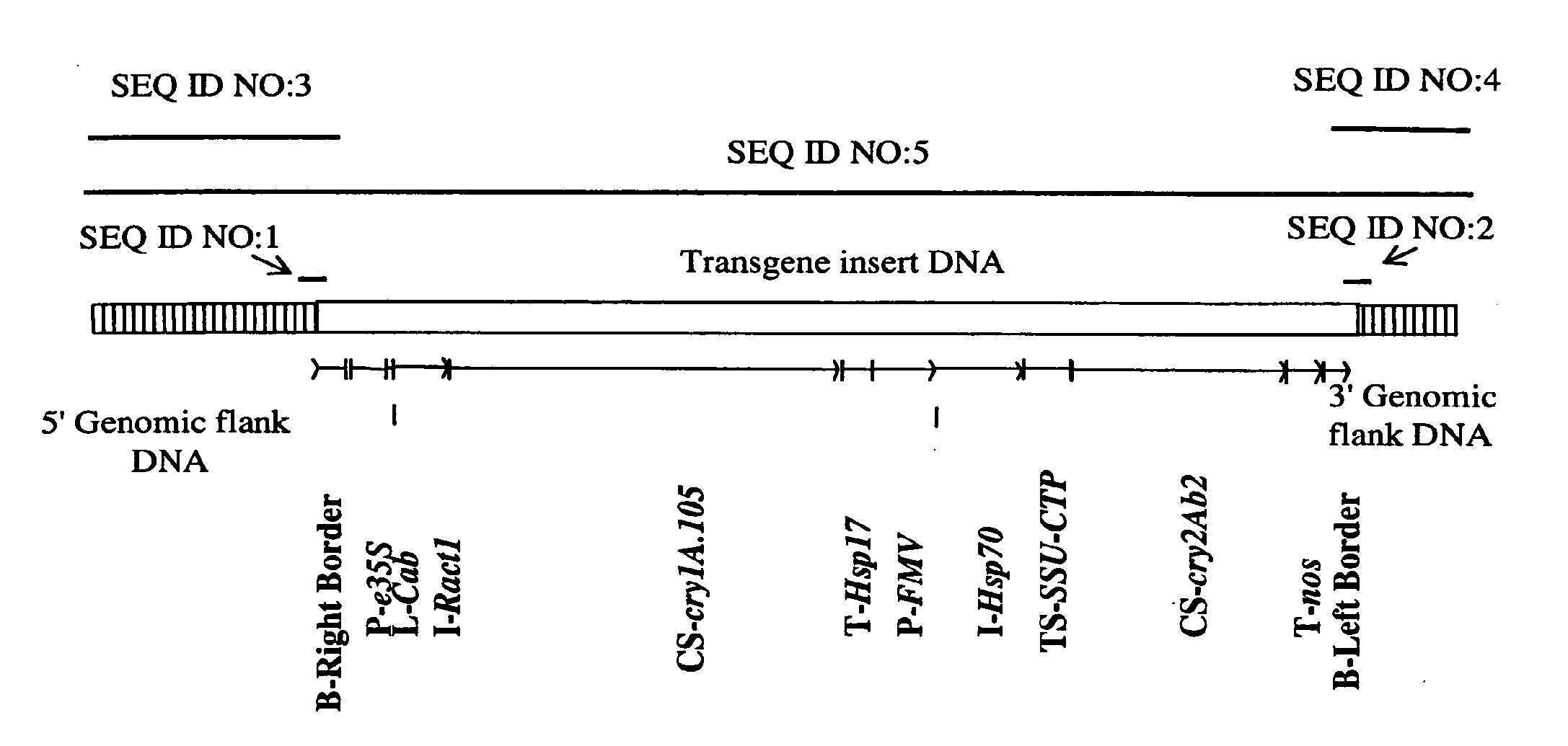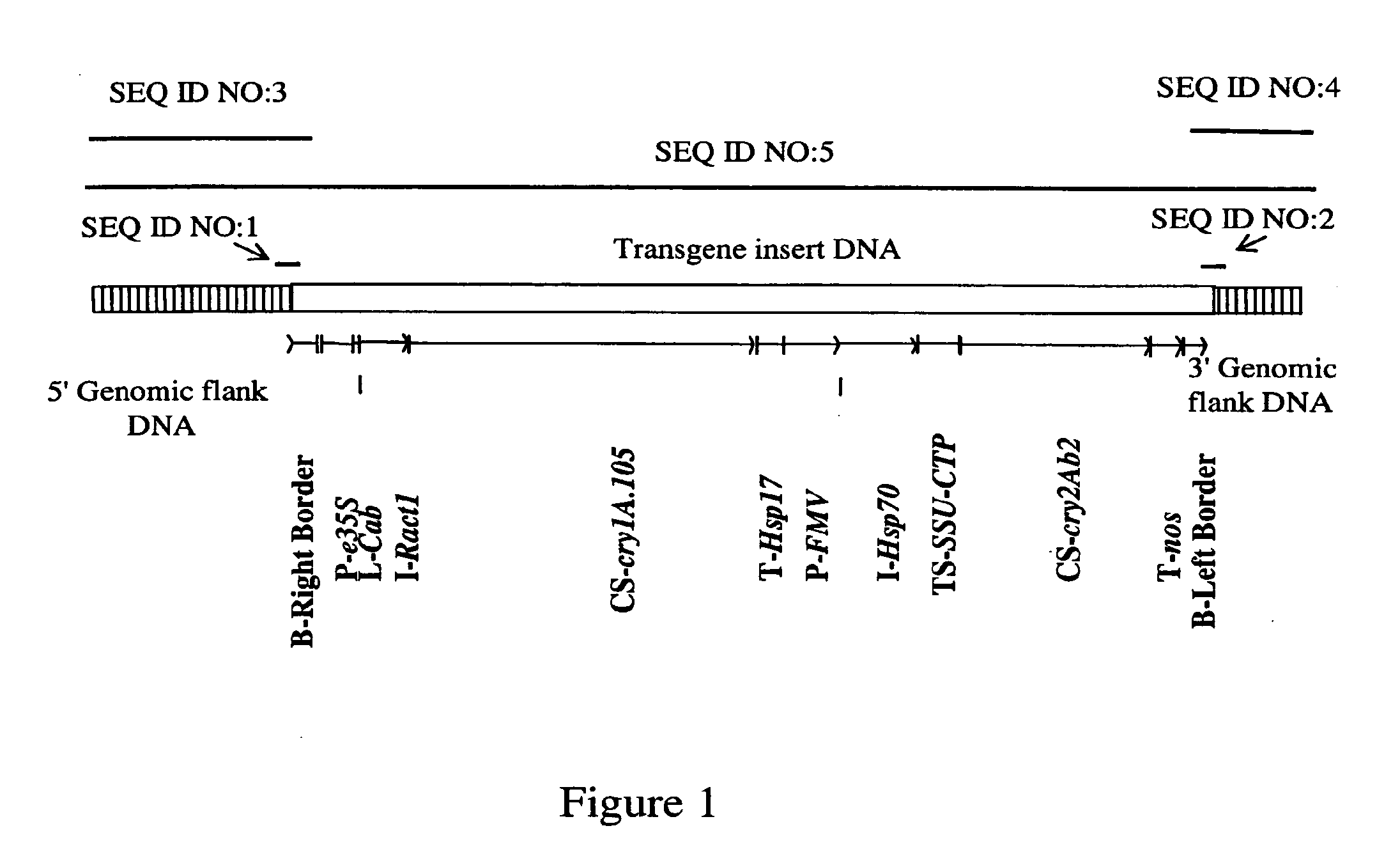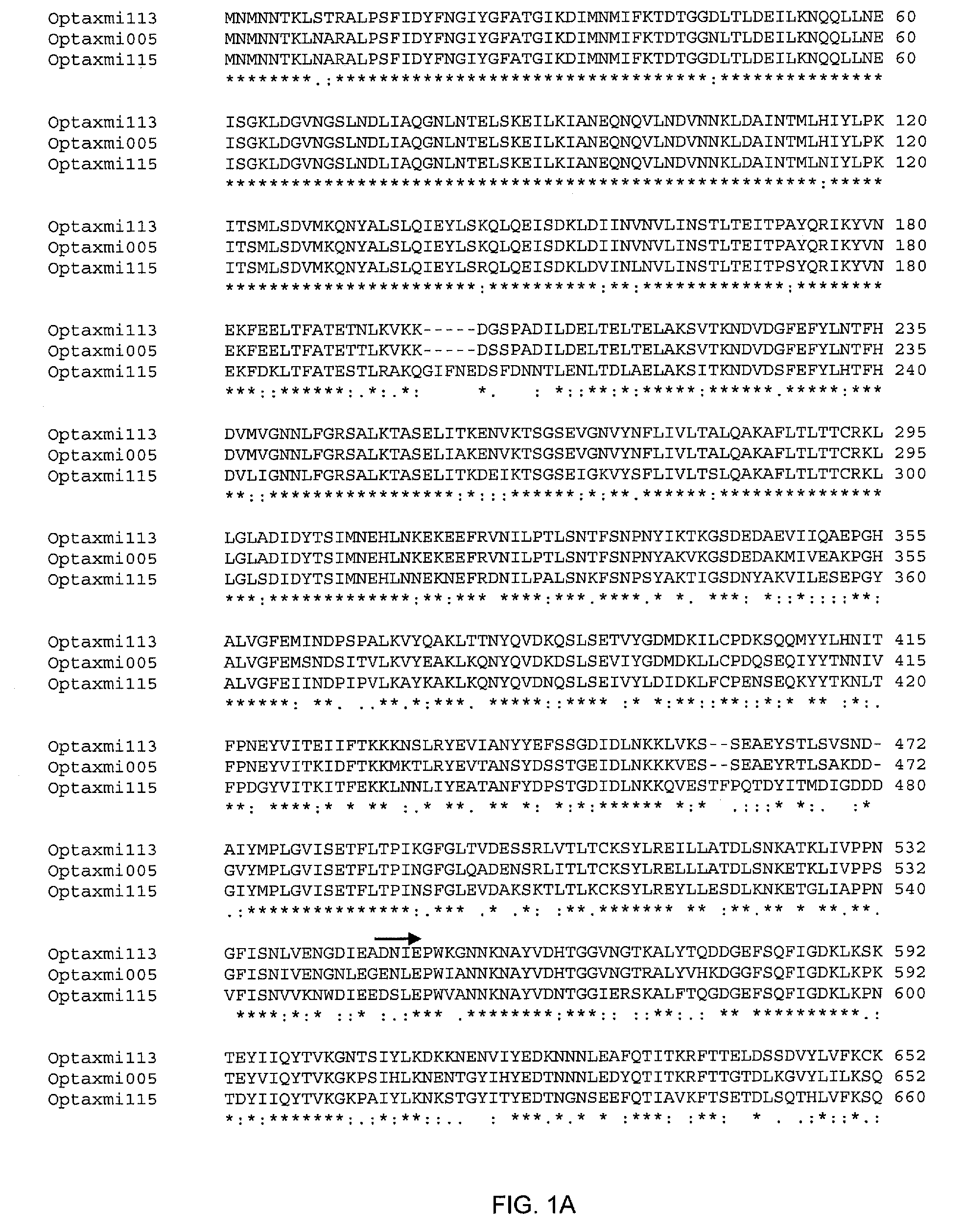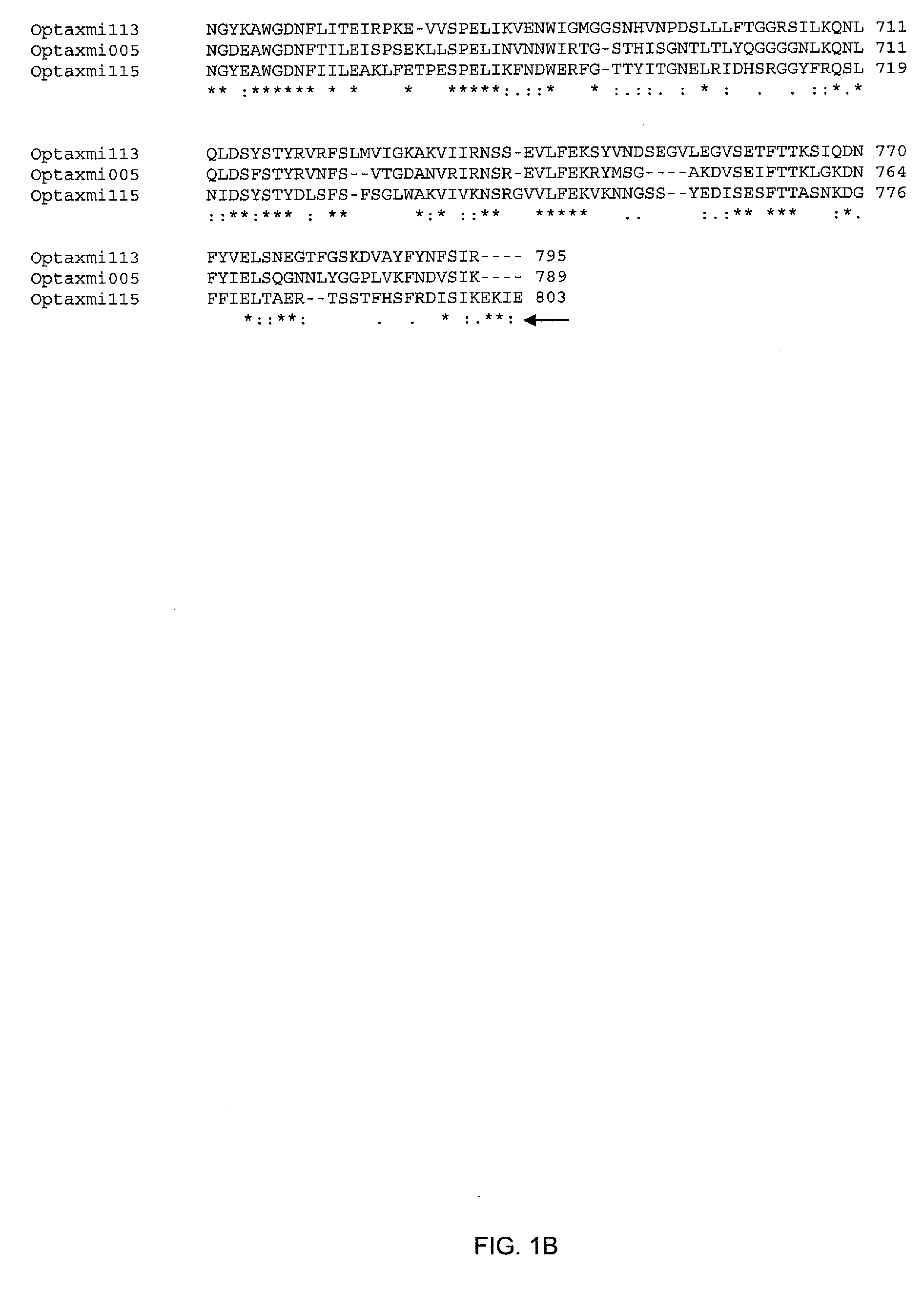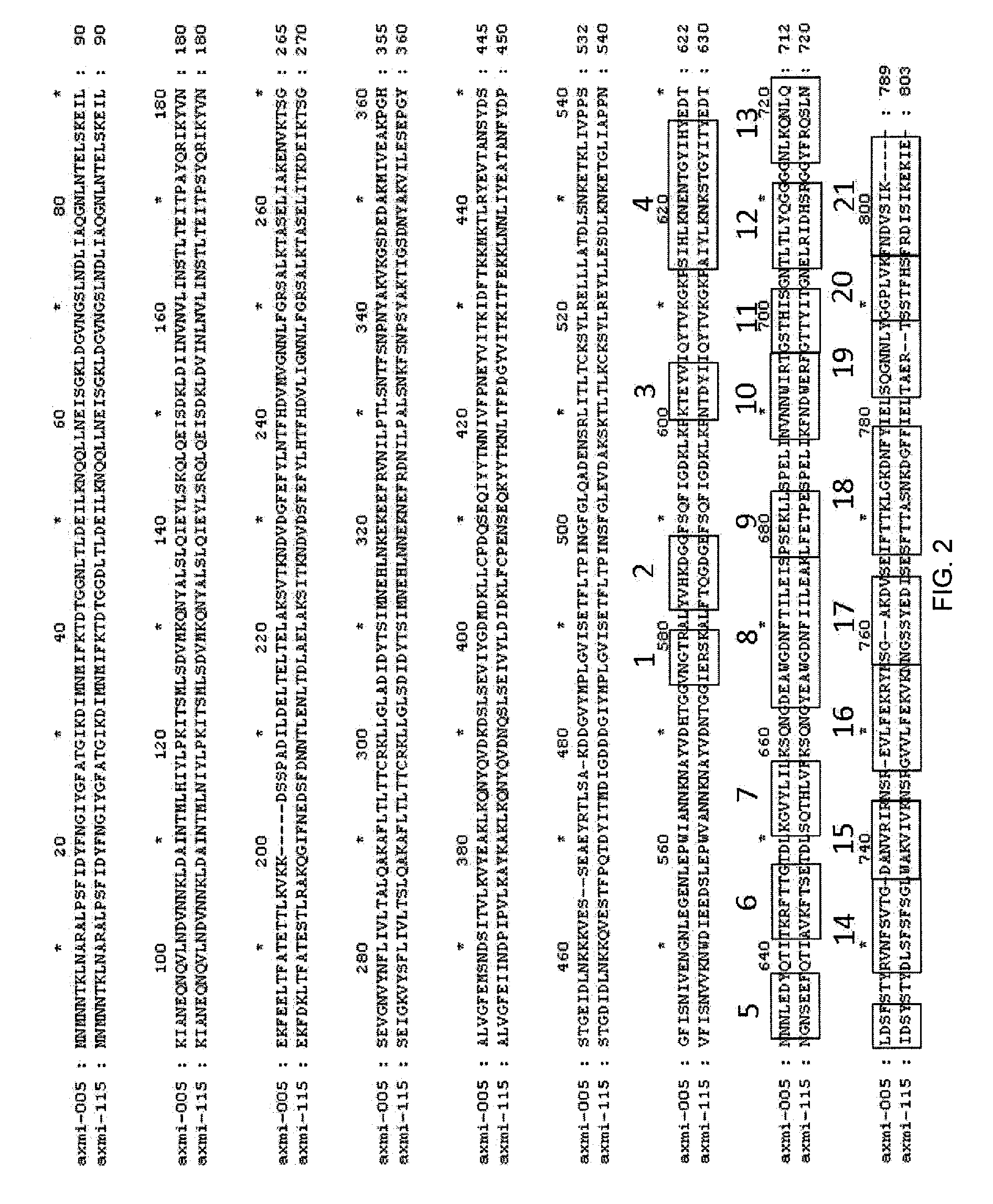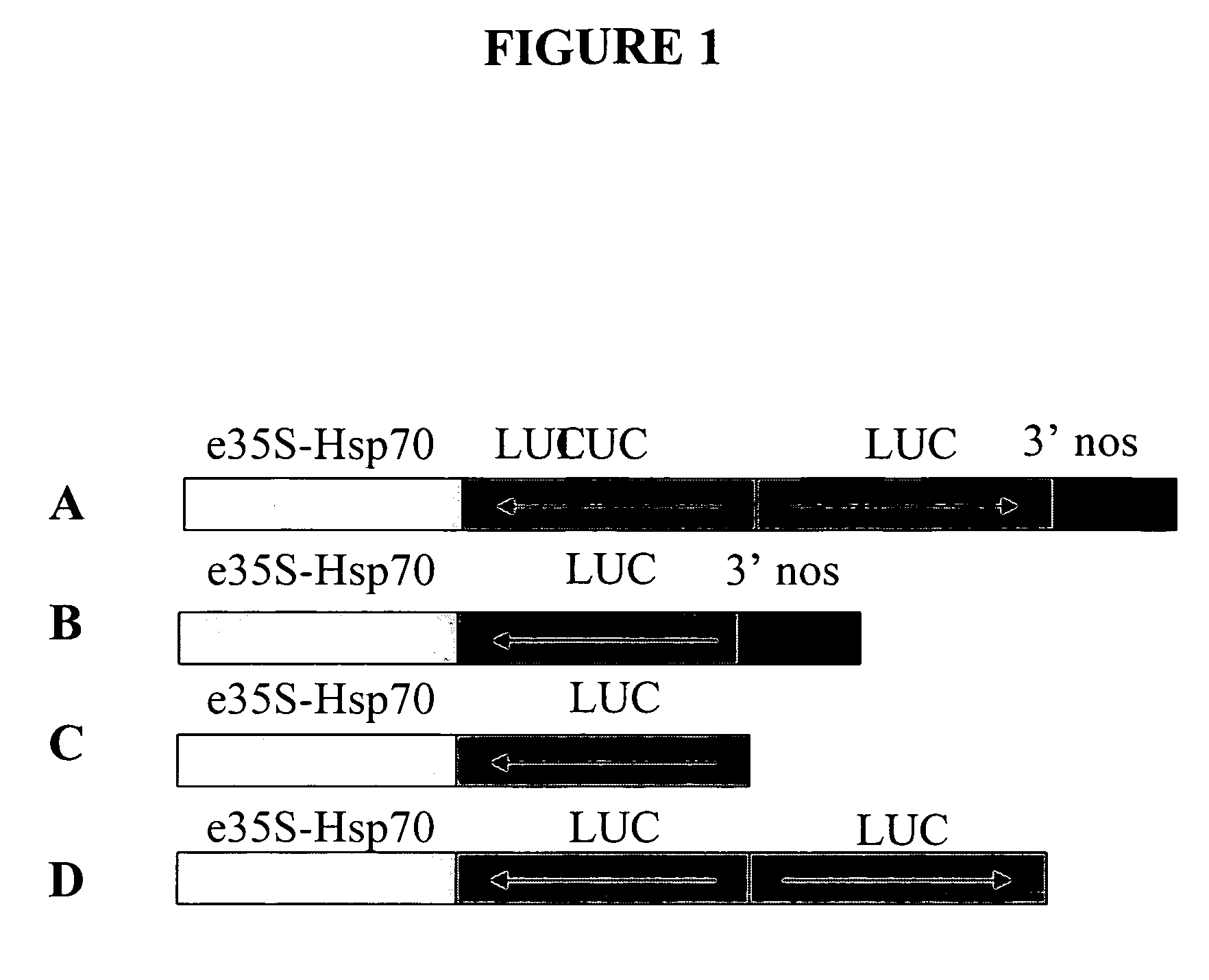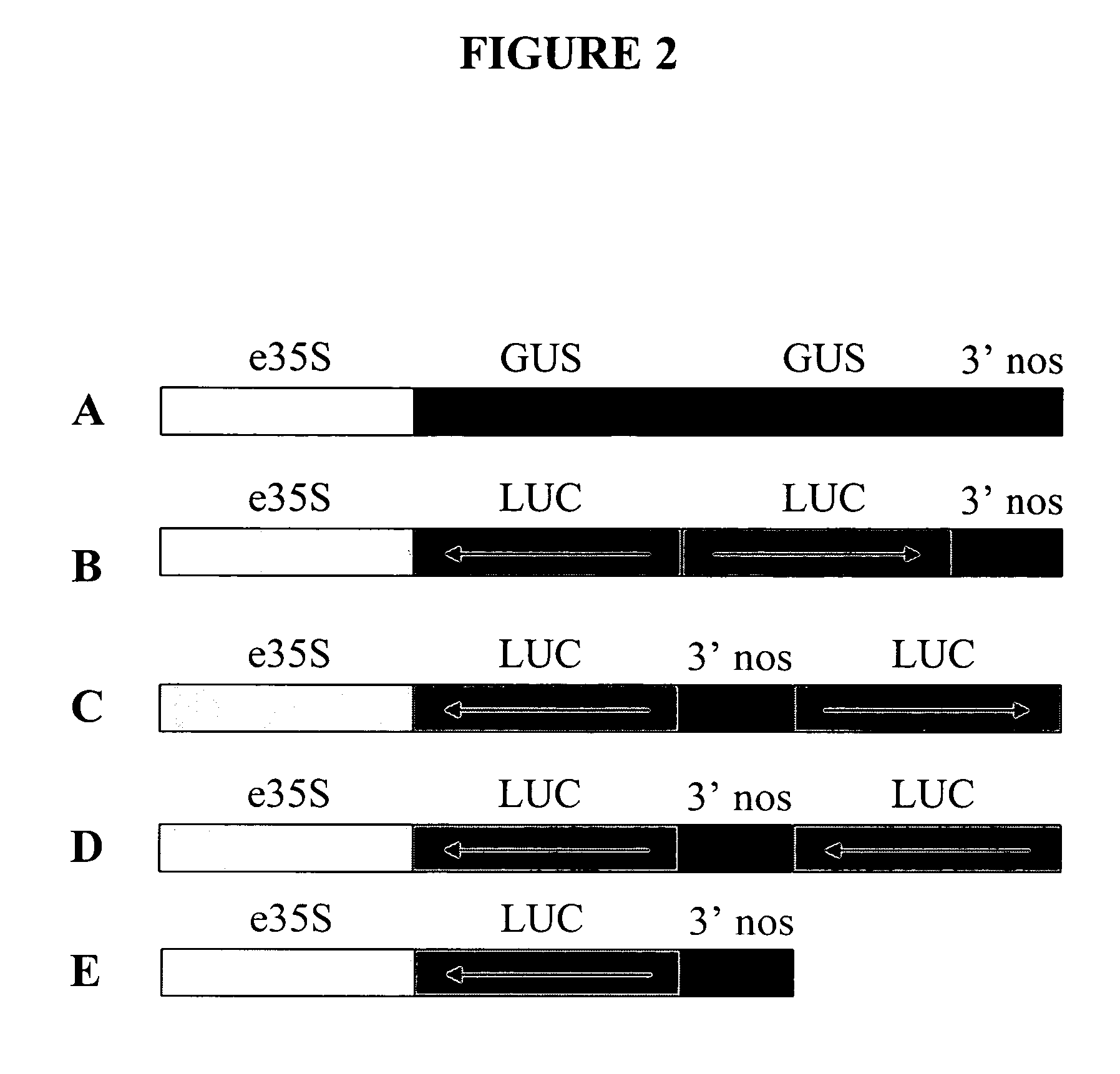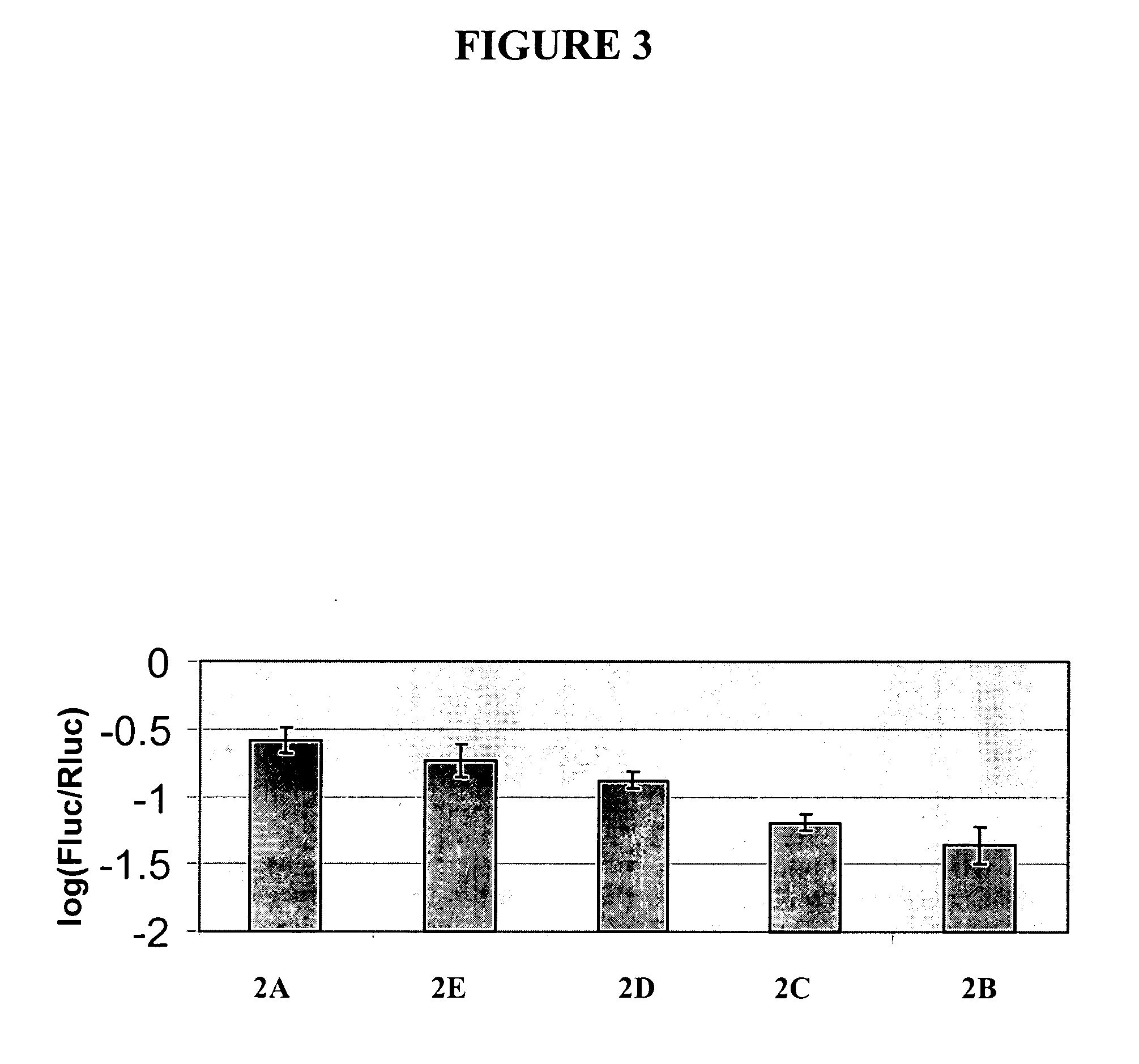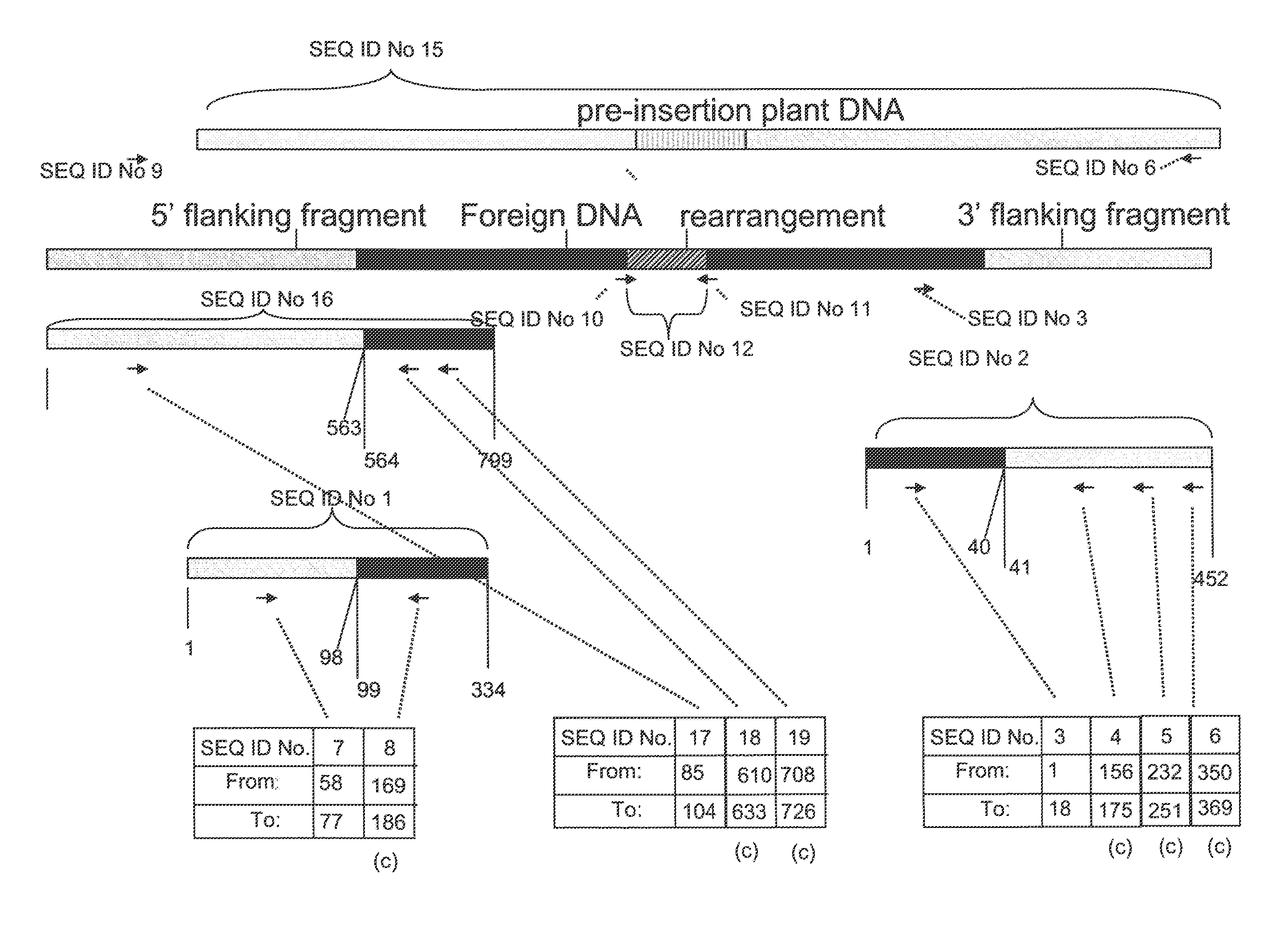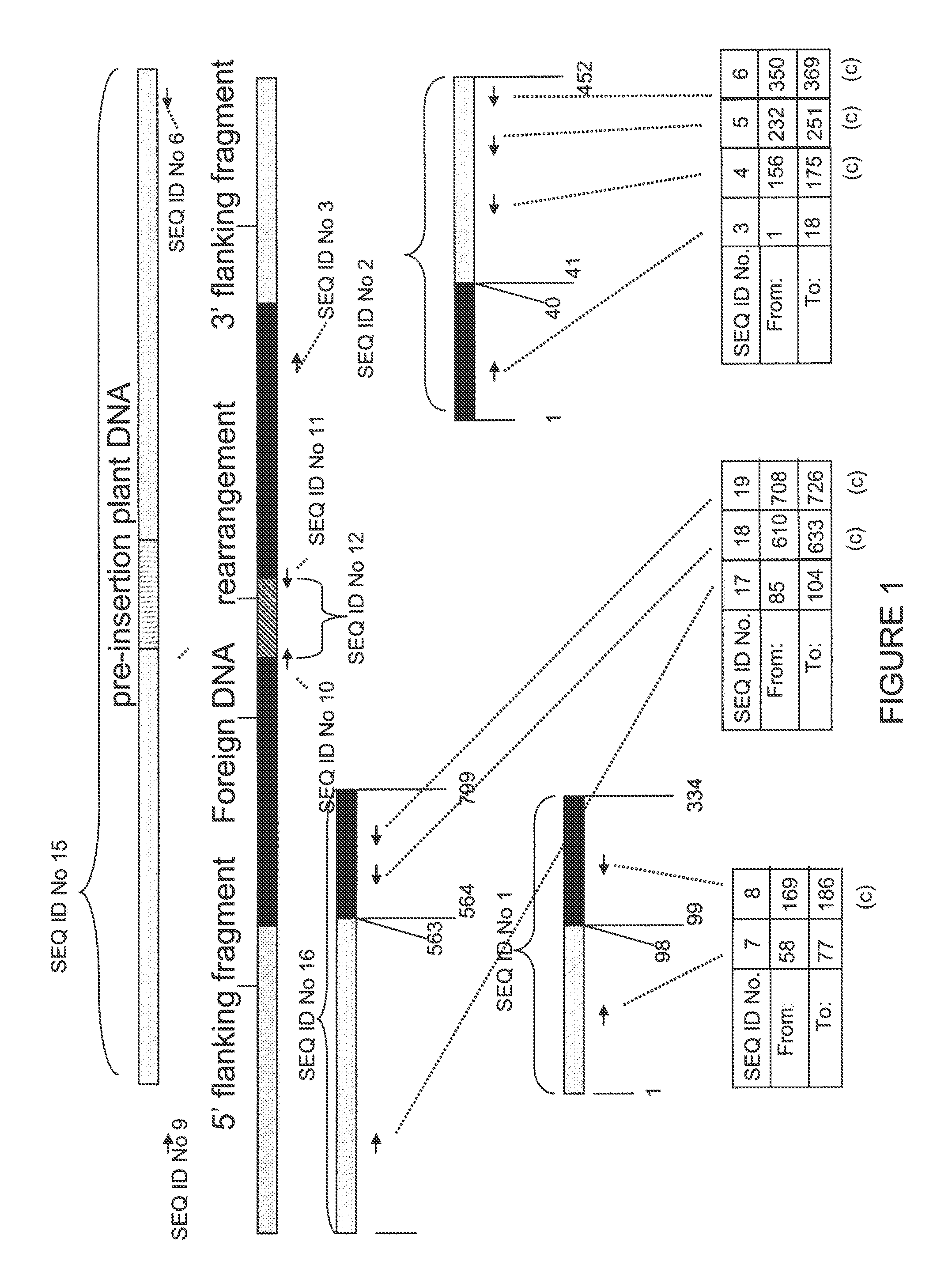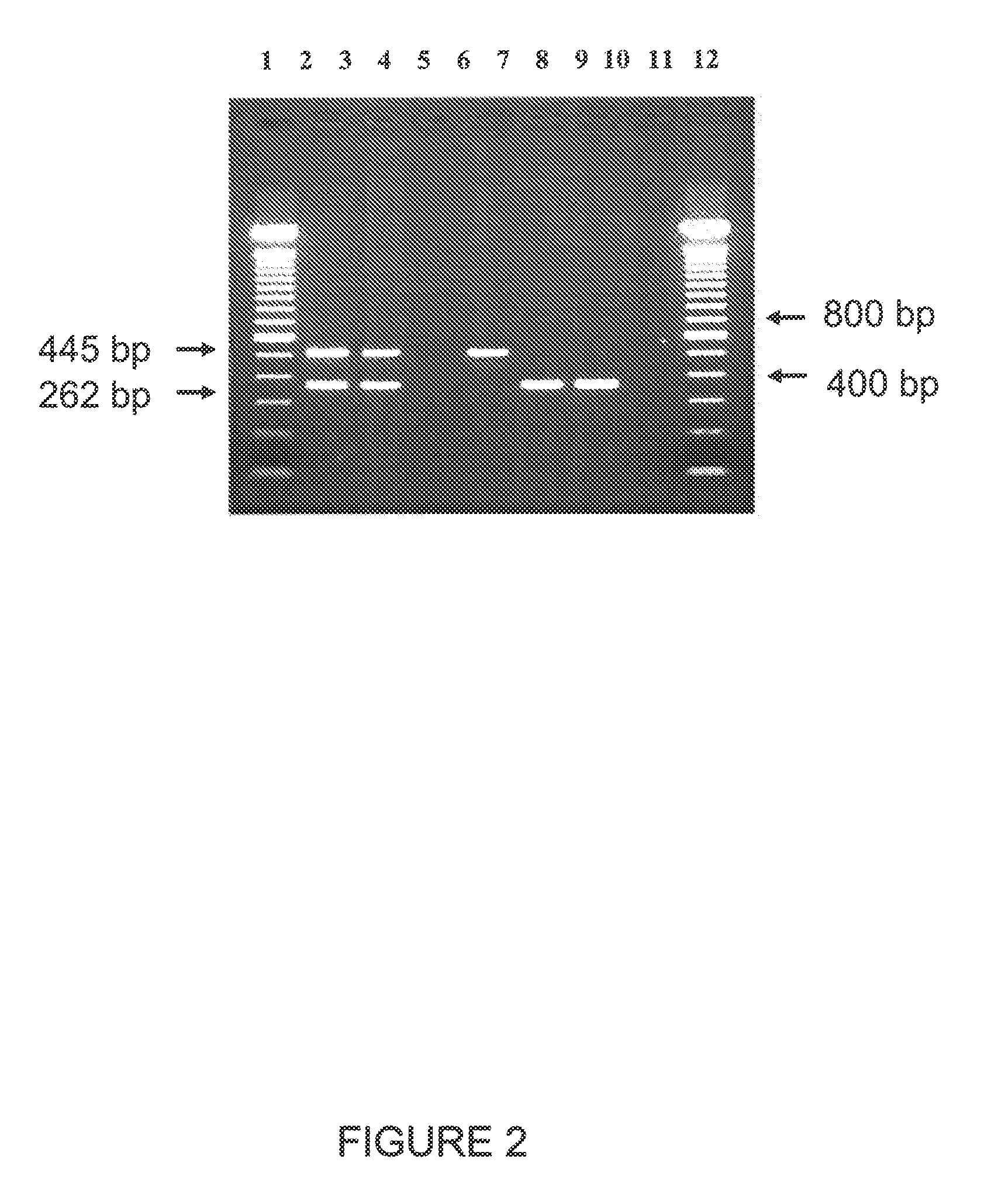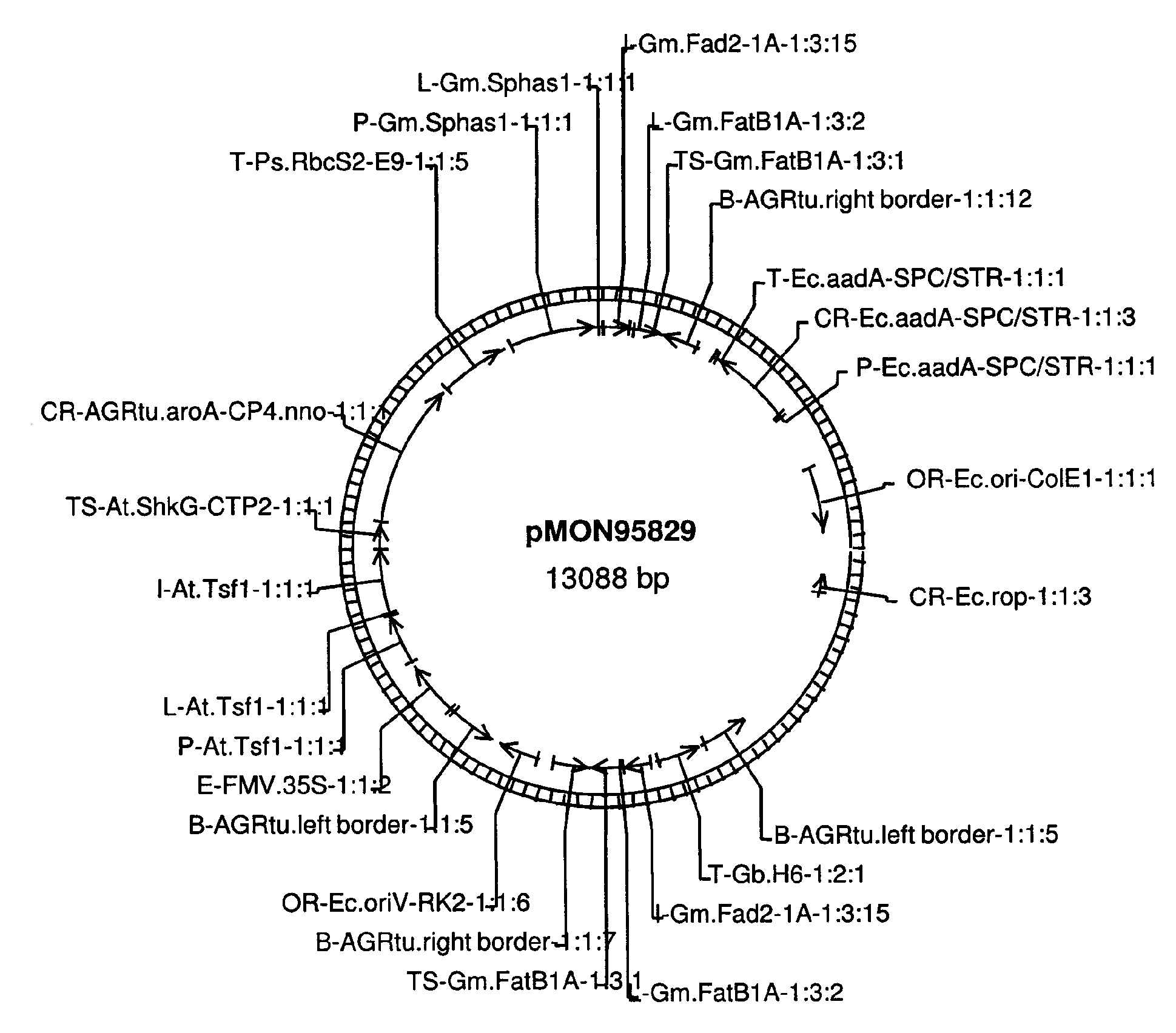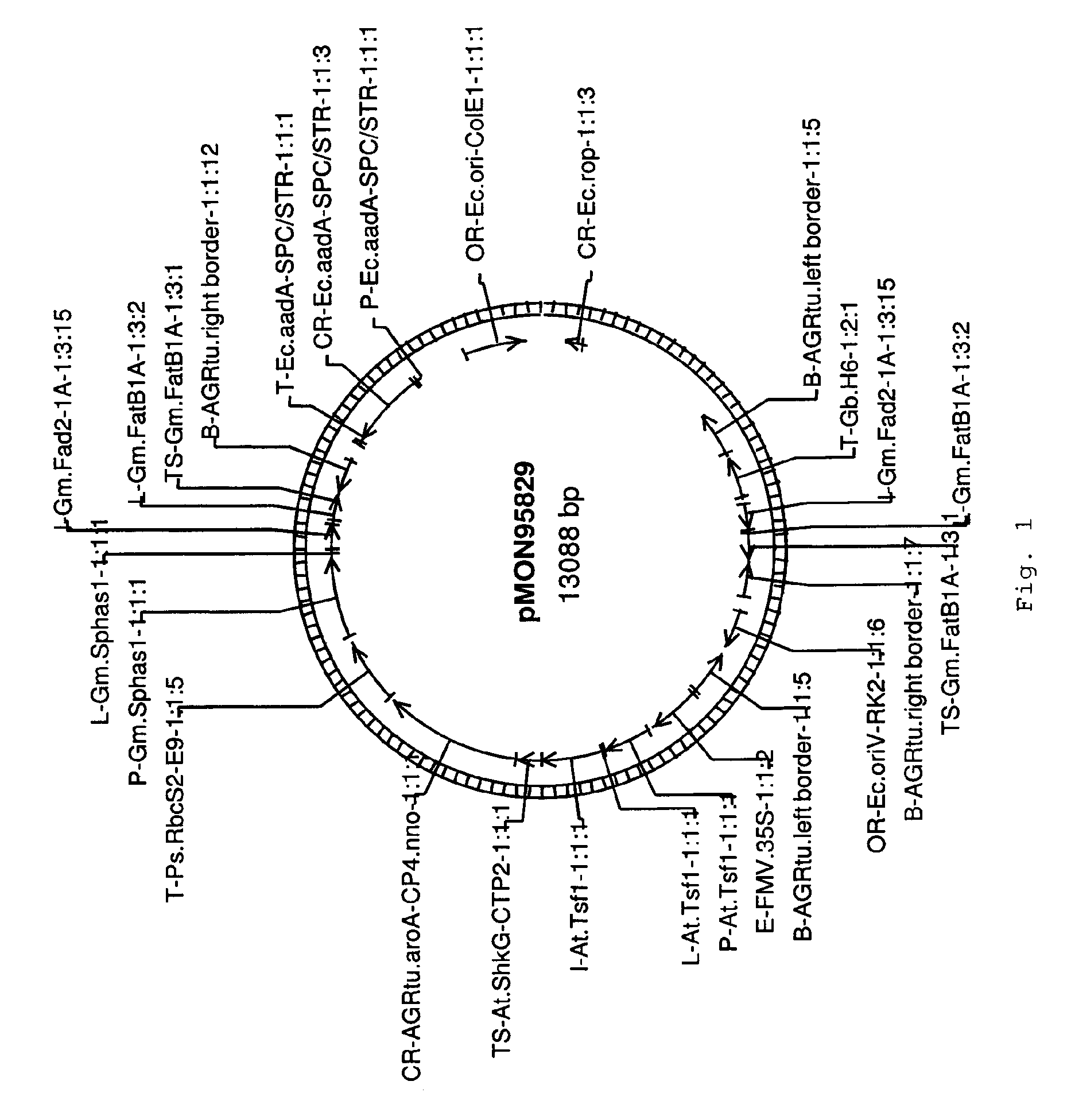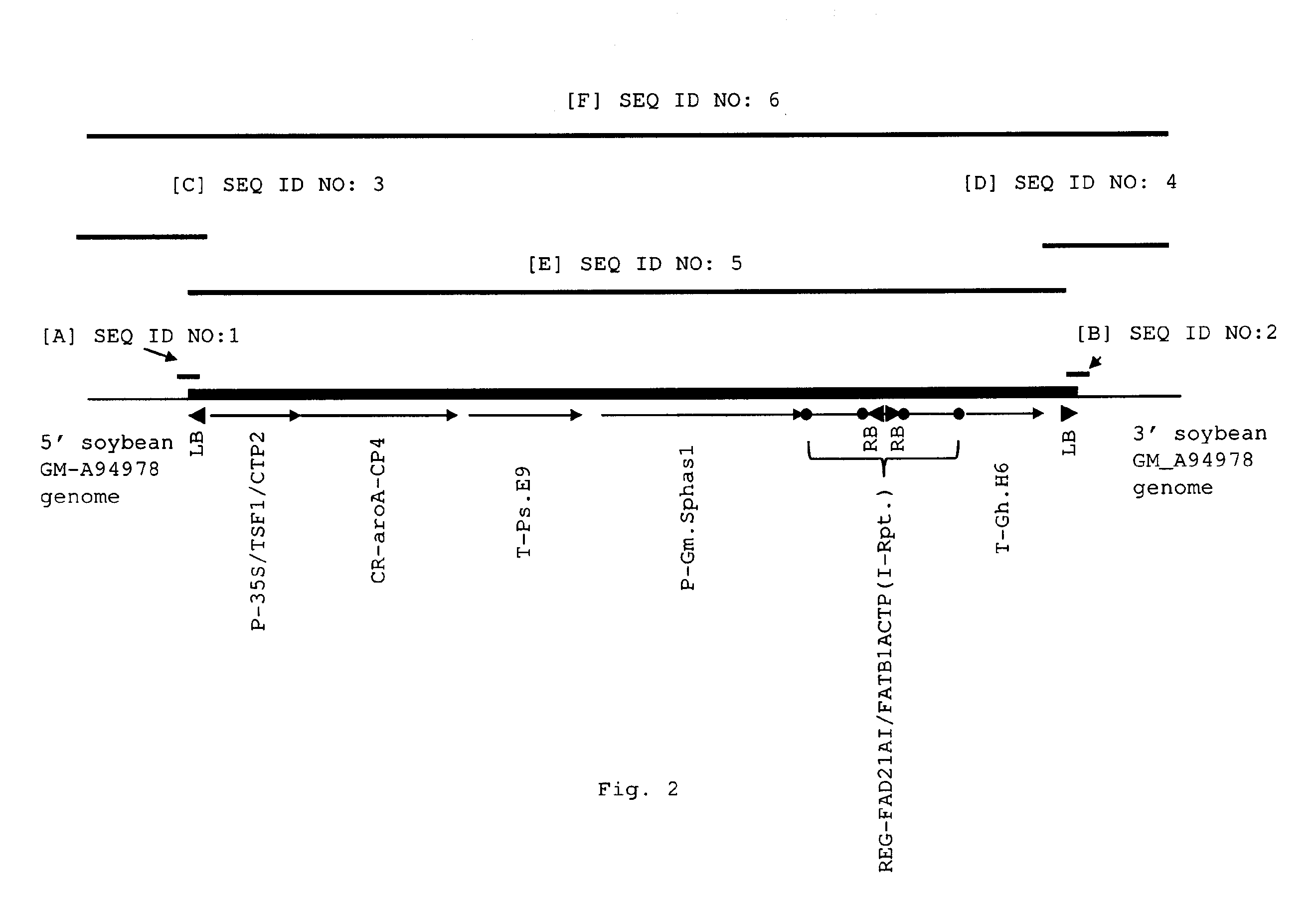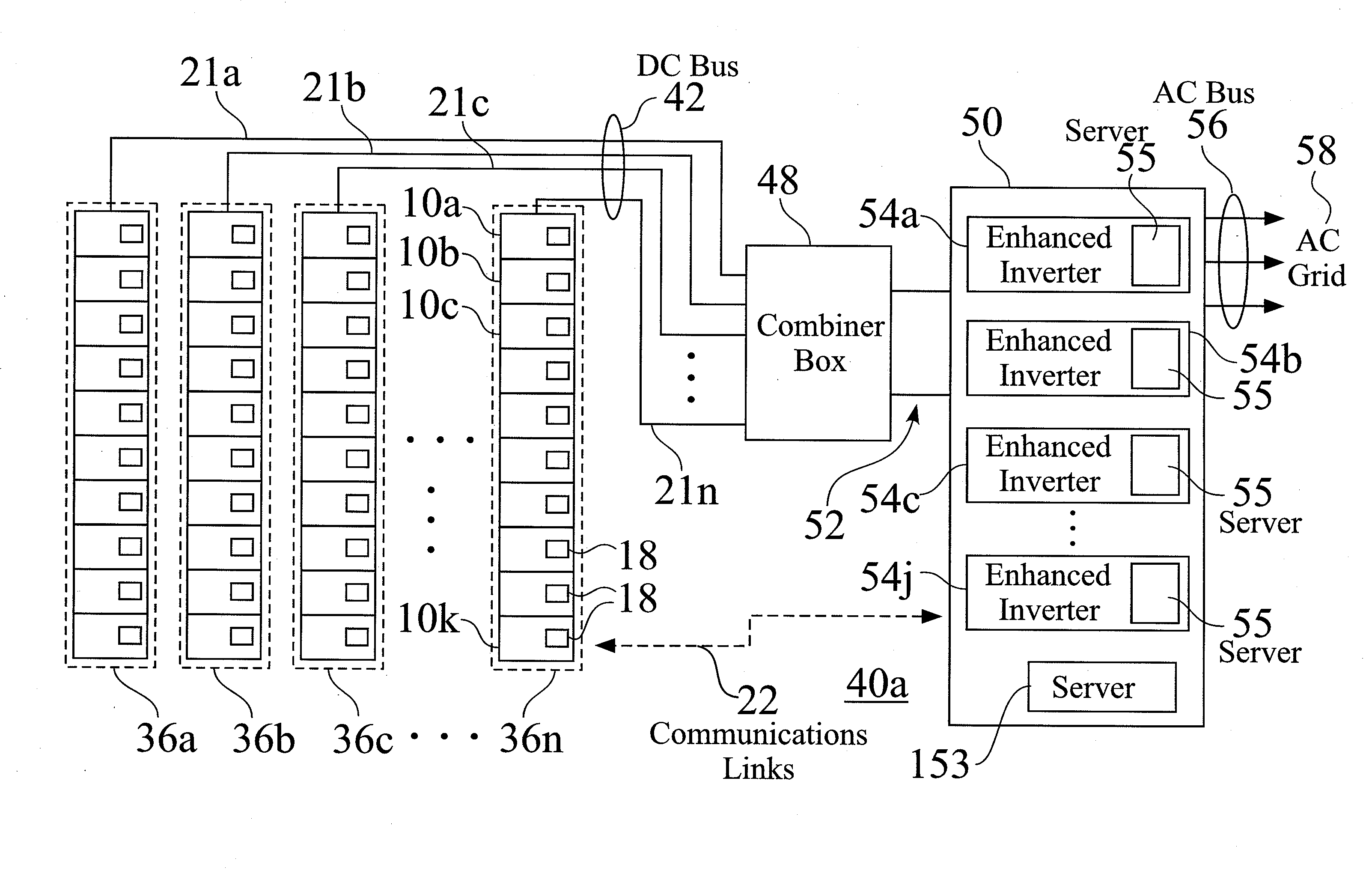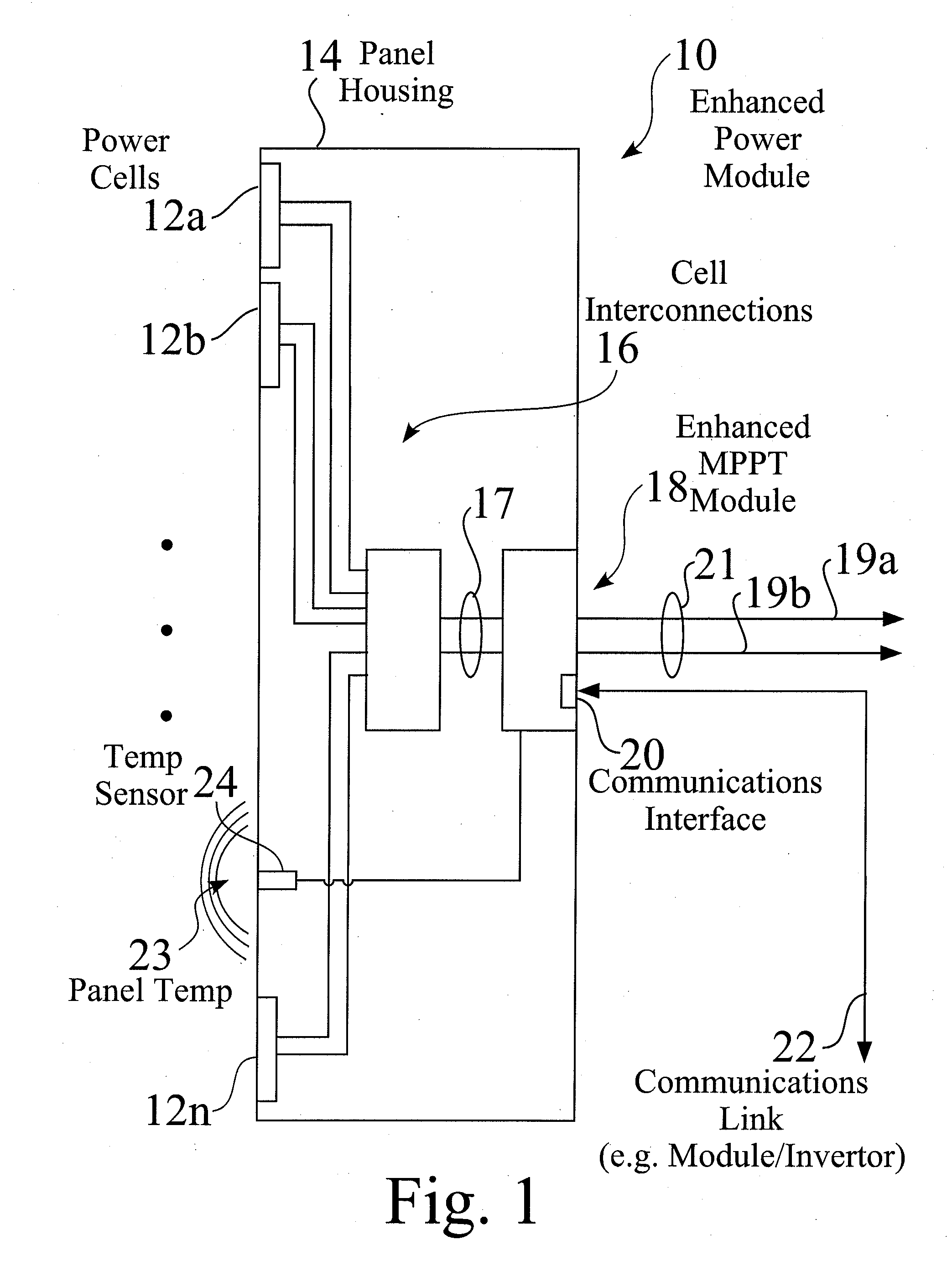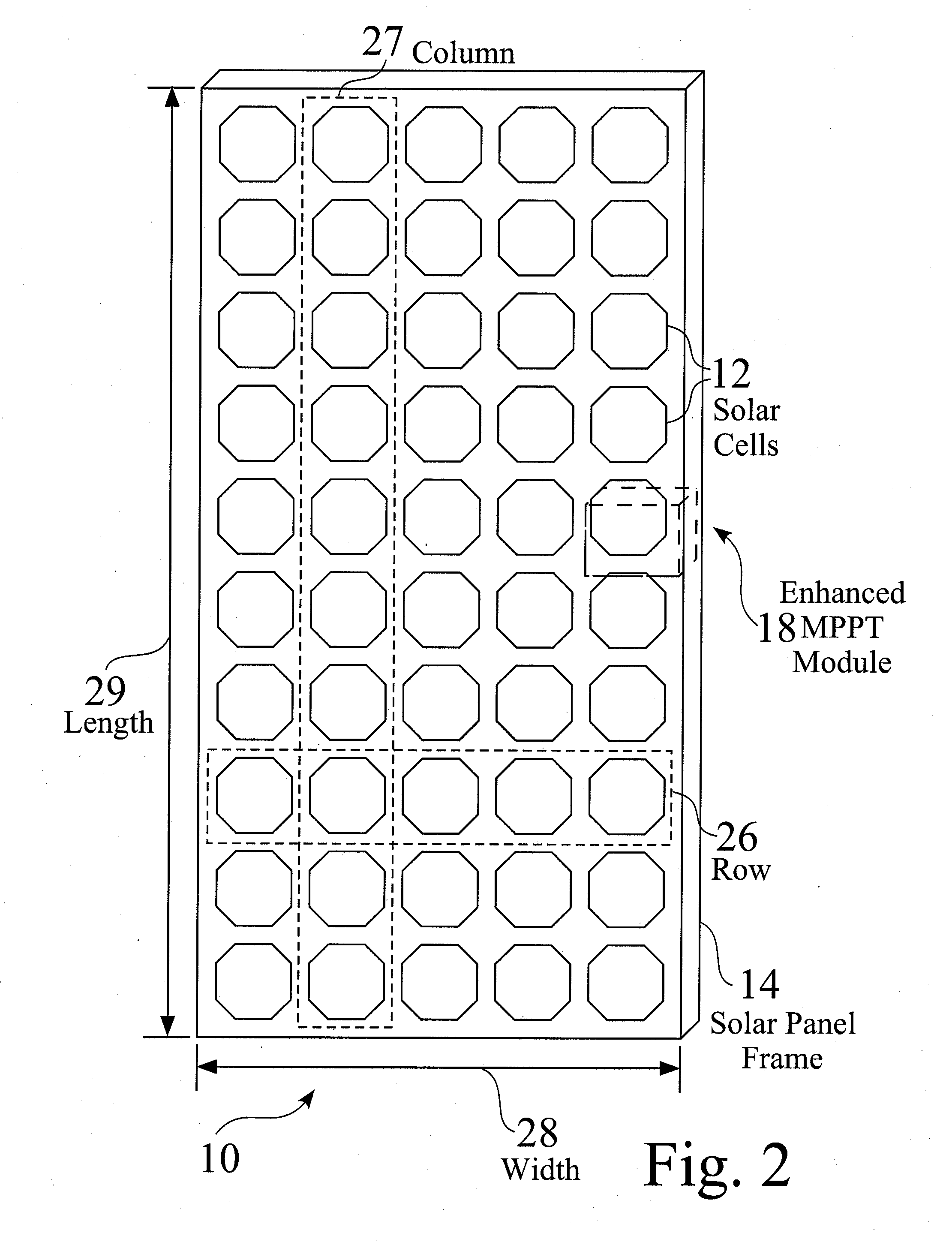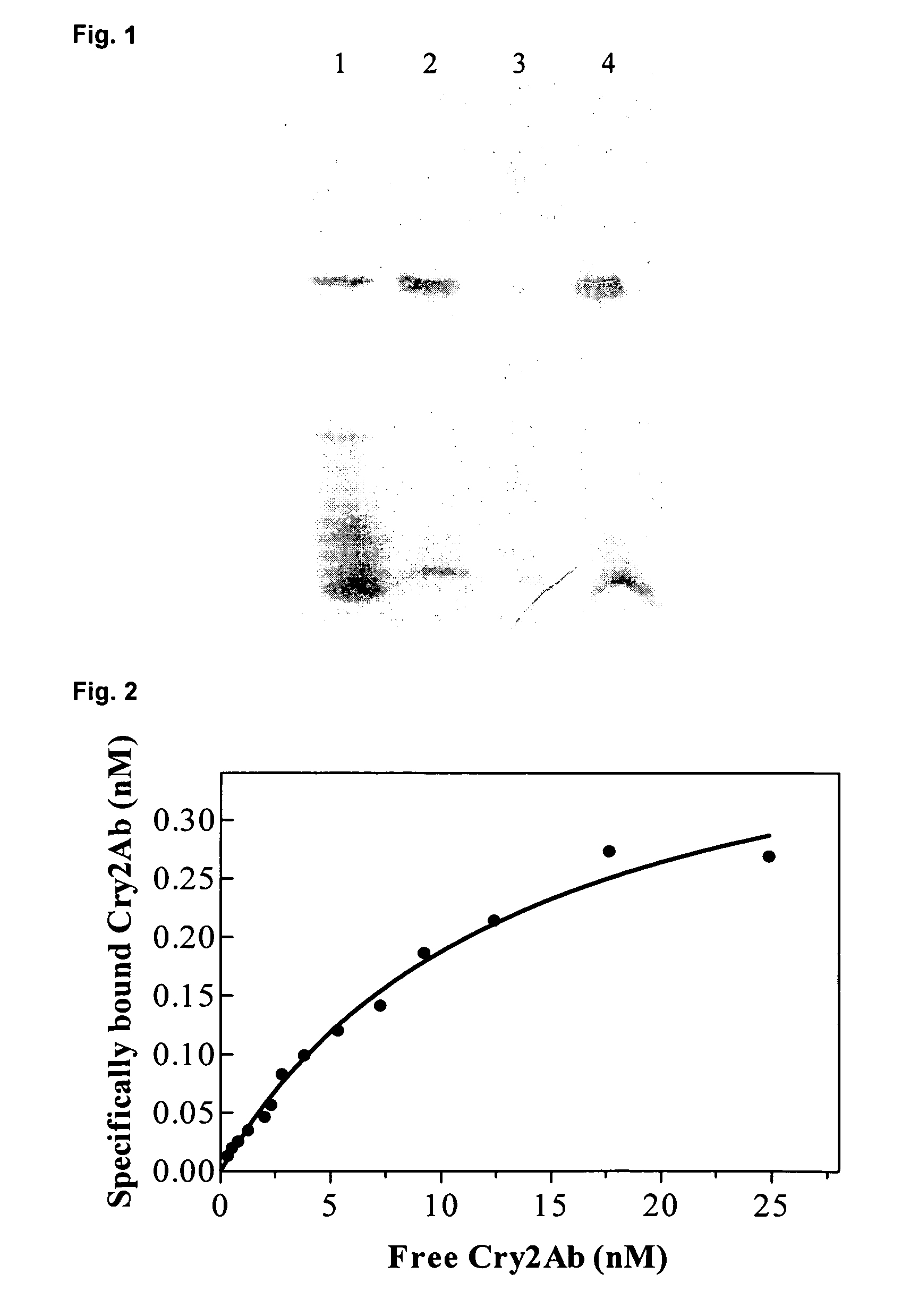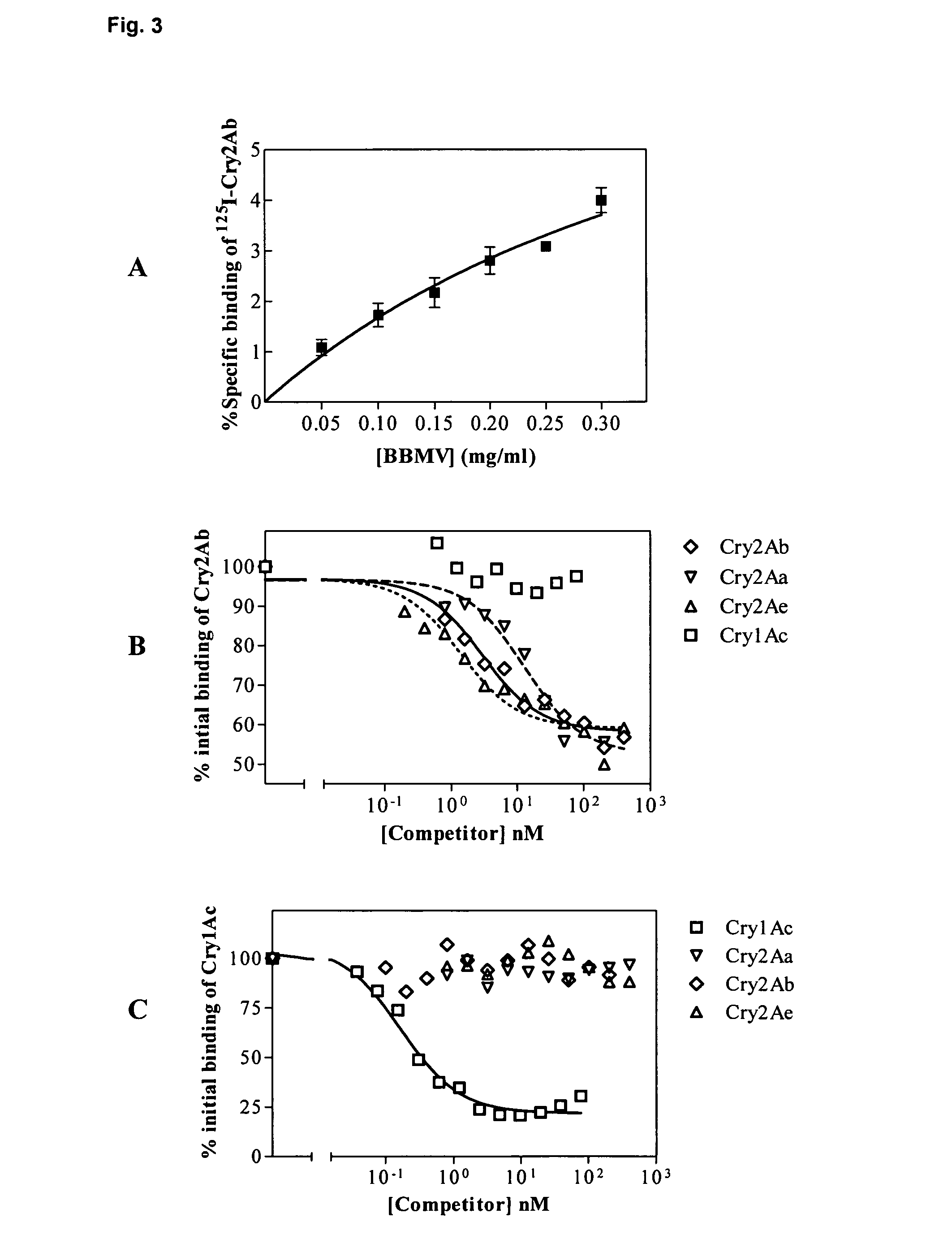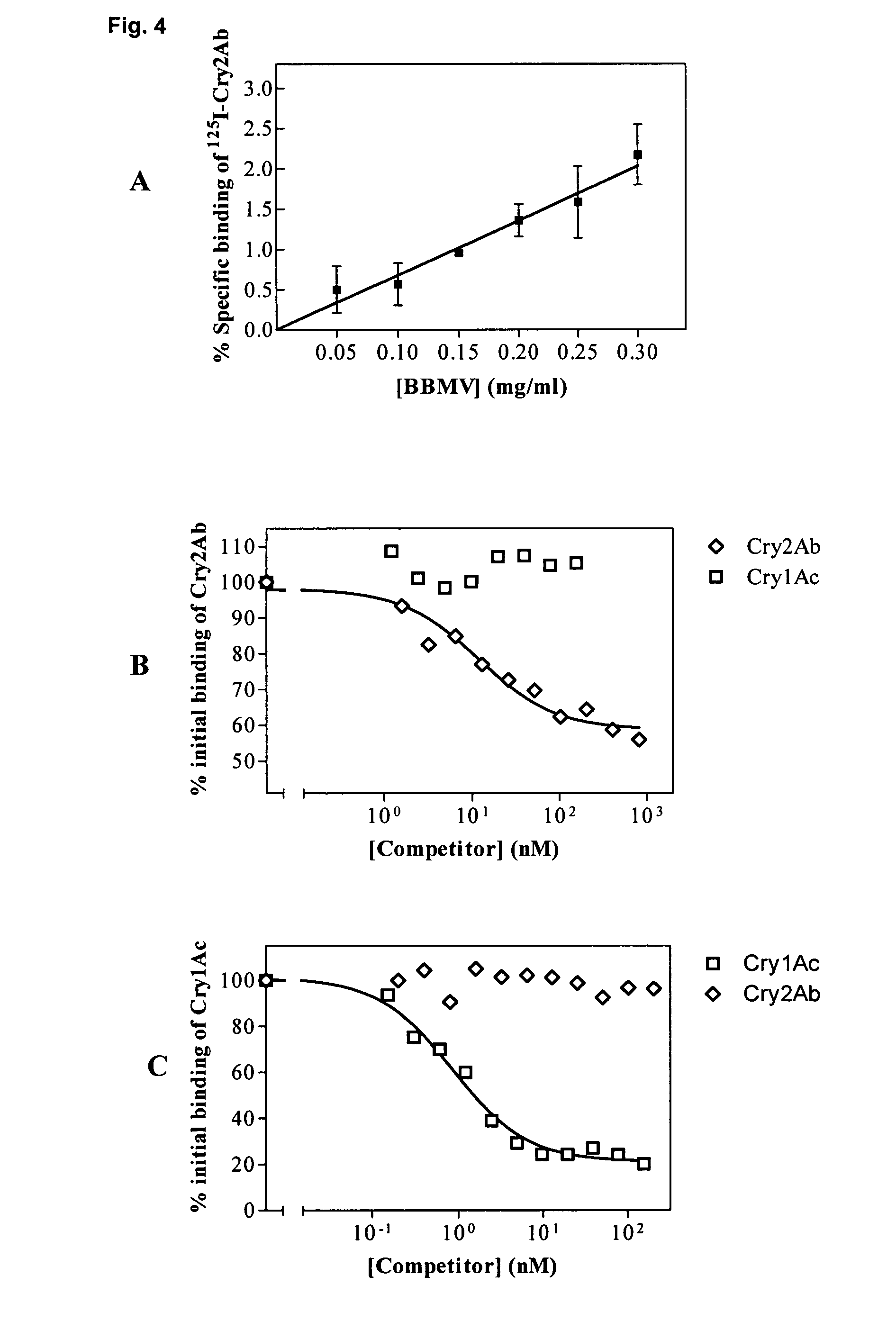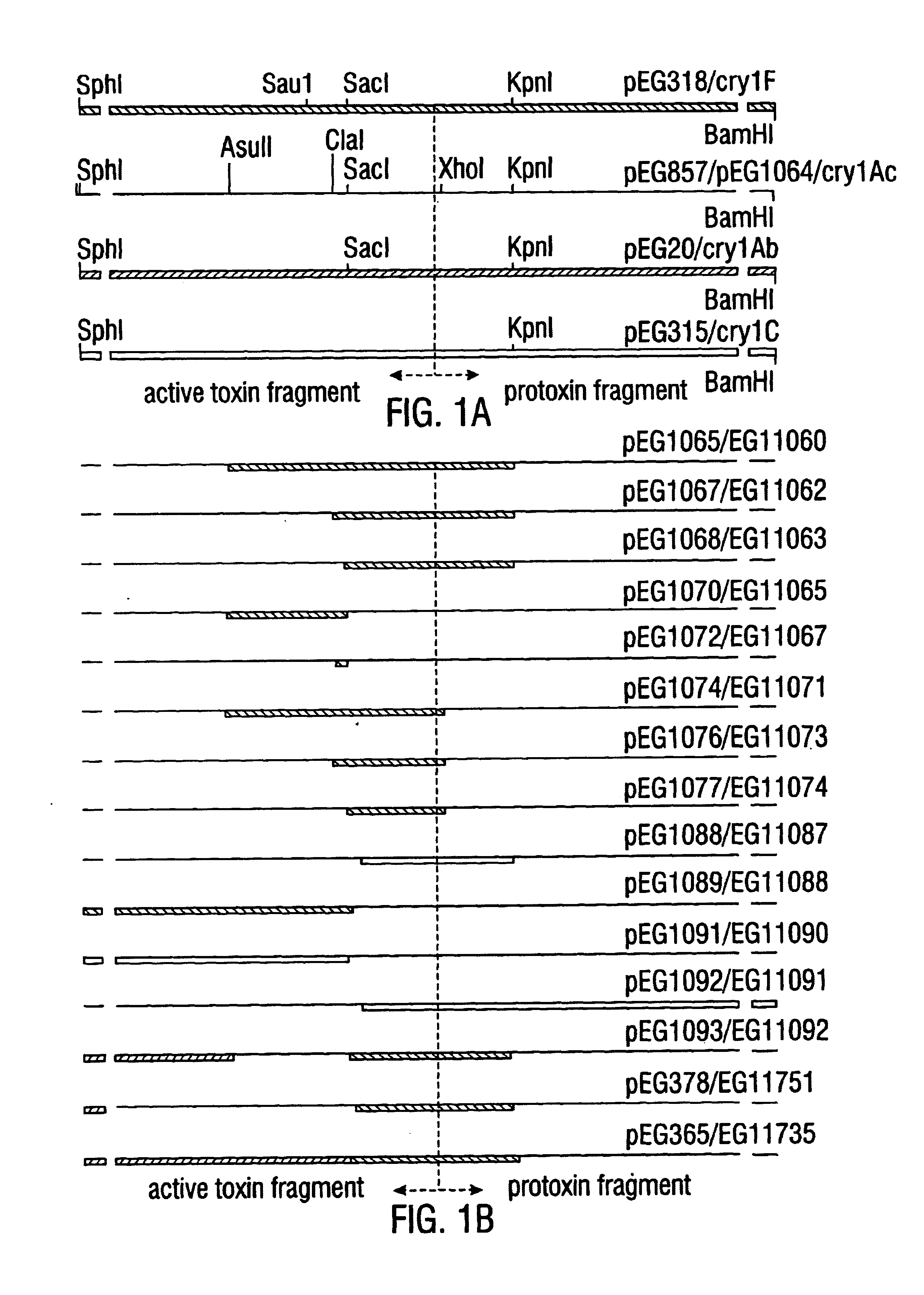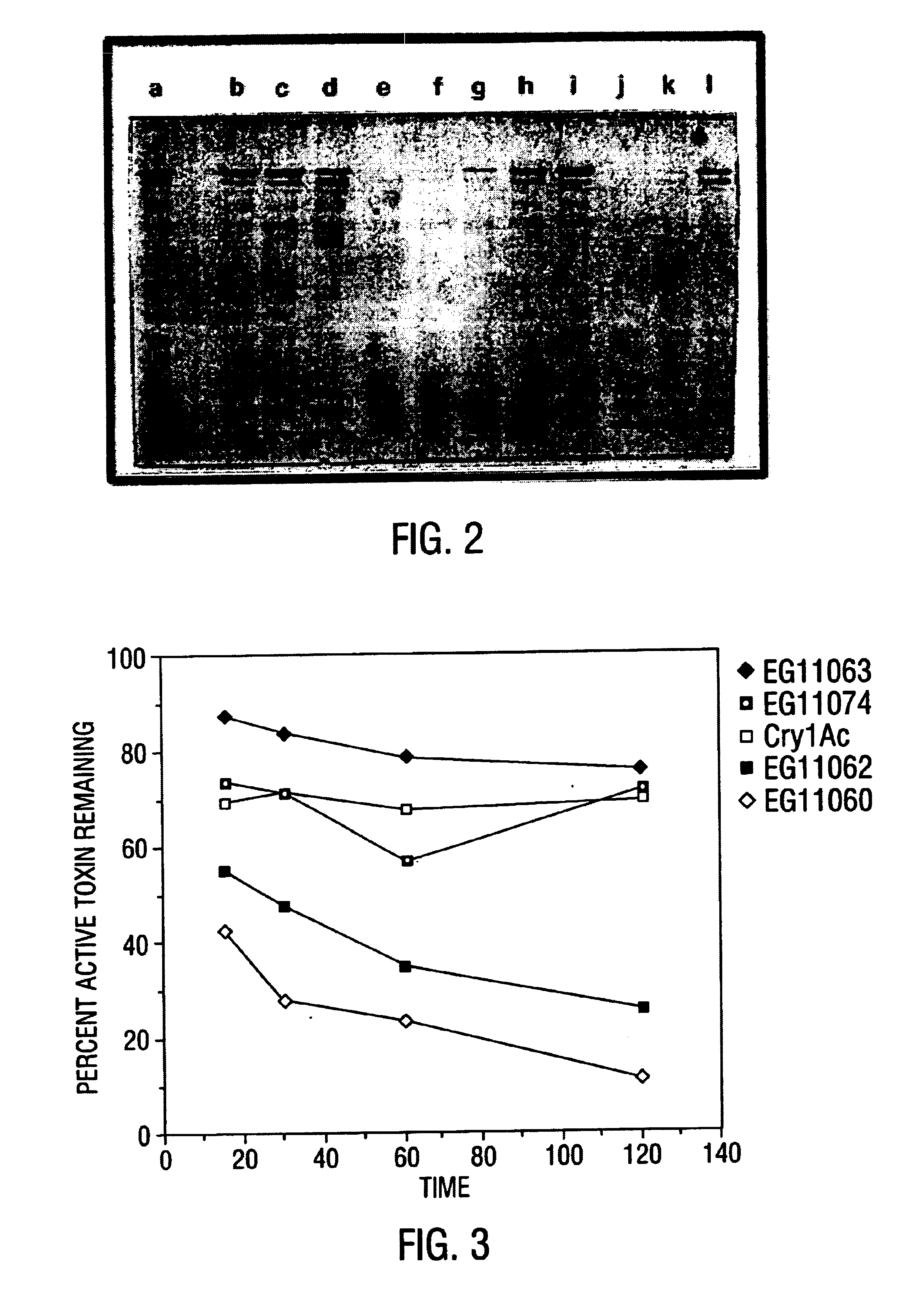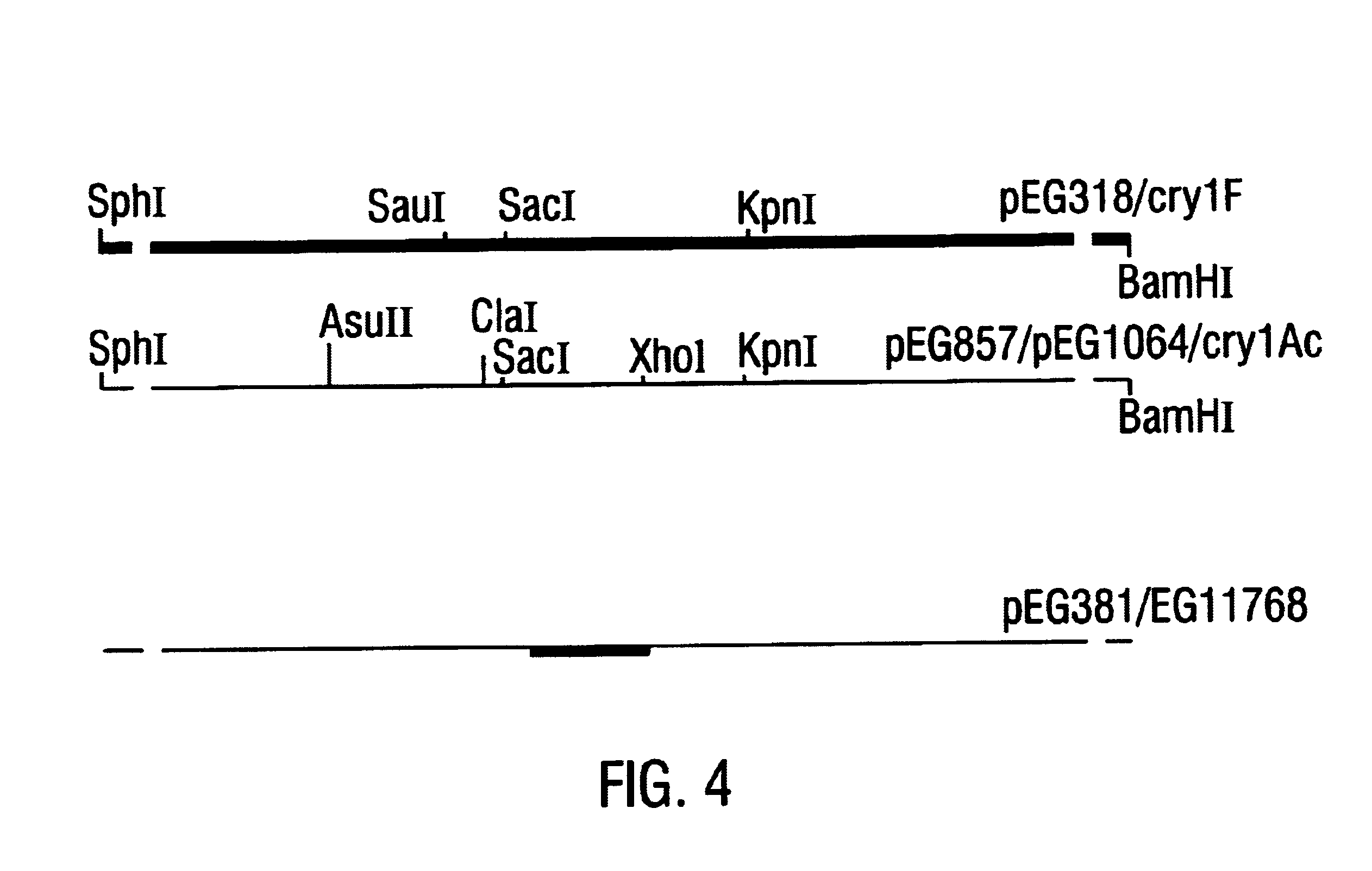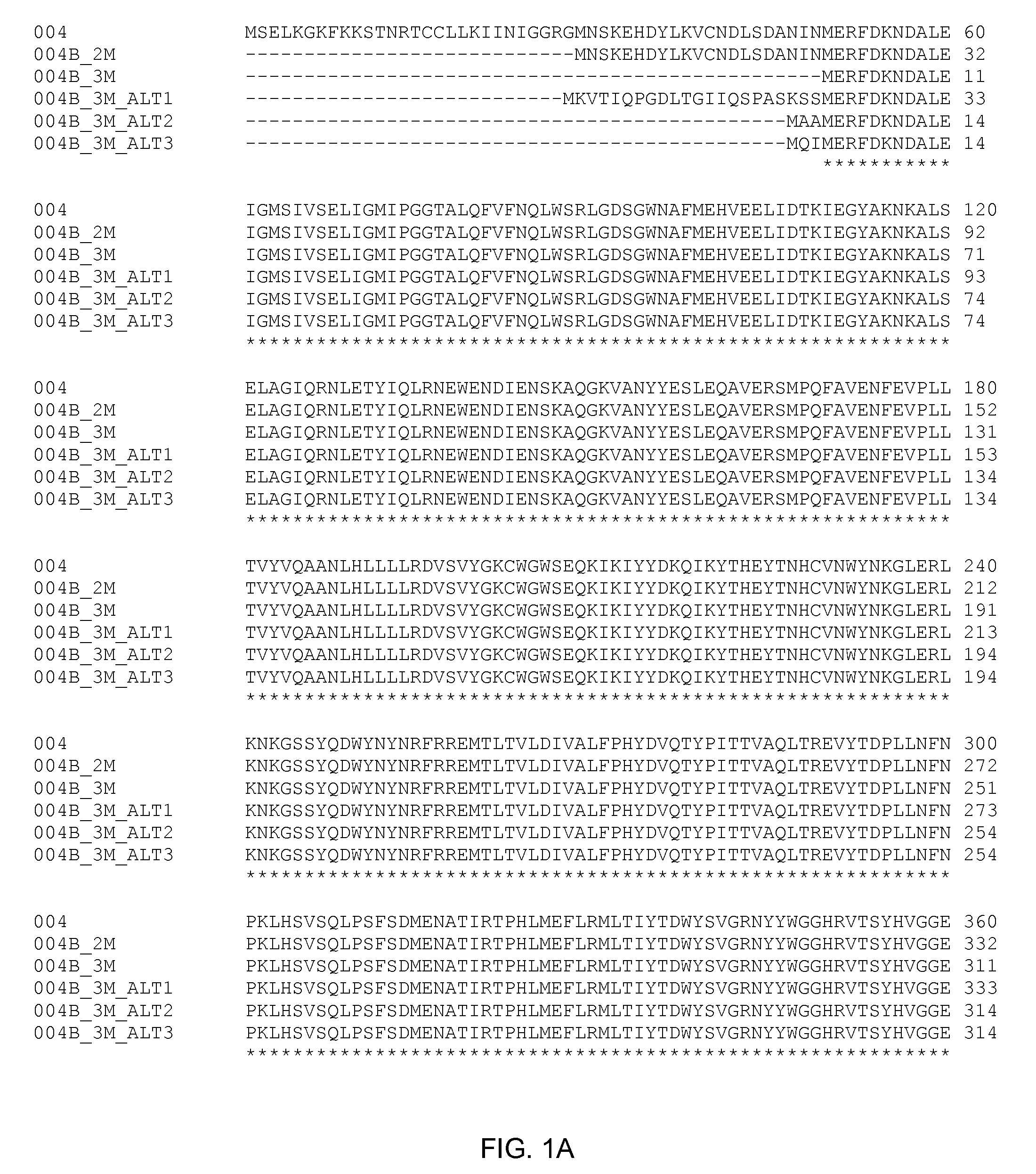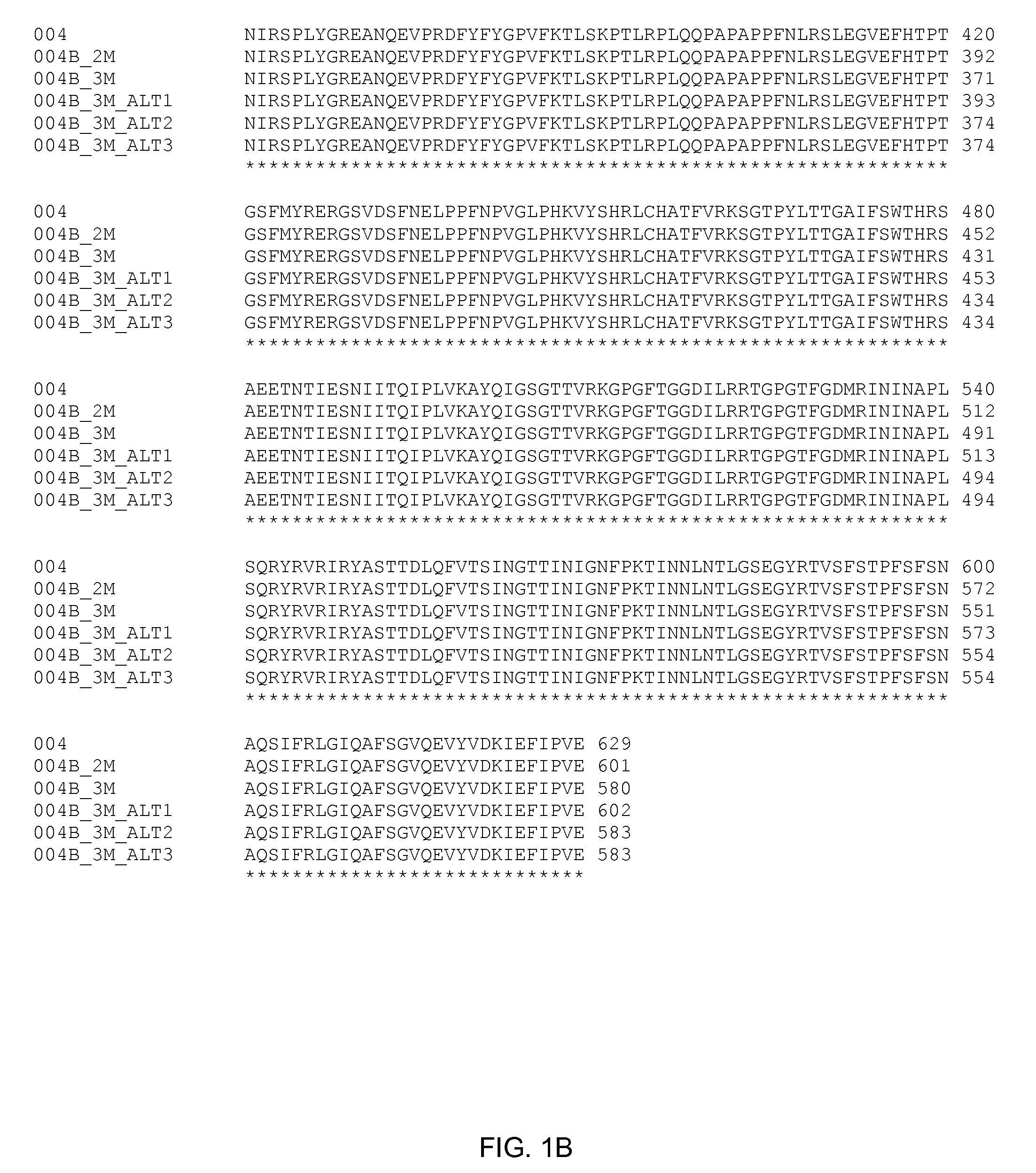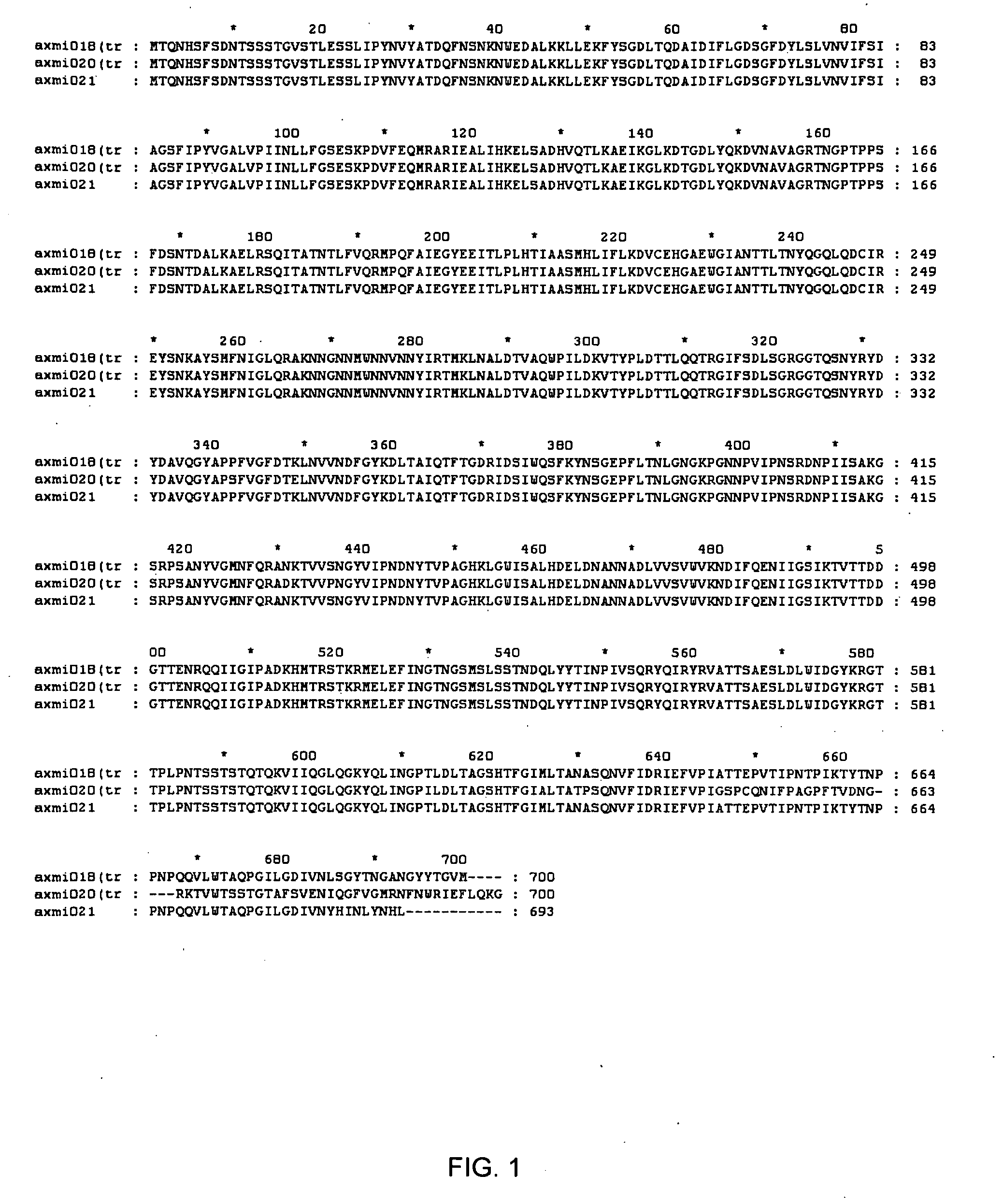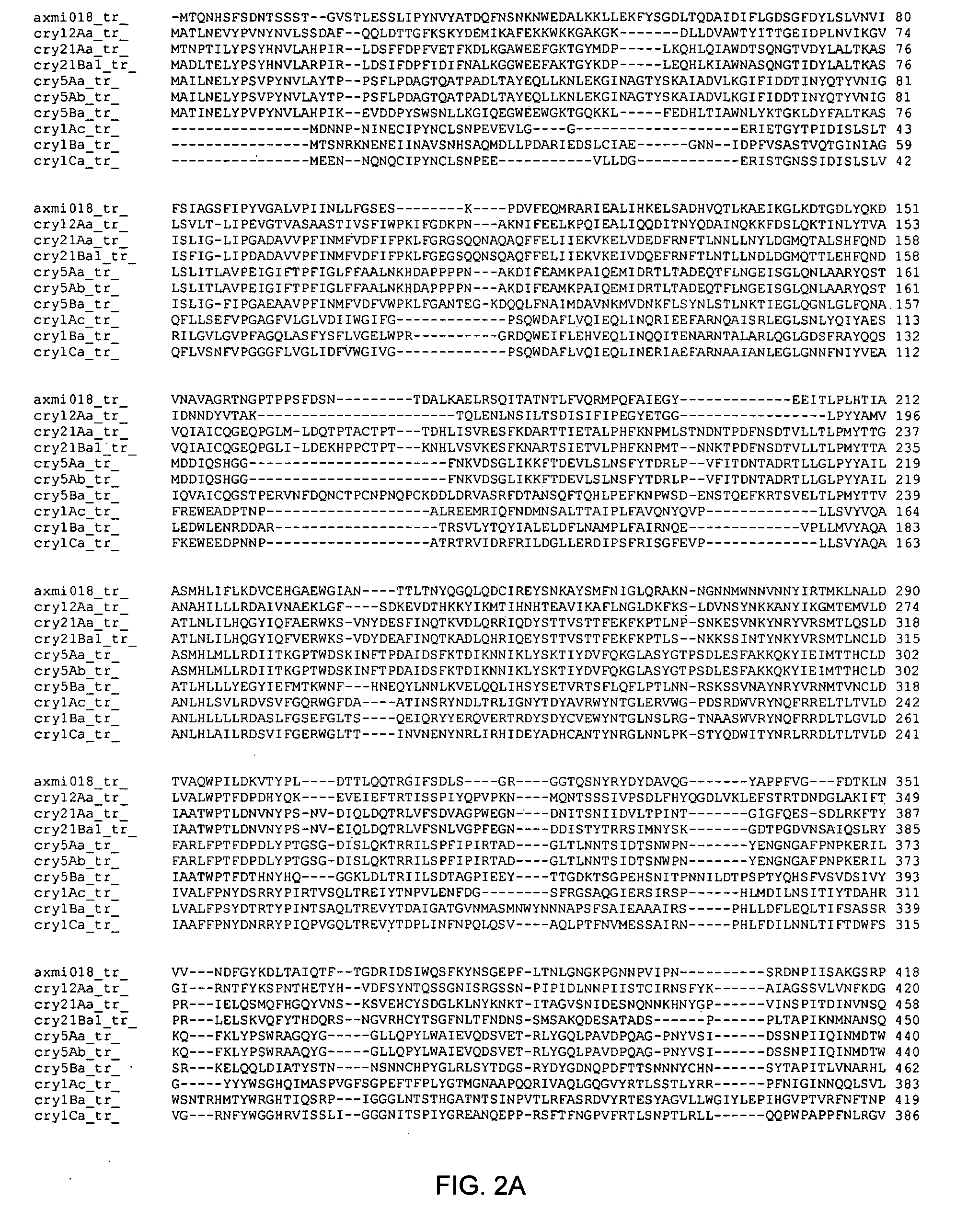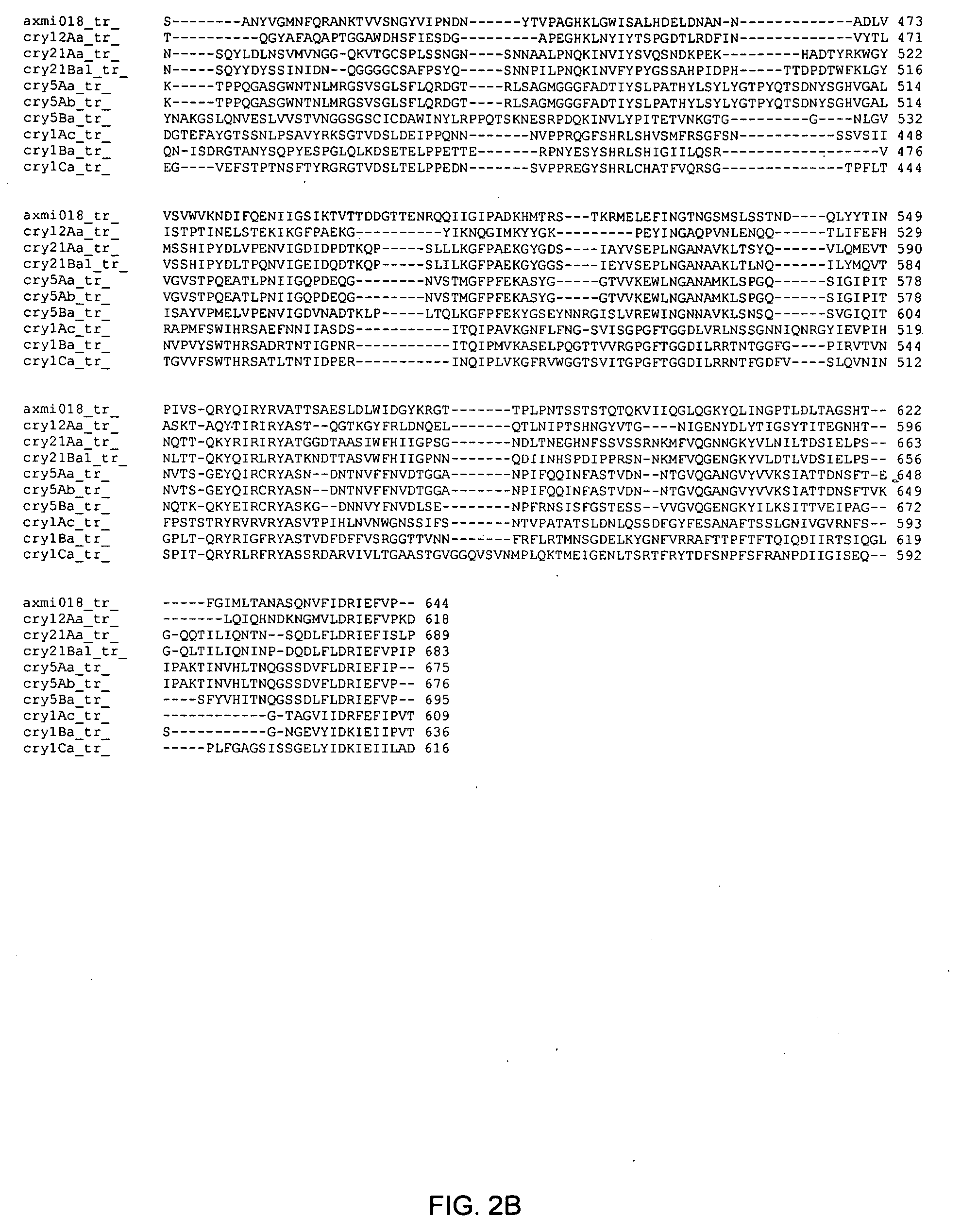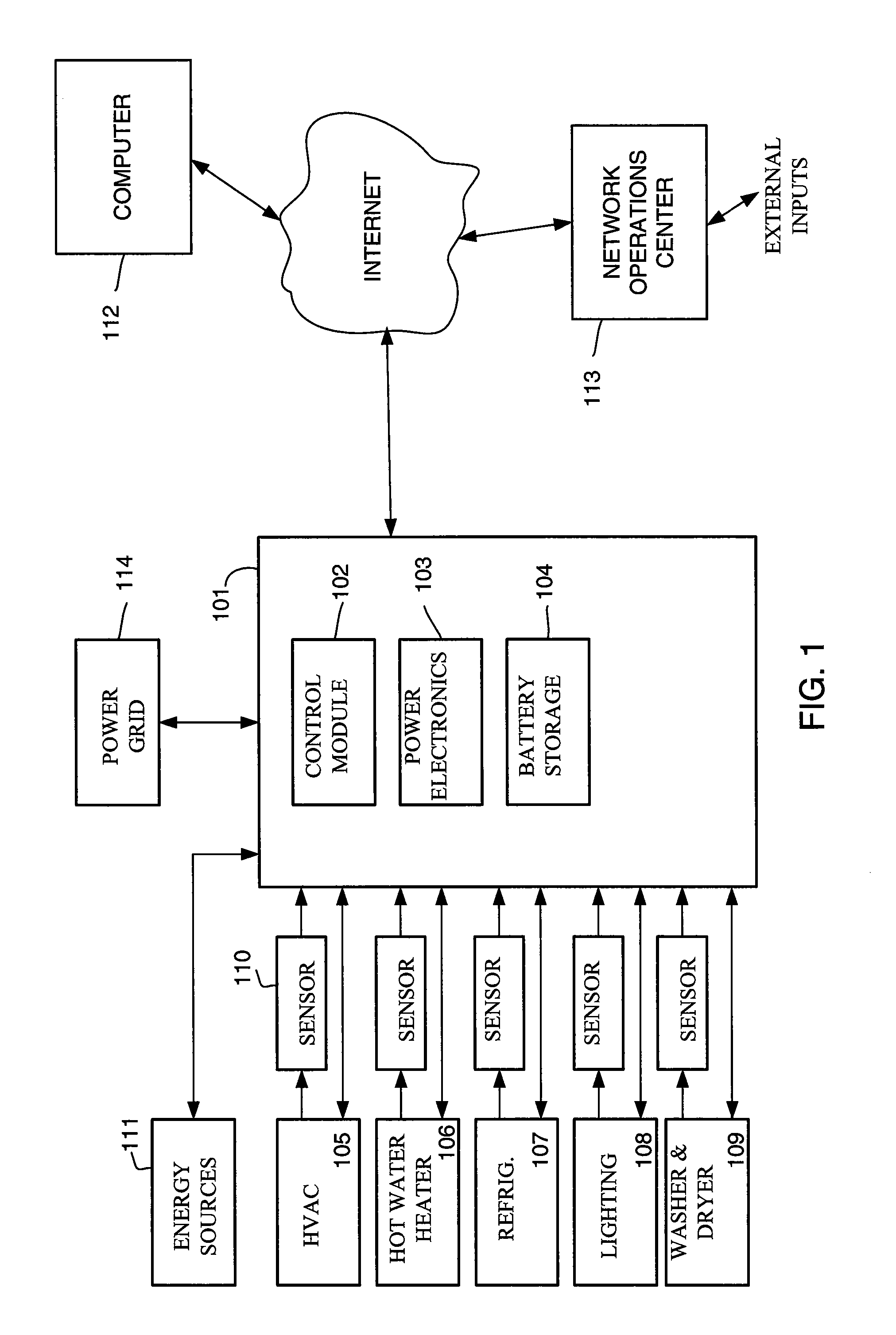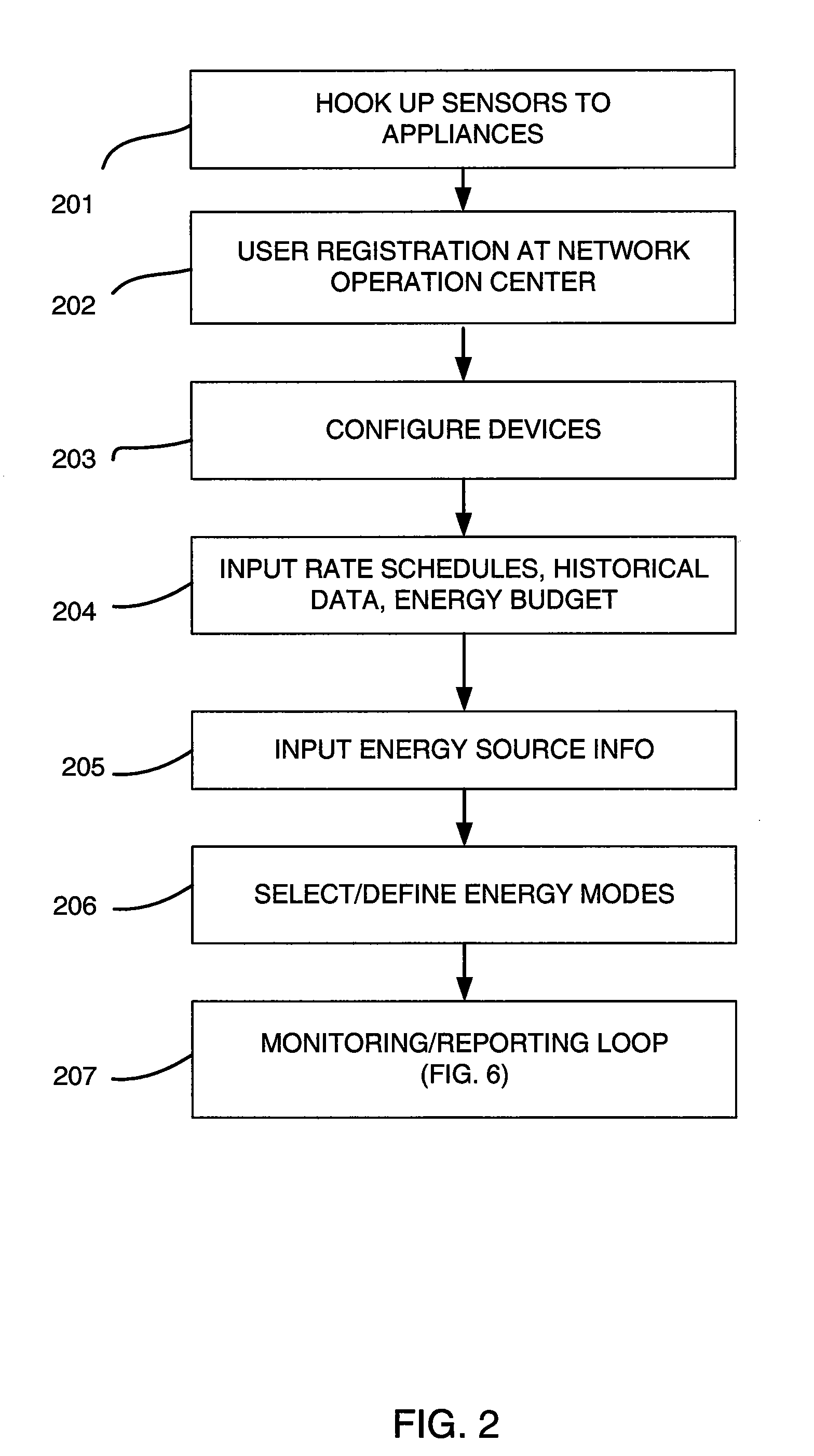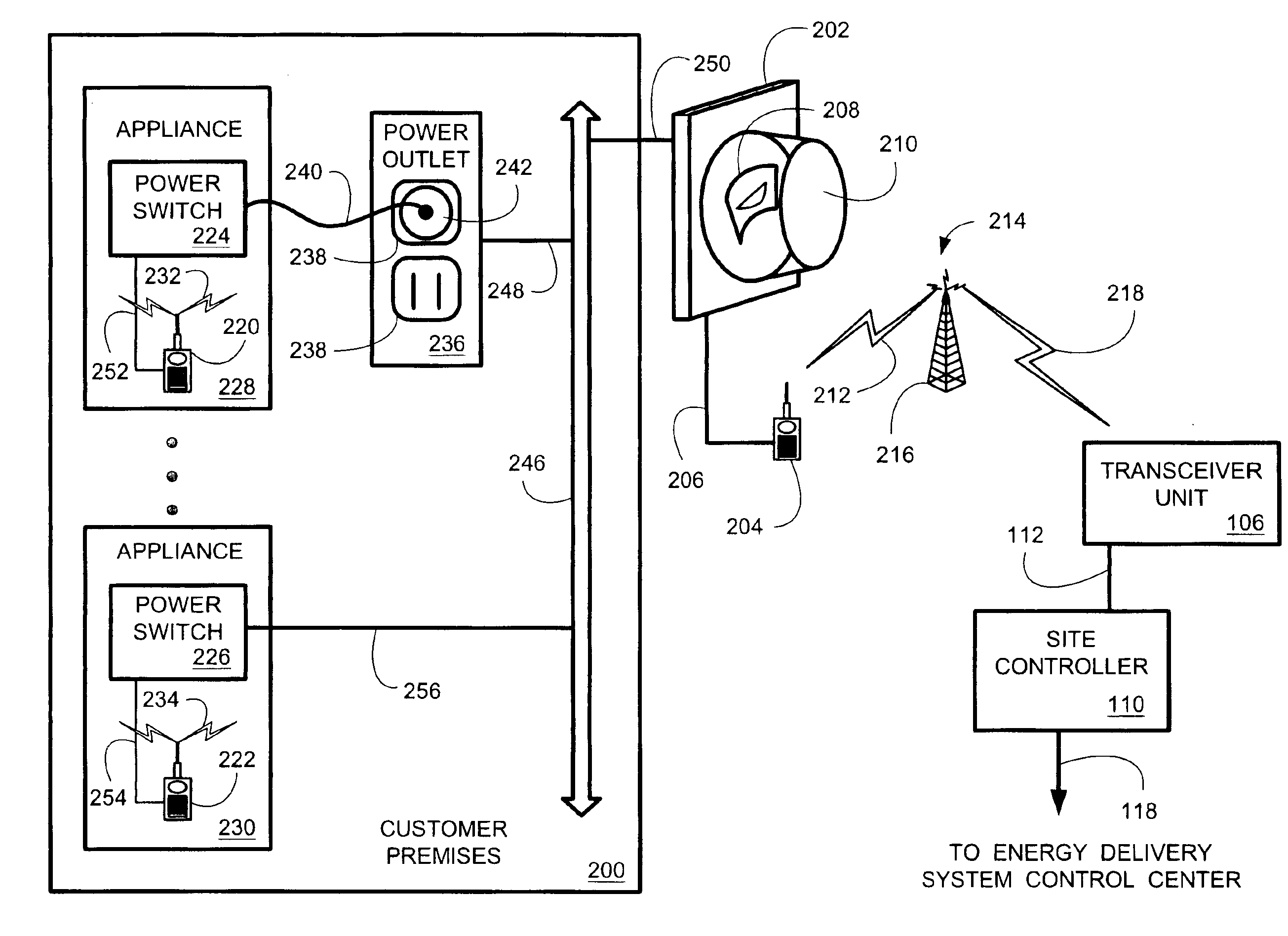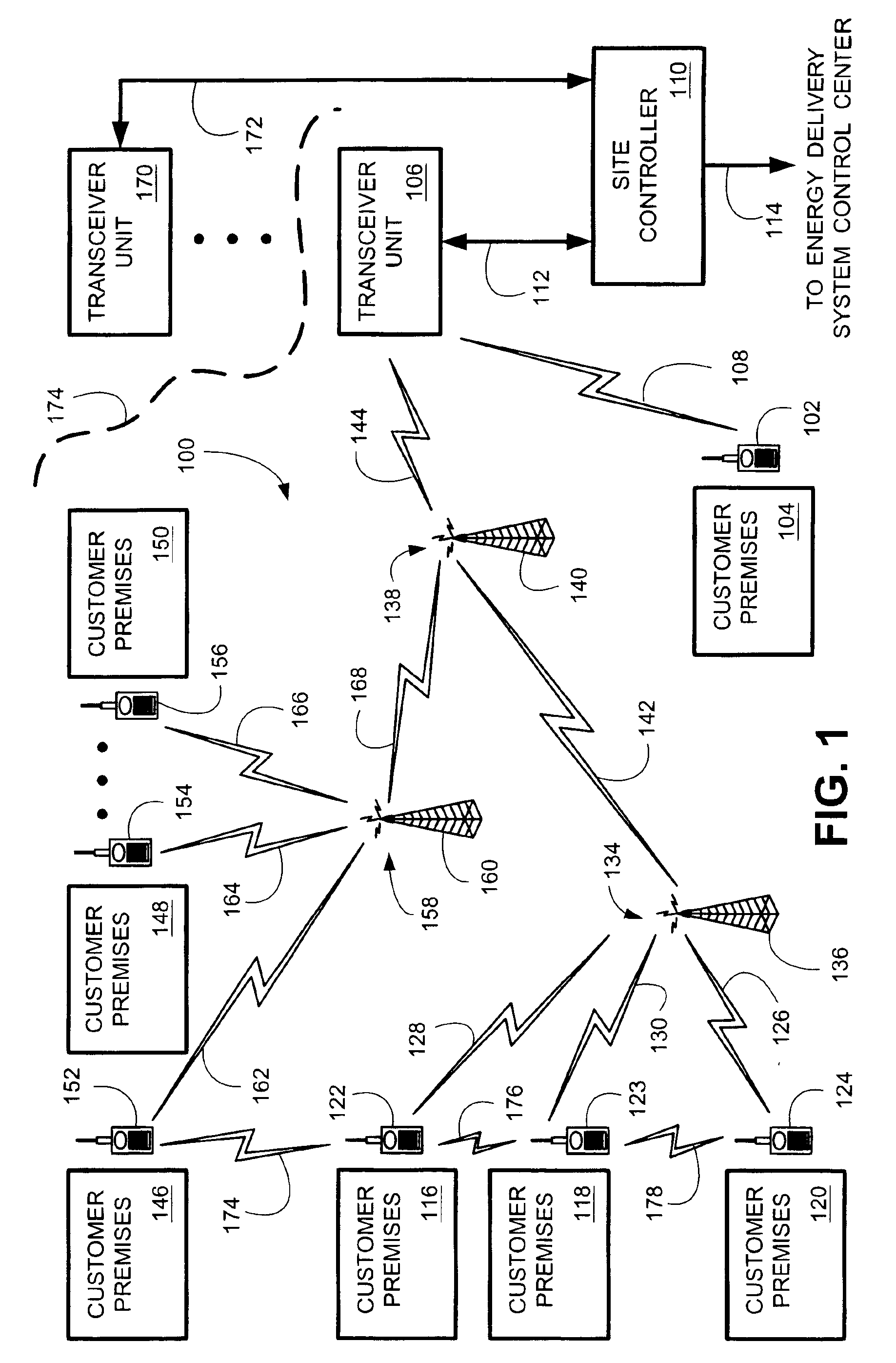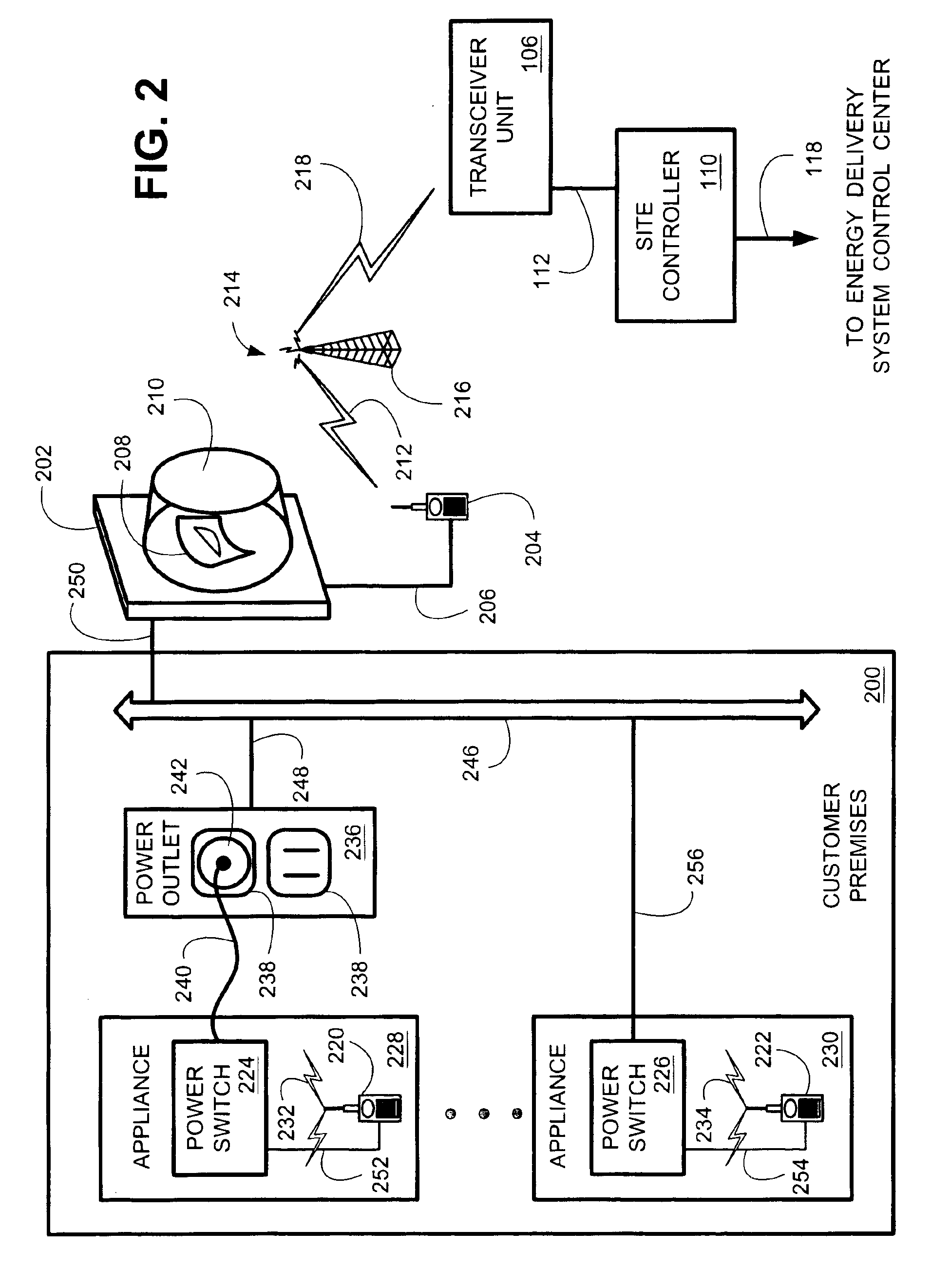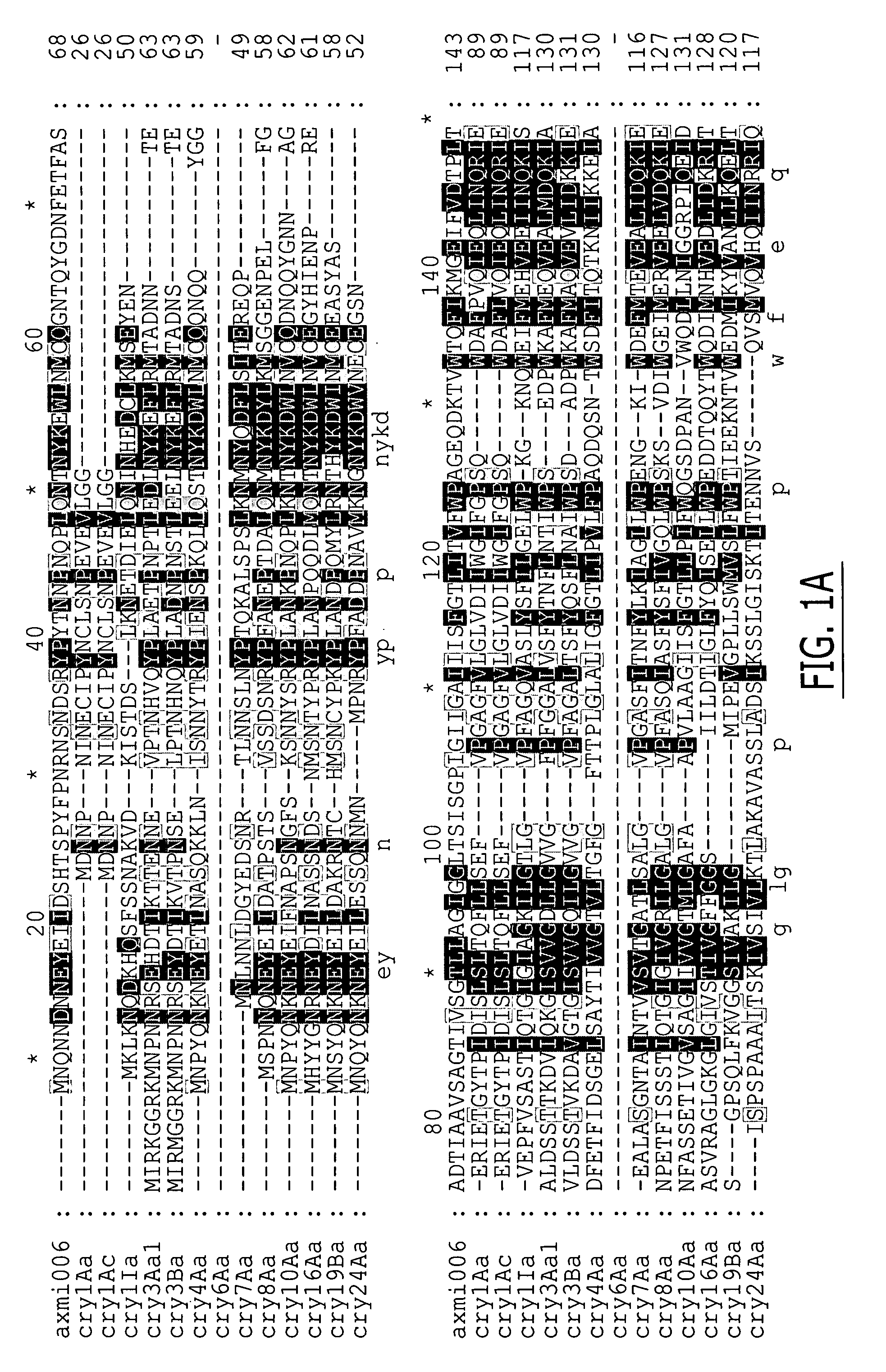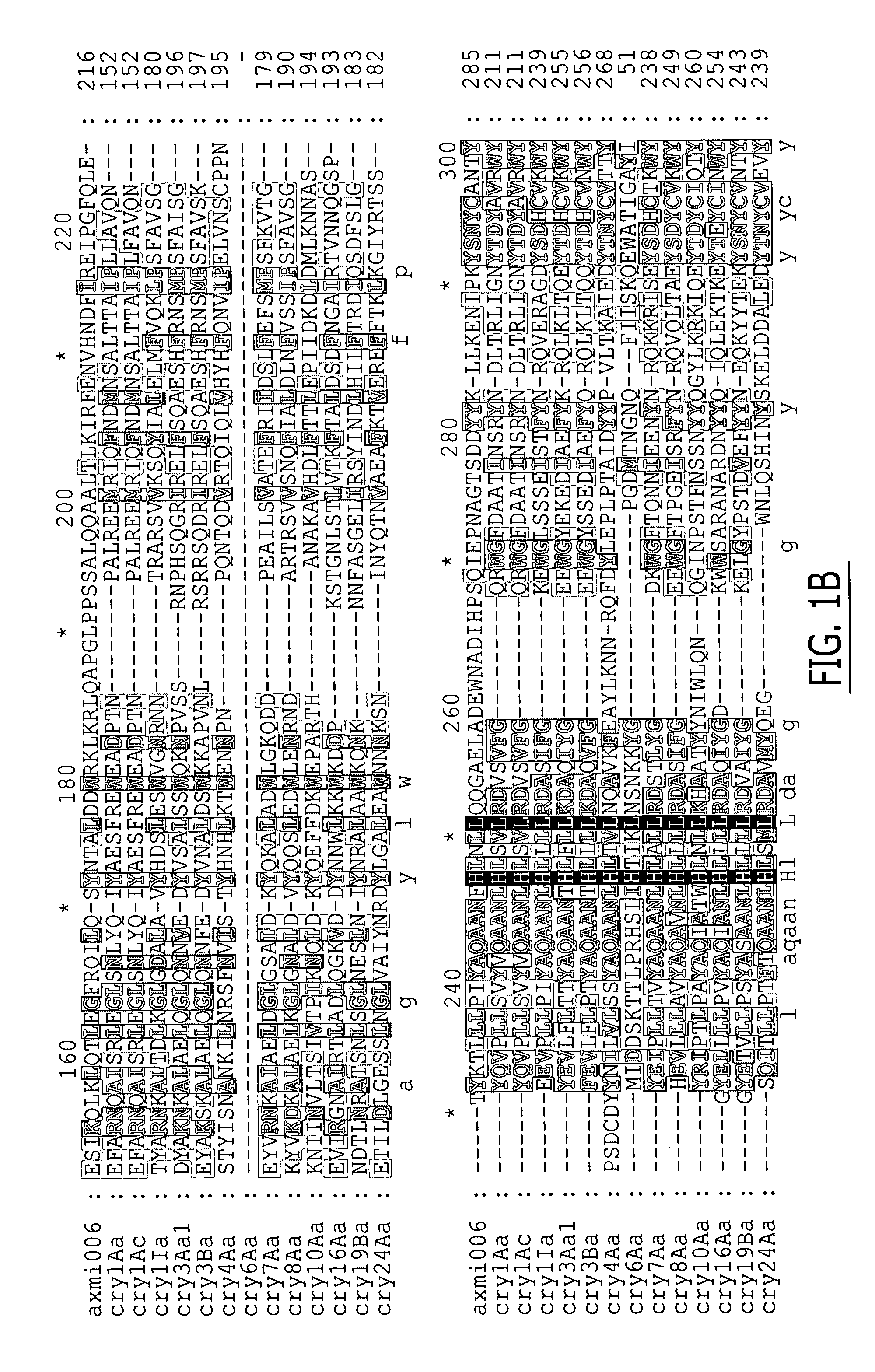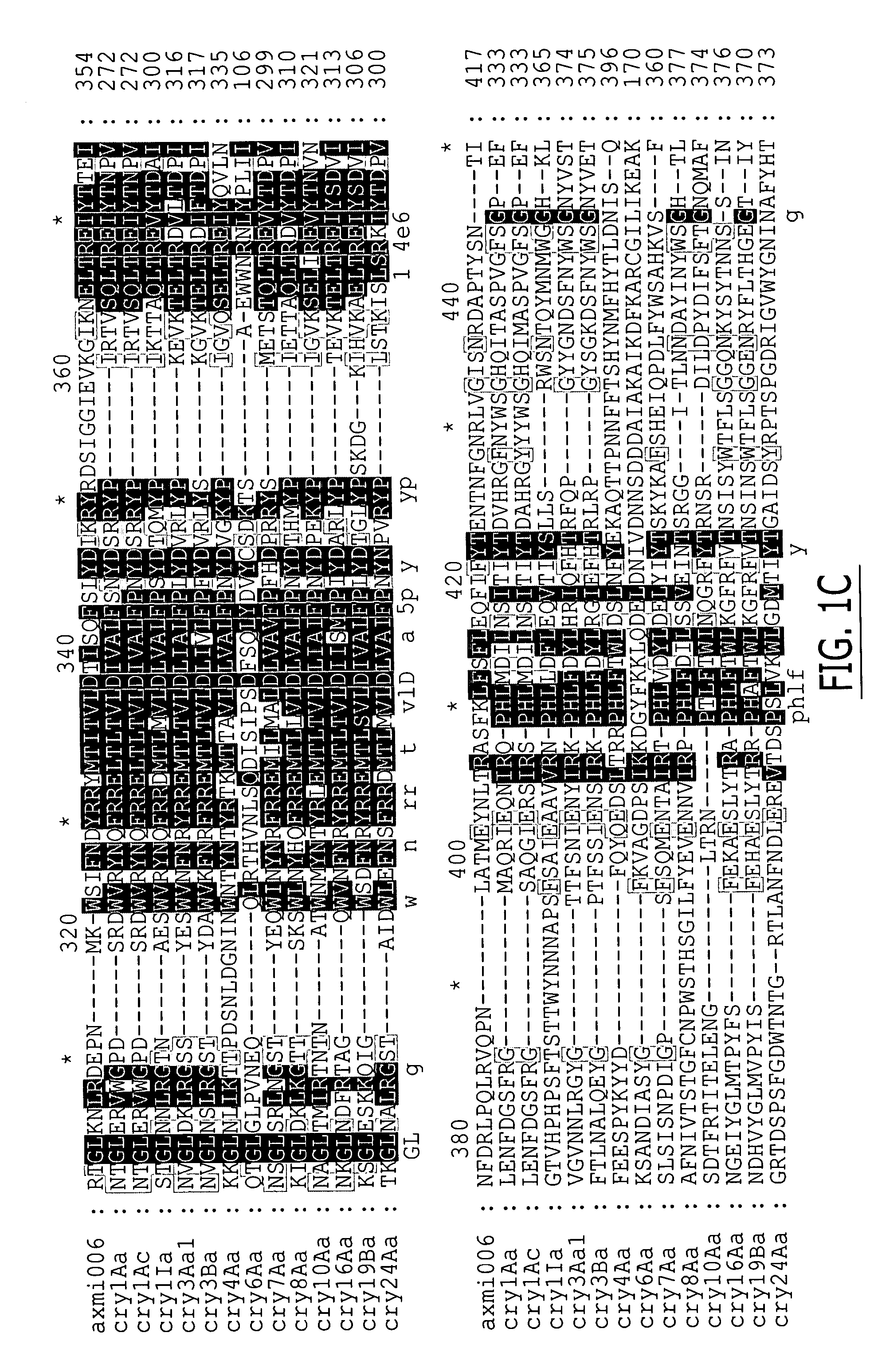Patents
Literature
117692results about "Climate change adaptation" patented technology
Efficacy Topic
Property
Owner
Technical Advancement
Application Domain
Technology Topic
Technology Field Word
Patent Country/Region
Patent Type
Patent Status
Application Year
Inventor
Method for disease control in MON89788 soybean
The present invention relates to a method to control diseases of MON89788 soybean by treatment with formulations and mixtures containing glyphosate. In particular, the formulations and mixtures are effective at controlling fungal diseases of MON89788. More specifically, the invention relates to a method to control the severity of leaf rust disease on MON89788.
Owner:MONSANTO TECH LLC
Soybean transgenic event MON 87708 and methods of use thereof
ActiveUS8501407B2Sugar derivativesMicrobiological testing/measurementPlant cellGenetically modified soybean
The invention provides a transgenic soybean event MON 87708 plant and plants, plant cells, seeds, plant parts, and commodity products derived from event MON 87708. The invention also provides polynucleotides specific for event MON 87708 and plants, plant cells, seeds, plant parts, and commodity products comprising polynucleotides specific for event MON 87708. The invention also provides methods related to event MON 87708.
Owner:MONSANTO TECH LLC
Methods and compositions for improving plant health
The present invention provides methods and compositions for improving plant health. In particular, application of dicamba or another substrate of DMO, or metabolites thereof including DCSA, to a plant confers tolerance to, or defense against, abiotic or biotic stresses such as oxidative stress including herbicide application, and plant disease, and enhances crop yield. Such application may be in combination with the application of another herbicide such as glyphosate.
Owner:MONSANTO TECH LLC
Methods and compositions for improving plant health
ActiveUS8754011B2Good for healthTolerance to oxidative stressBiocideOrganic chemistryMetaboliteGlyphosate
The present invention provides methods and compositions for improving plant health. In particular, application of dicamba or another substrate of DMO, or metabolites thereof including DCSA, to a plant confers tolerance to, or defense against, abiotic or biotic stresses such as oxidative stress including herbicide application, and plant disease, and enhances crop yield. Such application may be in combination with the application of another herbicide such as glyphosate.
Owner:MONSANTO TECH LLC
Corn event DAS-59122-7 and methods for detection thereof
The invention provides DNA compositions that relate to transgenic insect resistant maize plants. Also provided are assays for detecting the presence of the maize DAS-59122-7 event based on the DNA sequence of the recombinant construct inserted into the maize genome and the DNA sequences flanking the insertion site. Kits and conditions useful in conducting the assays are provided.
Owner:DOW AGROSCIENCES LLC
Optimization of microgrid energy use and distribution
InactiveUS20110231028A1Optimize energy distributionOptimize energy useLevel controlLoad forecast in ac networkPersonalizationMicrogrid
Systems and methods for energy optimization may receive receiving energy provider data, near-real time individualized energy usage data for each of a plurality of end-uses or near-real time individualized whole premise energy usage data, customer preferences, and near-real time and forecasted weather information. The systems and methods may forecast, for a selected time period, individualized energy usage for each of the plurality of end-uses or individualized whole premise energy usage data for a customer location using: (1) the energy provider data, (2) the near-real time individualized energy usage data, (3) the customer preferences, and (4) the near-real time and forecasted weather information. The systems and methods may optimize, for the selected time period, energy usage at the customer location using (1) the individualized energy usage, (2) the energy provider data, and (3) the customer preferences.
Owner:INTEGRAL ANALYTICS
Cry1F and Cry1AC transgenic cotton lines and event-specific identification thereof
This invention relates to plant breeding and the protection of plants from insects. More specifically, this invention includes novel transformation events of cotton plants comprising one or more polynucleotide sequences, as described herein, inserted into specific site(s) within the genome of a cotton cell. In highly preferred embodiments, said polynucleotide sequences encode “stacked” Cry1F and Cry1Ac lepidopteran insect inhibitory proteins. However, the subject invention includes plants having single cry1F or cry1Ac events, as described herein. Additionally, the invention is related to cotton plants derived from that transformation event and to assays for detecting the presence of the event in a sample. More specifically, the present invention provides DNA and related assays for detecting the presence of certain insect-resistance events in cotton. The assays are based on the DNA sequences of recombinant constructs inserted into the cotton genome and of the genomic sequences flanking the insertion sites. These sequences are unique. Based on these insert and border sequences, event-specific primers were generated. PCR analysis demonstrated that these cotton lines can be identified in different cotton genotypes by analysis of the PCR amplicons generated with these event-specific primer sets. Thus, these and other related procedures can be used to uniquely identify these cotton lines. Kits and conditions useful in conducting the assays are also provided. These materials and methods can also be used to assist breeding programs to further develop traits in cotton.
Owner:CORTEVA AGRISCIENCE LLC
Corn event pv-zmir13 (mon863) plants and compositions and methods for detection thereof
The present invention provides compositions and methods for detecting the presence of the corn event MON863 DNA inserted into the corn genome from the transformation of the recombinant construct containing a Cry3Bb gene and of genomic sequences flanking the insertion site. The present invention also provides the corn event MON863 plants, progeny and seeds thereof that contain the corn event MON863 DNA.
Owner:MONSANTO TECH LLC
Axmi-066 and axmi-076: delta-endotoxin proteins and methods for their use
InactiveUS20090144852A1Increase productionIncrease resistanceBacteriaPeptide/protein ingredientsDelta endotoxinDNA construct
Compositions and methods for conferring pesticidal activity to bacteria, plants, plant cells, tissues and seeds are provided. Compositions comprising a coding sequence for pesticidal polypeptides are provided. The coding sequences can be used in DNA constructs or expression cassettes for transformation and expression in plants and bacteria. Compositions also comprise transformed bacteria, plants, plant cells, tissues, and seeds. In particular, isolated pesticidal nucleic acid molecules are provided. Additionally, amino acid sequences corresponding to the polynucleotides are encompassed. In particular, the present invention provides for isolated nucleic acid molecules comprising nucleotide sequences encoding the amino acid sequence shown in SEQ ID NO:5, 2, or 10, the nucleotide sequence set forth in SEQ ID NO:4, 1, 3, 4, 6, 9, or 11, or the nucleotide sequence deposited in a bacterial host as Accession No. B-50045, as well as variants and fragments thereof.
Owner:ATHENIX
Toxin genes and methods for their use
Compositions and methods for conferring pesticidal activity to bacteria, plants, plant cells, tissues and seeds are provided. Compositions comprising a coding sequence for a delta-endotoxin polypeptide are provided. The coding sequences can be used in DNA constructs or expression cassettes for transformation and expression in plants and bacteria. Compositions also comprise transformed bacteria, plants, plant cells, tissues, and seeds. In particular, isolated delta-endotoxin nucleic acid molecules are provided. Additionally, amino acid sequences corresponding to the polynucleotides are encompassed, and antibodies specifically binding to those amino acid sequences. In particular, the present invention provides for isolated nucleic acid molecules comprising nucleotide sequences encoding the amino acid sequence shown in SEQ ID NO:61-121 and 133-141, or the nucleotide sequence set forth in SEQ ID NO:1-60, 124-132, and 142-283, as well as variants and fragments thereof.
Owner:BASF AGRICULTURAL SOLUTIONS SEED LLC
Soybean Plant And Seed Corresponding To Transgenic Event MON87701 And Methods For Detection Thereof
The present invention provides a transgenic soybean event MON87701, and cells, seeds, and plants comprising DNA diagnostic for the soybean event. The invention also provides compositions comprising nucleotide sequences that are diagnostic for said soybean event in a biological sample, probes and primers for use in detecting nucleotide sequences that are diagnostic for the presence of said soybean event in a biological sample, and methods for detecting the presence of said soybean event nucleotide sequences in a biological sample. The invention further provides methods of growing the seeds of such soybean event into soybean plants, and methods of breeding to produce soybean plants comprising DNA diagnostic for the soybean event.
Owner:MONSANTO TECH LLC
Polypeptide compositions toxic to diabrotic insects, and methods of use
InactiveUS6468523B1Easy to storeInhibit microbial growthBiocidePeptide/protein ingredientsDelta endotoxinPolynucleotide
Disclosed is a novel Lepidopteran- and Coleopteran-active delta-endotoxin polypeptide, and compositions comprising the polypeptide, peptide fragments thereof, and antibodies specific therefor. Also disclosed are vectors, transformed host cells, and transgenic plants that comprise nucleic acid segments encoding the polypeptide. Also disclosed are methods of identifying related polypeptides and polynucleotides, methods of making and using transgenic cells comprising the novel sequences of the invention, as well as methods for controlling an insect population, such as the Western Corn Rootworm and Colorado potato beetle, and for conferring to a plant population resistance to the target insect species.
Owner:MONSANTO TECH LLC
Diagnostic radio frequency identification sensors and applications thereof
ActiveUS20060290496A1Low costDevices with bluetooth interfacesBurglar alarm mechanical actuationPower sensorPoint of care
An integrated passive wireless chip diagnostic sensor system is described that can be interrogated remotely with a wireless device such as a modified cell phone incorporating multi-protocol RFID reader capabilities (such as the emerging Gen-2 standard) or Bluetooth, providing universal easy to use, low cost and immediate quantitative analyses, geolocation and sensor networking capabilities to users of the technology. The present invention can be integrated into various diagnostic platforms and is applicable for use with low power sensors such as thin films, MEMS, electrochemical, thermal, resistive, nano or microfluidic sensor technologies. Applications of the present invention include on-the-spot medical and self-diagnostics on smart skin patches, Point of Care (POC) analyses, food diagnostics, pathogen detection, disease-specific wireless biomarker detection, remote structural stresses detection and sensor networks for industrial or Homeland Security using low cost wireless devices such as modified cell phones.
Owner:ALTIVERA
Corn Plant and Seed Corresponding to Transgenic Event MON89034 and Methods For Detection and Use Thereof
ActiveUS20080260932A1Microbiological testing/measurementClimate change adaptationNucleotideNucleotide sequencing
The present invention provides a transgenic corn event MON89034, and cells, seeds, and plants comprising DNA diagnostic for the corn event. The invention also provides compositions comprising nucleotide sequences that are diagnostic for said corn event in a sample, methods for detecting the presence of said corn event nucleotide sequences in a sample, probes and primers for use in detecting nucleotide sequences that are diagnostic for the presence of said corn event in a sample, growing the seeds of such corn event into corn plants, and breeding to produce corn plants comprising DNA diagnostic for the corn event.
Owner:MONSANTO TECH LLC
Axmi-115, axmi-113, axmi-005, axmi-163 and axmi-184: insecticidal proteins and methods for their use
ActiveUS20100004176A1Confer resistanceProduct can be usedBiocidePeptide/protein ingredientsDelta endotoxinDNA construct
Compositions and methods for conferring insecticidal activity to host cells are provided. Compositions comprising a coding sequence for a delta-endotoxin polypeptide are provided. The coding sequences can be used in DNA constructs or expression cassettes for transformation and expression in host cells. Compositions also comprise transformed host cells. In particular, isolated delta-endotoxin nucleic acid molecules are provided. Additionally, amino acid sequences corresponding to the polynucleotides are encompassed, and antibodies specifically binding to those amino acid sequences. In particular, the present invention provides for isolated nucleic acid molecules comprising nucleotide sequences encoding the amino acid sequence shown in SEQ ID NO:4, 5, 6, 13, or 14, or the nucleotide sequence set forth in SEQ ID NO:1, 2, 3, 11, or 12, as well as variants and fragments thereof.
Owner:BASF AGRICULTURAL SOLUTIONS SEED LLC
Recombinant DNA constructs and methods for controlling gene expression
InactiveUS20060200878A1Reduce accumulationClimate change adaptationOther foreign material introduction processesBiotechnologyHeterologous
The present invention provides molecular constructs and methods for use thereof, including constructs including heterologous miRNA recognition sites, constructs for gene suppression including a gene suppression element embedded within an intron flanked on one or on both sides by non-protein-coding sequence, constructs containing engineered miRNA or miRNA precursors, and constructs for suppression of production of mature microRNA in a cell. Also provided are transgenic plant cells, plants, and seeds containing such constructs, and methods for their use. The invention further provides transgenic plant cells, plants, and seeds containing recombinant DNA for the ligand-controlled expression of a target sequence, which may be endogenous or exogenous. Also disclosed are novel miRNAs and miRNA precursors from crop plants including maize and soy.
Owner:MONSANTO TECH LLC
Insect resistant cotton plants and methods for identifying same
ActiveUS20100077501A1Superior agronomic phenotypeMicrobiological testing/measurementClimate change adaptationGenomeAgronomy
The invention provides specific transgenic cotton plants, plant material and seeds, characterized in that these products harbor a specific transformation event at a specific location in the cotton genome. Tools are also provided which allow rapid and unequivocal identification of the event in biological samples.
Owner:BASF AGRICULTURAL SOLUTIONS SEED LLC
Soybean Transgenic Event MON87705 and Methods for Detection Thereof
ActiveUS20100080887A1Sugar derivativesMicrobiological testing/measurementBiotechnologyGenetically modified soybean
The present invention provides a transgenic soybean event MON87705, and cells, seeds, and plants comprising DNA diagnostic for the soybean event. The invention also provides compositions comprising nucleotide sequences that are diagnostic for said soybean event in a sample, methods for detecting the presence of said soybean event nucleotide sequences in a sample, probes and primers for use in detecting nucleotide sequences that are diagnostic for the presence of said soybean event in a sample, growing the seeds of such soybean event into soybean plants, and breeding to produce soybean plants comprising DNA diagnostic for the soybean event.
Owner:MONSANTO TECH LLC
Distributed maximum power point tracking system, structure and process
ActiveUS20080238195A1Sure easyExtended operating timeBatteries circuit arrangementsConversion with intermediate conversion to dcNuclear engineeringControl system
Distributed maximum power point tracking systems, structures, and processes are provided for power generation structures, such as for but not limited to a solar panel arrays. In an exemplary solar panel string structure, distributed maximum power point tracking (DMPPT) modules are provided, such as integrated into or retrofitted for each solar panel. The DMPPT modules provide panel level control for startup, operation, monitoring, and shutdown, and further provide flexible design and operation for strings of multiple panels. The strings are typically linked in parallel to a combiner box, and then toward and enhanced inverter module, which is typically connected to a power grid. Enhanced inverters are controllable either locally or remotely, wherein system status is readily determined, and operation of one or more sections of the system are readily controlled. The system provides increased operation time, and increased power production and efficiency, over a wide range of operating conditions.
Owner:SOLAREDGE TECH LTD
Bollworm insect resistance management in transgenic plants
InactiveUS20090313717A1Prevent and delay resistance developmentPreventing and delaying insect resistance developmentClimate change adaptationGenetic engineeringHelicoverpaHelicoverpa zea
This invention relates to the use of a combination of different proteins insecticidal to Helicoverpa zea or Helicoverpa armigerain an insect resistance management process, wherein such proteins are: a) a Cry2A protein such as Cry2Aa, Cry2Ab, or Cry2Ae and b) a Cry1A, Cry1F or VIP3A protein, particularly wherein such proteins binds saturably to the insect midgut membrane of Helicoverpa zea or Helicoverpa armigera, as well as plants and seeds expressing such combination of proteins, which are used to delay or prevent the development of resistance in populations of such insect species.
Owner:BAYER BIOSCIENCE N V
Broad-spectrum delta-endotoxins
InactiveUS6713063B1Improved insecticidal activity and broader host-range activityImproving immunogenicityBiocidePeptide/protein ingredientsAureobasidium sp.Toxin
Disclosed are novel synthetically-modified B. thuringiensis chimeric crystal proteins having improved insecticidal activity and broader insect host range against coleopteran, dipteran and lepidopteran insects. Also disclosed are the nucleic acid segments encoding these novel peptides. Methods of making and using these genes and proteins are disclosed as well as methods for the recombinant expression, and transformation of suitable host cells. Transformed host cells and transgenic plants expressing the modified endotoxin are also aspects of the invention.
Owner:MONSANTO TECH LLC
Synthetic genes encoding cry1ac
Compositions and methods for conferring pesticidal activity to bacteria, plants, plant cells, tissues and seeds are provided. Compositions containing a synthetic nucleotide sequence encoding a Cry1Ac protein are provided. The coding sequences can be used in DNA constructs or expression cassettes for transformation and expression in plants and bacteria. Compositions also include transformed bacteria, plants, plant cells, tissues, and seeds. In particular, isolated pesticidal nucleic acid molecules are provided, wherein the nucleotide sequences are set forth in SEQ ID NO:1, 2, 3, 4, 5 or 6, as well as variants and fragments thereof.
Owner:ATHENIX
Synthetic axmi-004 delta-endotoxin genes and methods for their use
Compositions and methods for conferring pesticidal activity to bacteria, plants, plant cells, tissues and seeds are provided. Compositions comprising a coding sequence for a delta-endotoxin polypeptide are provided, particularly synthetically-derived coding sequences. The coding sequences can be used in DNA constructs or expression cassettes for transformation and expression in plants and bacteria. Compositions also comprise transformed bacteria, plants, plant cells, tissues, and seeds. In particular, isolated delta-endotoxin nucleic acid molecules are provided. Additionally, amino acid sequences corresponding to the polynucleotides are encompassed, and antibodies specifically binding to those amino acid sequences. In particular, the present invention provides for isolated nucleic acid molecules comprising nucleotide sequences encoding the amino acid sequence shown in SEQ ID NO:9, 11, 13, 15, or 18, or the nucleotide sequence set forth in SEQ ID NO:1, 2, 4, 6, 7, 8, 10, 12, 14, 16, or 17, as well as variants and fragments thereof.
Owner:BASF AGRICULTURAL SOLUTIONS SEED LLC
Axmi-018, axmi-020, and axmi-021, a family of delta-endotoxin genes and methods for their use
Compositions and methods for conferring pesticidal activity to bacteria, plants, plant cells, tissues and seeds are provided. Compositions comprising a coding sequence for a delta-endotoxin polypeptide are provided. The coding sequences can be used in DNA constructs or expression cassettes for transformation and expression in plants and bacteria. Compositions also comprise transformed bacteria, plants, plant cells, tissues, and seeds. In particular, isolated delta-endotoxin nucleic acid molecules are provided. Additionally, amino acid sequences corresponding to the polynucleotides are encompassed. In particular, the present invention provides for isolated nucleic acid molecules comprising nucleotide sequences encoding the amino acid sequence shown in SEQ ID NO:2, 4, or 6, or the nucleotide sequence set forth in SEQ ID NO:1, 3, or 5, as well as variants and fragments thereof.
Owner:ATHENIX
Energy budget manager
A method of monitoring energy consumption includes steps of establishing an energy budget for a future time period, receiving device information for a plurality of electrical devices and associating the device information with the energy budget, periodically measuring electrical usage from the plurality of electrical devices, projecting future energy consumption for the future time period based on the measured electrical usage, comparing the projected future energy consumption to the energy budget, and if the projected future energy consumption deviates from the energy budget, automatically generating an alert. The projected future energy consumption can take into account various factors such as energy available from non-grid sources; weather forecasts; battery storage; and historical data. A system employing the method can automatically control devices to bring predicted consumption within the budget.
Owner:GRIDPOINT
System and method for controlling power demand over an integrated wireless network
An intelligent network demand control system provides a system and method for controlling demand in an energy delivery system. Various embodiments of the intelligent network demand control system employs a transceiver network with a plurality transceivers coupled to meters and appliances residing at a plurality of customer premises. Control room operators instruct a customer premises (CP) energy management controller to implement a reduction in system demand. A demand reduction control signal is relayed out to a predefined group of transceivers to bring their respective controlled generators on line. The predefined transceivers, identified by their identification codes, are specified in the demand reduction control signal. The actual demand reduction is metered and relayed back to the CP energy management controller. In some embodiments, the total demand reduction is aggregated into a single number and then communicated to the operators.
Owner:LANDISGYR TECH
AXMI-006, a delta-endotoxin gene and methods for its use
Compositions and methods for conferring pesticidal activity to bacteria, plants, plant cells, tissues and seeds are provided. Compositions comprising a coding sequence for a delta-endotoxin polypeptide are provided. The coding sequences can be used in DNA constructs or expression cassettes for transformation and expression in plants and bacteria. Compositions also comprise transformed bacteria, plants, plant cells, tissues, and seeds. In particular, isolated delta-endotoxin nucleic acid molecules are provided. Additionally, amino acid sequences corresponding to the polynucleotides are encompassed. In particular, the present invention provides for isolated nucleic acid molecules comprising nucleotide sequences encoding the amino acid sequence shown in SEQ ID NO:2 and the nucleotide sequence set forth in SEQ ID NO:1, as well as variants and fragments thereof.
Owner:ATHENIX
Axmi-031, axmi-039, axmi-040 and axmi-049, a family of novel delta-endotoxin genes and methods for their use
Compositions and methods for conferring pesticidal activity to bacteria, plants, plant cells, tissues and seeds are provided. Compositions comprising a coding sequence for a delta-endotoxin polypeptide are provided. The coding sequences can be used in DNA constructs or expression cassettes for transformation and expression in plants and bacteria. Compositions also comprise transformed bacteria, plants, plant cells, tissues, and seeds. In particular, isolated delta-endotoxin nucleic acid molecules are provided. Additionally, amino acid sequences corresponding to the polynucleotides are encompassed, and antibodies specifically binding to those amino acid sequences. In particular, the present invention provides for isolated nucleic acid molecules comprising nucleotide sequences encoding the amino acid sequence shown in SEQ ID NO:2, 4, 6, 8, 10, 12, 15, 17, 19, 21, 23, 25, 27, 29, 31, 33, 35, or 38, or the nucleotide sequence set forth in SEQ ID NO:1, 3, 5, 7, 9, 11, 14, 16, 18, 20, 22, 24, 26, 28, 30, 32, 34, or 37, as well as variants and fragments thereof.
Owner:BASF AGRICULTURAL SOLUTIONS SEED LLC
Features
- R&D
- Intellectual Property
- Life Sciences
- Materials
- Tech Scout
Why Patsnap Eureka
- Unparalleled Data Quality
- Higher Quality Content
- 60% Fewer Hallucinations
Social media
Patsnap Eureka Blog
Learn More Browse by: Latest US Patents, China's latest patents, Technical Efficacy Thesaurus, Application Domain, Technology Topic, Popular Technical Reports.
© 2025 PatSnap. All rights reserved.Legal|Privacy policy|Modern Slavery Act Transparency Statement|Sitemap|About US| Contact US: help@patsnap.com
